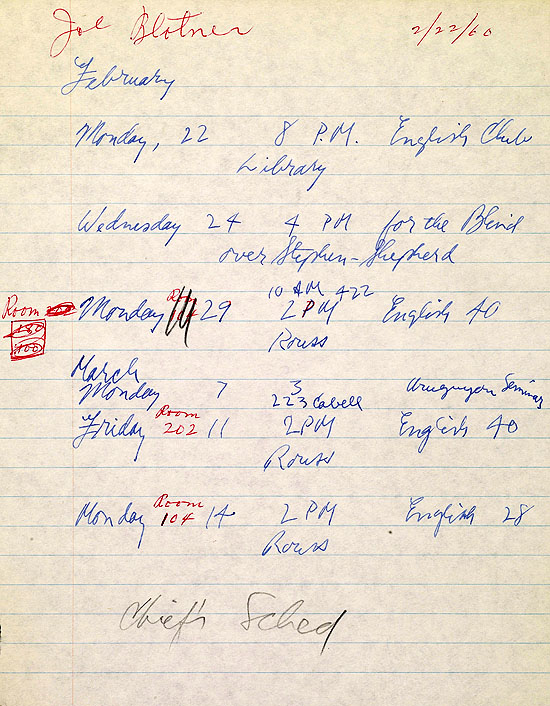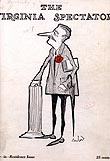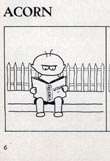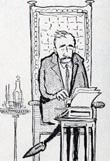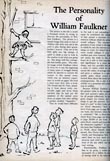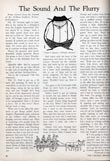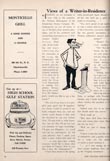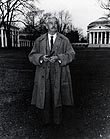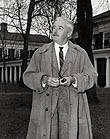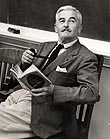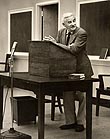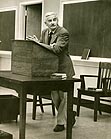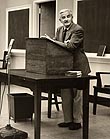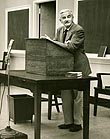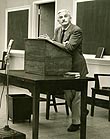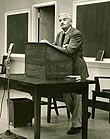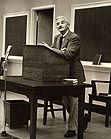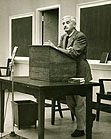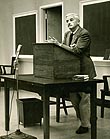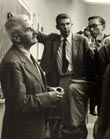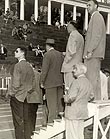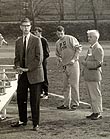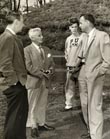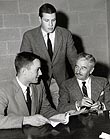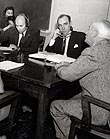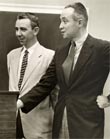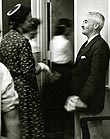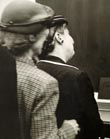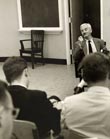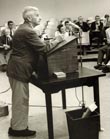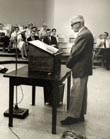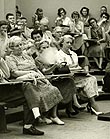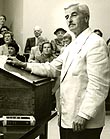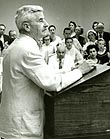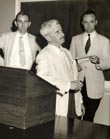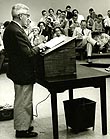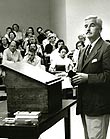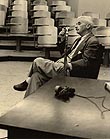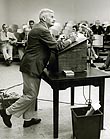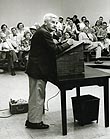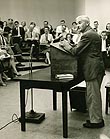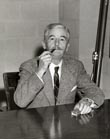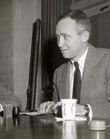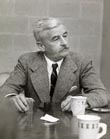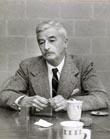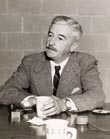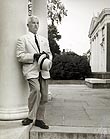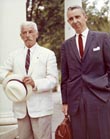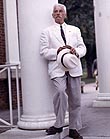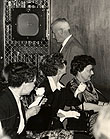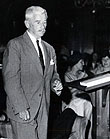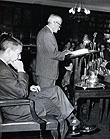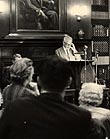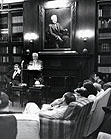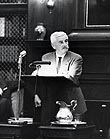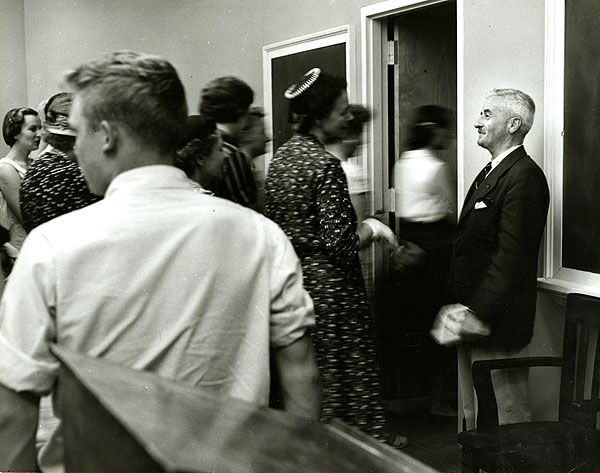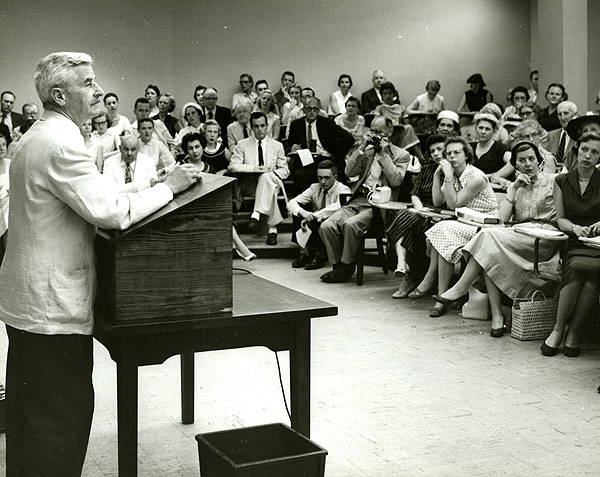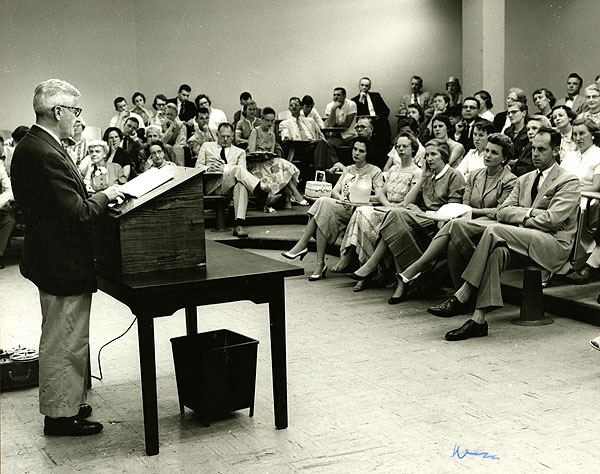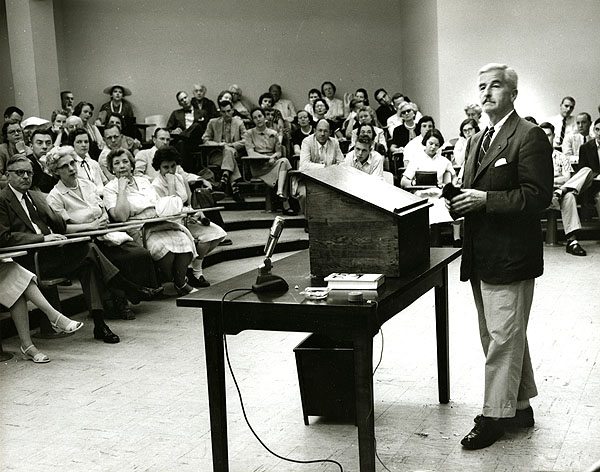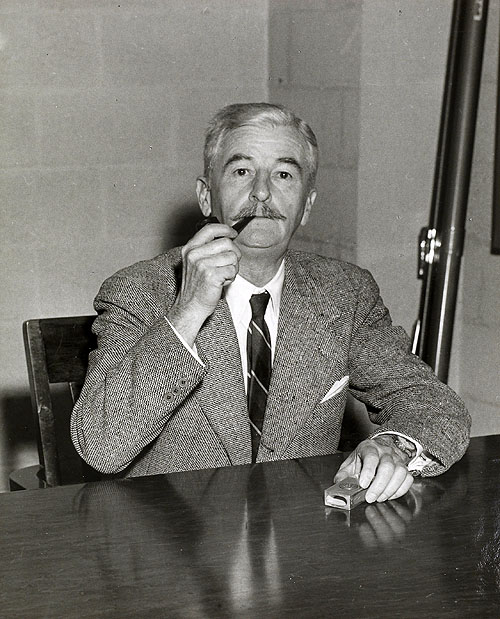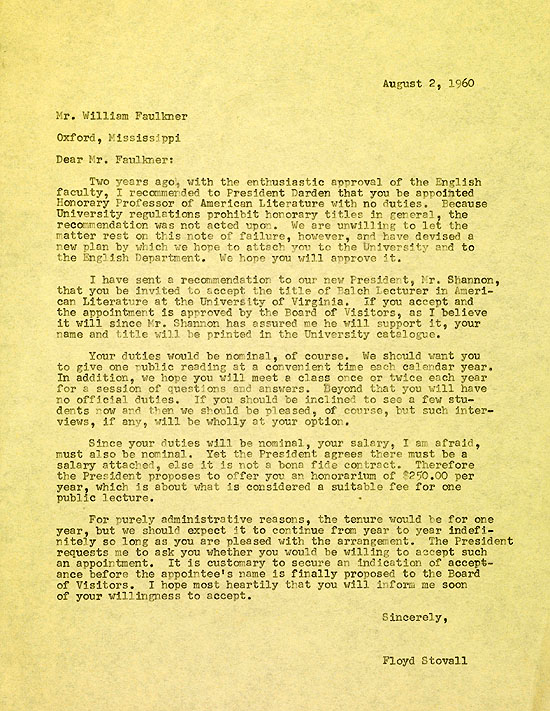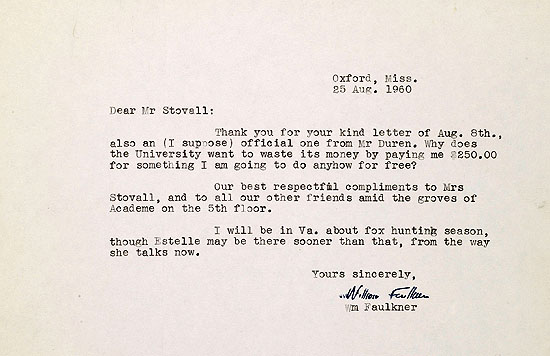Introduction and Contexts
- Faulkner At Virginia: Introduction
- Faulkner in the Late 1950s
- The US in the Late 1950s
- Virginia in the Late 1950s
Faulkner at Virginia: An Introduction
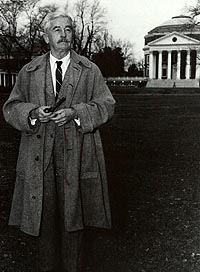 In December, 1957, getting ready to begin his second Spring semester at the University of Virginia, Faulkner joked in a letter that he was "just the writer-in-residence, not the speaker-in-residence."
He certainly wrote while he was here, including much of The Mansion, but did more than enough speaking to earn that
second title. Between February and June, 1957, and February and May, 1958, at thirty-six different public events, he gave two
addresses, read a dozen times from eight of his works, and answered over 1400 questions from audiences made up of various groups,
ranging from UVA students and faculty to interested local citizens. Most of those sessions were recorded on the advanced
technology of that time – the reel-to-reel tape recorder. In this archive you can hear 1690 minutes (over 28 hours) of
those recordings.
In December, 1957, getting ready to begin his second Spring semester at the University of Virginia, Faulkner joked in a letter that he was "just the writer-in-residence, not the speaker-in-residence."
He certainly wrote while he was here, including much of The Mansion, but did more than enough speaking to earn that
second title. Between February and June, 1957, and February and May, 1958, at thirty-six different public events, he gave two
addresses, read a dozen times from eight of his works, and answered over 1400 questions from audiences made up of various groups,
ranging from UVA students and faculty to interested local citizens. Most of those sessions were recorded on the advanced
technology of that time – the reel-to-reel tape recorder. In this archive you can hear 1690 minutes (over 28 hours) of
those recordings.
The Writer in Residence
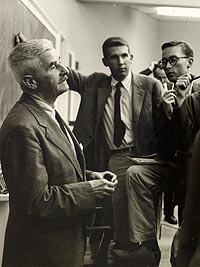 There’s no need for me to say much about Faulkner's tenure as the first Balch Writer-in-Residence. As you scroll
down this page, you’ll find several ways to explore it for yourself. Chronologically, these begin with 31 articles
reprinted from the UVA and Charlottesville newspapers from October 1956, when his appointment was announced, through the end of
the Spring term, 1958. On 6 July 1962, the day Faulkner died, the English department held a press conference at which, even as his
loss was mourned, his earlier presence on the Grounds (as UVA calls its campus) was remembered and discussed; you can listen to
those comments. In 2001 Joseph Blotner, who along with Frederick Gwynn was largely responsible for inviting the novelist here and
his almost constant companion during his public appearances, wrote a rich account of that experience that you can read. Blotner's
essay on “Mr. Faulkner” is followed by the recollections of eleven people who were UVA students or teachers during the period
of Faulkner's residency. You can even listen to what Faulkner himself told audiences about the experience at the end of both his
first term
There’s no need for me to say much about Faulkner's tenure as the first Balch Writer-in-Residence. As you scroll
down this page, you’ll find several ways to explore it for yourself. Chronologically, these begin with 31 articles
reprinted from the UVA and Charlottesville newspapers from October 1956, when his appointment was announced, through the end of
the Spring term, 1958. On 6 July 1962, the day Faulkner died, the English department held a press conference at which, even as his
loss was mourned, his earlier presence on the Grounds (as UVA calls its campus) was remembered and discussed; you can listen to
those comments. In 2001 Joseph Blotner, who along with Frederick Gwynn was largely responsible for inviting the novelist here and
his almost constant companion during his public appearances, wrote a rich account of that experience that you can read. Blotner's
essay on “Mr. Faulkner” is followed by the recollections of eleven people who were UVA students or teachers during the period
of Faulkner's residency. You can even listen to what Faulkner himself told audiences about the experience at the end of both his
first term
 and his second one
and his second one
 . These accounts don’t always agree – but readers of Faulkner are used to that.
. These accounts don’t always agree – but readers of Faulkner are used to that.
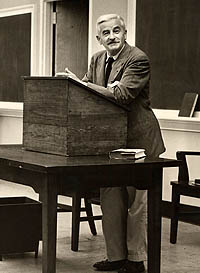 At the same time, it's important to point out that what Faulkner says on these tapes doesn't always agree with what he said
in the past – or with what biographers and scholars have learned about the facts of his life and career. One way to
think about what you'll hear is as Faulkner performing Faulkner, presenting the version of himself and his work that he
may already, at age sixty, have been thinking of as a legacy. As he himself notes almost a dozen different ways on these tapes,
writers are “congenital liars”
At the same time, it's important to point out that what Faulkner says on these tapes doesn't always agree with what he said
in the past – or with what biographers and scholars have learned about the facts of his life and career. One way to
think about what you'll hear is as Faulkner performing Faulkner, presenting the version of himself and his work that he
may already, at age sixty, have been thinking of as a legacy. As he himself notes almost a dozen different ways on these tapes,
writers are “congenital liars”
 . After listening several times to the recordings, however, I'd also say that there is nothing insincere about his desire at
this point in his career to reach the people in his audiences. Throughout his time at UVA, he was extremely generous in meeting
the demands of his occasions as Writer-in-Residence. He invites audiences to ask him any kind of question
. After listening several times to the recordings, however, I'd also say that there is nothing insincere about his desire at
this point in his career to reach the people in his audiences. Throughout his time at UVA, he was extremely generous in meeting
the demands of his occasions as Writer-in-Residence. He invites audiences to ask him any kind of question
 . He was often asked about the same thing more than once; you’ll hear, for example, how formulaic are the responses
he worked out to questions about “how he became a writer” or “how he came to write
Sanctuary,” but to me even at those moments Faulkner seems anxious to connect with his listeners. He is even
more frequently asked questions he doesn’t want to answer, about for example exactly what he meant by a certain symbol
in a particular story
. He was often asked about the same thing more than once; you’ll hear, for example, how formulaic are the responses
he worked out to questions about “how he became a writer” or “how he came to write
Sanctuary,” but to me even at those moments Faulkner seems anxious to connect with his listeners. He is even
more frequently asked questions he doesn’t want to answer, about for example exactly what he meant by a certain symbol
in a particular story
 . To such kinds of questions his answers are often evasive as well as formulaic, but they are never impatient. As a novelist
he often makes great demands on his reader. On these tapes, however, you won’t hear a High Modernist cloaking himself in
“silence, exile and cunning,”
*
but a serious artist trying to make himself and his work as approachable as possible.
. To such kinds of questions his answers are often evasive as well as formulaic, but they are never impatient. As a novelist
he often makes great demands on his reader. On these tapes, however, you won’t hear a High Modernist cloaking himself in
“silence, exile and cunning,”
*
but a serious artist trying to make himself and his work as approachable as possible.
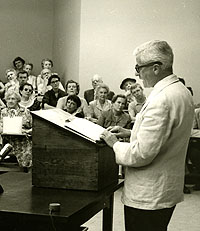 Although he liked to say that the only books an author never needs to look at again are the ones he wrote himself
Although he liked to say that the only books an author never needs to look at again are the ones he wrote himself
 , he decided to re-read Absalom, Absalom! before beginning his second term as Writer-in-Residence, so that he could
answer questions about that book more helpfully.
*
While he apologizes – rightly, listeners are likely to feel – for his shortcomings as a reader of his own
work, when he visited classrooms he was clearly willing to read whatever fitted the pedagogic needs of a particular instructor. As
for the texts he himself chose to read, he shows a decided preference for “Faulkner lite,” for humorous rather
than serious selections. But he was not afraid to challenge his UVA audience, as became clear when he decided to commence his
second Spring semester in “Residence” by delivering “A Word to Virginians,” a nine-minute
speech urging them to help solve rather than exacerbate the growing crisis over court-ordered integration in the Jim Crow South.
To 21st century listeners, his exhortations may sound more like temporizings, but at the time they were controversial, and to some
in his immediate audience, as you can hear for yourself, unacceptable. (The Virginia Faulkner was addressing had already decided on a strategy
of “Massive Resistance” to court-ordered integration, which resulted, later in 1958, in two Charlottesville public schools being closed for five
months to prevent twelve black students from entering them.)
, he decided to re-read Absalom, Absalom! before beginning his second term as Writer-in-Residence, so that he could
answer questions about that book more helpfully.
*
While he apologizes – rightly, listeners are likely to feel – for his shortcomings as a reader of his own
work, when he visited classrooms he was clearly willing to read whatever fitted the pedagogic needs of a particular instructor. As
for the texts he himself chose to read, he shows a decided preference for “Faulkner lite,” for humorous rather
than serious selections. But he was not afraid to challenge his UVA audience, as became clear when he decided to commence his
second Spring semester in “Residence” by delivering “A Word to Virginians,” a nine-minute
speech urging them to help solve rather than exacerbate the growing crisis over court-ordered integration in the Jim Crow South.
To 21st century listeners, his exhortations may sound more like temporizings, but at the time they were controversial, and to some
in his immediate audience, as you can hear for yourself, unacceptable. (The Virginia Faulkner was addressing had already decided on a strategy
of “Massive Resistance” to court-ordered integration, which resulted, later in 1958, in two Charlottesville public schools being closed for five
months to prevent twelve black students from entering them.)
The Recordings
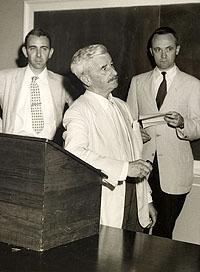 We owe the existence of these tapes to Frederick Gwynn and Joseph Blotner, the members of UVA's English department who were
most involved with Faulkner's residency. It was their idea to record the sessions, and after getting the author’s
consent, it was almost always one or the other of them who ran the tape recorder they carried around to the events. You'll hear
their voices often on the tapes; whenever the students in the room seem to have run out of questions, for instance, one of them
will usually break the silence by asking “Mr. Faulkner” about one of his works. In 1959 they published
Faulkner in the University, edited transcriptions of 36 “class conferences,” as they called the
meetings Faulkner held with various audiences. There are major differences between their book and this archive. Three of the
book’s “conferences” aren’t here. One of these, a classroom session on 20 February 1957,
was not recorded; the brief transcript of it that they print was, they say, “reconstructed from memory.”
According to their Introduction, the tape of another classroom session, on 6 May 1957, was lost after being transcribed. The tape
(or tapes) of Faulkner’s press conference on the first day of his residency, 15 February 1957, is simply missing from
the set of tapes in UVA’s Special Collections, as is the first tape of his 16 May 1957 session with the audience
identified as “Law School Wives”; for Faulkner's remarks on these occasions, users must turn to Faulkner
in the University.
*
Unfortunately these missing tapes contained a lot that I wish we could hear, including much of what Faulkner told UVA
audiences about As I Lay Dying. (As I Lay Dying was also scheduled to be the focus of a 19 May 1957 class
session announced in UVA student newspaper, The Cavalier Daily, but no tapes
of this exist, nor do Gwynn and Blotner mention it, so this session may never have happened.)
We owe the existence of these tapes to Frederick Gwynn and Joseph Blotner, the members of UVA's English department who were
most involved with Faulkner's residency. It was their idea to record the sessions, and after getting the author’s
consent, it was almost always one or the other of them who ran the tape recorder they carried around to the events. You'll hear
their voices often on the tapes; whenever the students in the room seem to have run out of questions, for instance, one of them
will usually break the silence by asking “Mr. Faulkner” about one of his works. In 1959 they published
Faulkner in the University, edited transcriptions of 36 “class conferences,” as they called the
meetings Faulkner held with various audiences. There are major differences between their book and this archive. Three of the
book’s “conferences” aren’t here. One of these, a classroom session on 20 February 1957,
was not recorded; the brief transcript of it that they print was, they say, “reconstructed from memory.”
According to their Introduction, the tape of another classroom session, on 6 May 1957, was lost after being transcribed. The tape
(or tapes) of Faulkner’s press conference on the first day of his residency, 15 February 1957, is simply missing from
the set of tapes in UVA’s Special Collections, as is the first tape of his 16 May 1957 session with the audience
identified as “Law School Wives”; for Faulkner's remarks on these occasions, users must turn to Faulkner
in the University.
*
Unfortunately these missing tapes contained a lot that I wish we could hear, including much of what Faulkner told UVA
audiences about As I Lay Dying. (As I Lay Dying was also scheduled to be the focus of a 19 May 1957 class
session announced in UVA student newspaper, The Cavalier Daily, but no tapes
of this exist, nor do Gwynn and Blotner mention it, so this session may never have happened.)
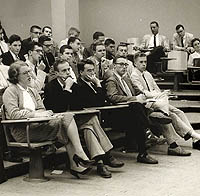 On the other hand, this archive's complete recordings of the other 32½ sessions contain almost 700 questions and
answers that weren’t published in Faulkner in the University. In general, the choices Gwynn and Blotner made
about what to print hold up well; users familiar with their book probably won’t find many revealing new ideas among the
passages that are being published here for the first time – though Faulkner's thoughts on his works, on writing and
other writers, or on social issues gain new meanings when they are re-connected with the way he spoke them
On the other hand, this archive's complete recordings of the other 32½ sessions contain almost 700 questions and
answers that weren’t published in Faulkner in the University. In general, the choices Gwynn and Blotner made
about what to print hold up well; users familiar with their book probably won’t find many revealing new ideas among the
passages that are being published here for the first time – though Faulkner's thoughts on his works, on writing and
other writers, or on social issues gain new meanings when they are re-connected with the way he spoke them
 . In others ways, too, being able to overhear the sessions enriches the story they tell. For example, Faulkner in the
University makes no attempt to represent the reactions of Faulkner's audiences, although those often provide us with
illuminating modes of access to the cultural moment. On 15 May 1958, for instance, Faulkner traveled to Lexington, Virginia, to
meet an audience at Washington & Lee University. Half an hour into the session, a man asks him for his “views of
the Supreme Court decision.” At that point in time, it was not necessary to say which decision was meant
– Brown v Board of Education had been decided four years earlier, and the implementation of its mandate to
abolish segregated schools had created a crisis in southern culture. In the groan of the white people in the room, in their
nervous laughter as Faulkner seems initially to deflect the question, and then in the silence that greets his longer answer, I
think we have audible proof of how tense the moment was
. In others ways, too, being able to overhear the sessions enriches the story they tell. For example, Faulkner in the
University makes no attempt to represent the reactions of Faulkner's audiences, although those often provide us with
illuminating modes of access to the cultural moment. On 15 May 1958, for instance, Faulkner traveled to Lexington, Virginia, to
meet an audience at Washington & Lee University. Half an hour into the session, a man asks him for his “views of
the Supreme Court decision.” At that point in time, it was not necessary to say which decision was meant
– Brown v Board of Education had been decided four years earlier, and the implementation of its mandate to
abolish segregated schools had created a crisis in southern culture. In the groan of the white people in the room, in their
nervous laughter as Faulkner seems initially to deflect the question, and then in the silence that greets his longer answer, I
think we have audible proof of how tense the moment was
 . I also enjoy hearing the response of the freshmen (“First-Year men,” in UVA parlance) in Irby
Cauthen’s class to Faulkner’s answer to a question from Gwynn about Drusilla, the young woman in The
Unvanquished who, after her father and brothers have been killed fighting for the Confederacy, cuts her hair, puts on a
uniform, arms herself and rides off with Col. Sartoris’ unit “astride” a horse (rather than sitting
side saddle) to “kill Yankees.” The laughter of the young men at an all-male college that seems likely to be
increasingly faced with pressure to admit women (the other form of “integration” in the air of the time)
sounds awfully relieved
. I also enjoy hearing the response of the freshmen (“First-Year men,” in UVA parlance) in Irby
Cauthen’s class to Faulkner’s answer to a question from Gwynn about Drusilla, the young woman in The
Unvanquished who, after her father and brothers have been killed fighting for the Confederacy, cuts her hair, puts on a
uniform, arms herself and rides off with Col. Sartoris’ unit “astride” a horse (rather than sitting
side saddle) to “kill Yankees.” The laughter of the young men at an all-male college that seems likely to be
increasingly faced with pressure to admit women (the other form of “integration” in the air of the time)
sounds awfully relieved
 .
.
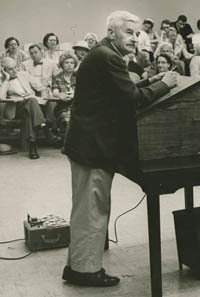 The quality of the audio you'll hear at this archive is uneven, for a number of reasons. By our standards, the equipment used
was fairly primitive, and being run by academics, not technicians; background noises on some of the tapes are forms of static from
the recorder itself. Only one microphone was used, and because Faulkner was so soft-spoken, it had to be placed immediately in
front of him, which means questions and comments from others in the room are often difficult to hear, and frequently inaudible.
And the tapes themselves, nearly 40,000 feet of fragile plastic strips, had held onto the magnetic records of voices and coughs,
laughter and applause for almost half a century before the Library began to digitize them, further degrading their fidelity to
those moments in 1957 and 1958. One tape, from a class session on 9 March 1957, is so difficult to listen to that we decided not
to transcribe the first 28 minutes of it, containing Faulkner's reading of “Was” (though you can hear it if
you choose the “Play Entire Recording” option for that session, or you can hear him reading
“Was” much more clearly on 8 May 1957). On the transcripts, whenever we weren’t certain of a
reading, we put brackets around the [word] or [group of words]. Words or phrases we couldn’t make out at all are
indicated with ellipses, like this: [...]. Sometimes an entire question is inaudible, but usually one can get the gist of it from
Faulkner’s answer; he is almost always responsive to the specific question being asked. (And if you hear something we
couldn’t, please let us know; an electronic publication can be amended as often as needed.)
The quality of the audio you'll hear at this archive is uneven, for a number of reasons. By our standards, the equipment used
was fairly primitive, and being run by academics, not technicians; background noises on some of the tapes are forms of static from
the recorder itself. Only one microphone was used, and because Faulkner was so soft-spoken, it had to be placed immediately in
front of him, which means questions and comments from others in the room are often difficult to hear, and frequently inaudible.
And the tapes themselves, nearly 40,000 feet of fragile plastic strips, had held onto the magnetic records of voices and coughs,
laughter and applause for almost half a century before the Library began to digitize them, further degrading their fidelity to
those moments in 1957 and 1958. One tape, from a class session on 9 March 1957, is so difficult to listen to that we decided not
to transcribe the first 28 minutes of it, containing Faulkner's reading of “Was” (though you can hear it if
you choose the “Play Entire Recording” option for that session, or you can hear him reading
“Was” much more clearly on 8 May 1957). On the transcripts, whenever we weren’t certain of a
reading, we put brackets around the [word] or [group of words]. Words or phrases we couldn’t make out at all are
indicated with ellipses, like this: [...]. Sometimes an entire question is inaudible, but usually one can get the gist of it from
Faulkner’s answer; he is almost always responsive to the specific question being asked. (And if you hear something we
couldn’t, please let us know; an electronic publication can be amended as often as needed.)
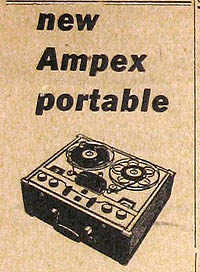 Transcribing speech into text involves other editorial decisions. We don't try to reproduce all the sounds on the tapes. Since
making these recordings usable was one of our major goals, we chose to omit anything that simply sounded like a form of hesitancy
– er, uh, &c., but do try to include all the words that are spoken. When Faulkner is reading one of his texts,
we follow his voice for the words, but the punctuation in the readings (which are displayed in dark red
type) is derived from the first book edition of each story. Punctuation in the transcribed questions and answers is
based on what we hear, subject to the larger desire to make the transcripts both accurate and readable. Pauses are not marked, no
matter how long they are. Unless you listen to an entire recording, you won’t hear most of the pauses between exchanges,
and you should use the “Play Entire Recording” button at least once, to get a sense of how frequently silence
fell over the room, and how comfortable Faulkner was about waiting those silences out.
Transcribing speech into text involves other editorial decisions. We don't try to reproduce all the sounds on the tapes. Since
making these recordings usable was one of our major goals, we chose to omit anything that simply sounded like a form of hesitancy
– er, uh, &c., but do try to include all the words that are spoken. When Faulkner is reading one of his texts,
we follow his voice for the words, but the punctuation in the readings (which are displayed in dark red
type) is derived from the first book edition of each story. Punctuation in the transcribed questions and answers is
based on what we hear, subject to the larger desire to make the transcripts both accurate and readable. Pauses are not marked, no
matter how long they are. Unless you listen to an entire recording, you won’t hear most of the pauses between exchanges,
and you should use the “Play Entire Recording” button at least once, to get a sense of how frequently silence
fell over the room, and how comfortable Faulkner was about waiting those silences out.
There are two additional transcription conventions I should explain. Following standard modern publishing practice, we decided not
to capitalize the words “northern” or “northerner,” “southern” or
“southerner.” But it seemed true to both the spirit of that time and the way the words are actually deployed
by the people who use them on these tapes to transcribe “north” as “North” and
“south” as “South.” That choice seems unproblematic, though I think it’s important to note that when the people on these tapes talk
about “the South,” they seem invariably to mean just white southerners. That brings me to the other
choice we had to make, about an issue that is (rightly) much more troubling for us than for most Americans fifty years ago. You
will hear Faulkner say the word “nigger” on a few of these tapes. When he reads “Was,” the
word is spoken by characters in the story, but on at least three occasions Faulkner uses the word speaking as himself. To me, this
word is more obscene than whatever profanity the convict uses at the end of “Old Man” and that Faulkner chose
neither to print nor, when he read that line to a freshman class, to speak
 . When Gwynn and Blotner published Faulkner's remarks for the larger national and international audience they knew their book
would reach, they silently replaced the word with “Negro.”
*
But Faulkner's use of it is a part of the complex story these tapes tell, about him and about this time and place. He and his
all-white audiences talk a lot about African Americans, though of course they never use that term. Sometimes they use
“colored,” but the term they use most often is “Negro.” At least, that’s the way
I’ve chosen to transcribe the word they use. In most cases not capitalizing the term would probably capture the
way it’s being said (and defined) more accurately. (The Cavalier Daily, for instance, typically prints
“negro” throughout these years.) And in the southern accents on these tapes, especially Faulkner’s,
the word sometimes sounds so much like “nigger” that “Negro” seems euphemistic. You can
hear both “nigger” and “Negro” in Faulkner's reply to another student in Prof.
Cauthen’s class on The Unvanquished, and this one passage can help us appreciate both the phonetic and the
ideological complexity of his racial vocabulary. As he elaborates the answer he pronounces the words in several different ways,
and goes on to remind his listeners that Ringo, the black boy being discussed, is smarter and more resourceful than Bayard, the
white boy
. When Gwynn and Blotner published Faulkner's remarks for the larger national and international audience they knew their book
would reach, they silently replaced the word with “Negro.”
*
But Faulkner's use of it is a part of the complex story these tapes tell, about him and about this time and place. He and his
all-white audiences talk a lot about African Americans, though of course they never use that term. Sometimes they use
“colored,” but the term they use most often is “Negro.” At least, that’s the way
I’ve chosen to transcribe the word they use. In most cases not capitalizing the term would probably capture the
way it’s being said (and defined) more accurately. (The Cavalier Daily, for instance, typically prints
“negro” throughout these years.) And in the southern accents on these tapes, especially Faulkner’s,
the word sometimes sounds so much like “nigger” that “Negro” seems euphemistic. You can
hear both “nigger” and “Negro” in Faulkner's reply to another student in Prof.
Cauthen’s class on The Unvanquished, and this one passage can help us appreciate both the phonetic and the
ideological complexity of his racial vocabulary. As he elaborates the answer he pronounces the words in several different ways,
and goes on to remind his listeners that Ringo, the black boy being discussed, is smarter and more resourceful than Bayard, the
white boy
 . Unless there's no doubt in my mind about the term Faulkner uses, I’ve chosen to compromise (or maybe to engage in
evasion myself) and represent the sound of the word as “Negro.” Because this is an audio archive, you can
listen for yourself, and make up your own mind about how the African Americans in Faulkner's fiction and in
“southern” fact are referred to and, more importantly, represented.
. Unless there's no doubt in my mind about the term Faulkner uses, I’ve chosen to compromise (or maybe to engage in
evasion myself) and represent the sound of the word as “Negro.” Because this is an audio archive, you can
listen for yourself, and make up your own mind about how the African Americans in Faulkner's fiction and in
“southern” fact are referred to and, more importantly, represented.
Contexts
Below you’ll find the recording, essays and articles on Faulkner’s residency mentioned at the start of
this introduction, as well as images and other items that we hope will help you appreciate the environment in which the recordings
were made. These ancillary materials will also explain some of the specific issues that arise on the tapes. At his press
conference on 20 May 1957, for instance, Faulkner mentions "the unhappy business of the invitations" as an example of Virginia's
failure to live up to its role as the leader among the southern states
 . (This clip also contains an instance of the silences noted earlier.) The Cavalier Daily ran an editorial on that event about a month earlier. You’ll find that article and additional similar
materials in the other three pages in this CONTEXTS section – on Faulkner, the U.S. and UVA in the late
1950’s. Links to those pages are at the top of this page.
. (This clip also contains an instance of the silences noted earlier.) The Cavalier Daily ran an editorial on that event about a month earlier. You’ll find that article and additional similar
materials in the other three pages in this CONTEXTS section – on Faulkner, the U.S. and UVA in the late
1950’s. Links to those pages are at the top of this page.
Recording of 1962 UVA Press Conference on Faulkner's Tenure
Essays on Faulkner and UVA
- Mr. Faulkner: Writer-In-Residence, by Joseph Blotner
- The Grounds and the Fury, by Ken Ringle (UVA ’61)
- Faulkner and an Undergraduate, by John A. Church (UVA ’59)
- Faulkner and UVA, by Gerald L. Cooper (College ’58, M.Ed. Guidance ’69))
- Learning Faulkner, by Ann Thomas Moore (M.A. English ’58))
- Memories of William Faulkner, by James W. Haskins (College ’63, Law ’66)
- Memories of “Bill” Faulkner with the IMP Society, by Jack Docherty (College ’61)
- Encountering Mr. Faulkner, by Joe Carroll (College ’61)
- Memory of William Faulkner, by Lloyd T. Smith, Jr. (College ’55, Law ’60)
- My Time with William Faulkner, by William Lecky (Architecture ’60)
- The Gentleman Hitch-Hiker, by By R. C. Greene (College ’61)
- Mr. Faulkner in My Classroom, by Robert Scholes
The “Writer-in-Residence Issue” of Virginia Spectator (April 1957):
Images from the “Writer-in-Residence Issue” —
Articles from the “Writer-in-Residence Issue” —
- Thorn for Edward
- The Personality of William Faulkner
- The Sound and the Flurry
- Views of a Writer-in-Residence
Images from the Faulkner Print Collection —
Cavalier Daily Articles on Faulkner —
- William Faulkner Accepts Invitation As First Of Writers-In-Residence (6 October 1956)
- Faulkner at the University (6 October 1956)
- Faulkner Arrives To Assume Role As Writer-in-Residence (13 February 1957)
- Faulkner Begins Stay As Writer-In-Residence (16 February 1957)
- Faulkner: First Impressions (16 February 1957)
- Faulkner Holds Public, Press Conferences (8 May 1957)
- "Jim Crow" Spectator (10 May 1957)
- From Jefferson Hall (17 May 1957)
- Faulkner Makes Public Interviews (22 May 1957)
- Writer-In-Residence Faulkner To Return Next Spring (25 October 1957)
- Faulkner Will Return in February (18 December 1957)
- Mississippi Writer Here Until June; Second Visit (4 February 1958)
- William Faulkner To Talk On Segregation Problem (19 February 1958)
- Mr. Faulkner On Segregation (25 February 1958)
- Film of Faulkner Book Opens New York Run (14 March 1958)
- Faulkner To Appear On Television In Filmed Class Discussion Sunday (15 March 1958)
- English Depart. Announces Faulkner Schedule (29 March 1958)
- Faulkner Arranges Final Appearance Before Public Friday In Rouss Hall (21 May 1958)
Charlottesville Daily Progress Articles on Faulkner —
- Mrs. Darden Will Receive Callers Tomorrow Afternoon at 'Carr's Hill' (31 January 1955)
- Faulkner Talks To Reporters About Integration, Virginians (15 February 1957)
- [Faulkner Photo] (16 February 1957)
- Faulkner Flying To Greece To See 'Requiem For A Nun' (16 March 1957)
- Faulkner Plans Reading Of His Work Before Public (8 May 1957)
- Hard, Fast Rule For Writers: Truthfulness, William Faulkner Tells High School Students (8 May 1957)
- Faulkner Declares Virginia Should Cherish Leadership (11 May 1957)
- Yoknapatawpha And Albemarle (25 May 1957)
- Faulkner Invited To Return To UVa (30 May 1957)
- Faulkner Reads From Novel, Describes Probable Sequel (31 May 1957)
- Faulkner to Return to UVa (24 October 1957)
- Faulkner is Back Again For Second Term at UVa (15 February 1958)
- Faulkner To Discuss Segregation (20 February 1958)
- Faulkner Plans Final Talk Friday (21 May 1958)
- Faulkner Would Like to Live Final Years in Albemarle (24 May 1958)
- Faulkner Plans to Spend Winter Here (13 November 1958)
- Mr. Faulkner In the Library (15 January 1959)
- William Faulkner To Leave in April (16 March 1959)
Selected Items from the UVA Faulkner Collections —
- Letter from Faulkner accepting his invitation to the Southern Writers Conference (24 September 1931)
- Unsigned notes about Faulkner's behavior at the Southern Writers Conference (undated)
- Letter from Faulkner ratifying his first appointment as Writer-in-Residence (18 October 1956)
- Letter from Annie Churchill Berkeley asking Faulkner why he called all Virginians "snobs" (25 February 1957)
- Letter from Faulkner to Mrs. Berkeley, explaining his remark (27 February 1957 )
- Letter from Annie Churchill Berkeley to Faulkner (c. March 1957)
- Letter from Faulkner to Harold Howland proposing a prize for manuscripts smuggled through the iron curtain (c. 9 May 1957)
- Letter from Faulkner accepting invitation to address the UVA Club in Washington (1 December 1957)
- Letter to Faulkner, withdrawing the invitation to address the UVA Club of Washington (8 January 1958)
- Letter from Faulkner to John Cook Wylie, UVA Librarian, accepting appointment as a consultant to the Library (6 May 1958)
- Letter from Faulkner to Edward McAleer, accepting a membership in UVA's Colonnade Club (25 March 1958)
- Letter from Faulkner to John Cook Wylie, accepting offer of a study in Library (10 September 1958)
- Letter from Clarice Snead to Faulkner about his Library study, with his response (12 May 1959)
- Joseph Blotner's chart of Faulkner's UVA speaking engagements, February-March 1960 (22 February 1960)
- Letter to Faulkner offering him an appointment as "Honorary Professor of American Literature." (2 August 1960)
- Letter from Faulkner about this appointment (25 August 1960)
Below: William Faulkner on the Lawn at the University of Virginia, 15 February 1957 – his first day as Writer-in-Residence. Photograph by Ralph Thompson. [Digitization #000004470_0002]
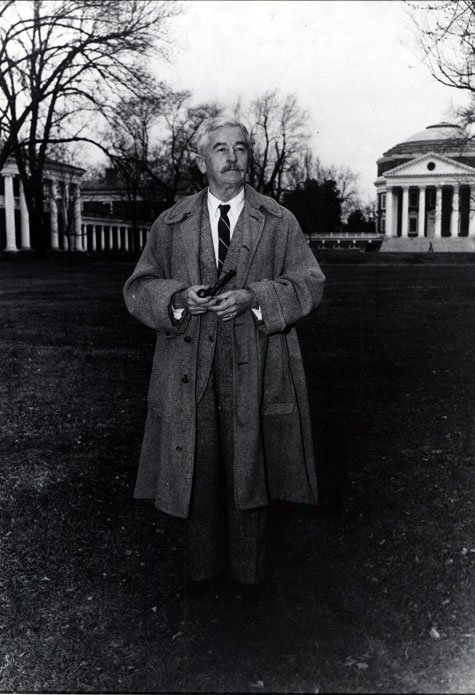
Below: 1 December 1957 letter from William Faulkner to Prof. A. B. Shepperson, replying to his invitation to address the University of Virginia Club in Washington, D.C. Faulkner Papers, UVA Special Collections [Digitization #000003743_0063].
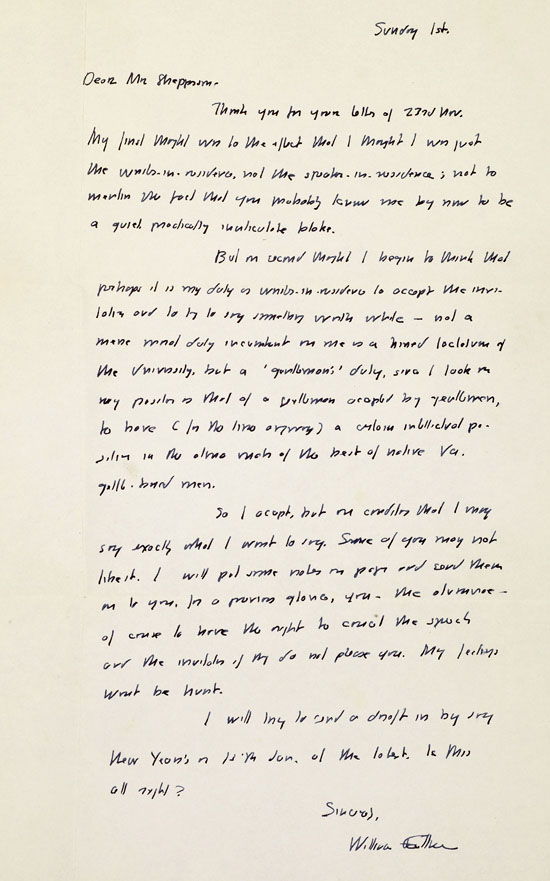
Transcription: Sunday 1st. Dear Mr. Shepperson – / Thank you for your letter of 23rd Nov. / My first thought was to the effect that I thought I was just / the writer-in-residence, not the speaker-in-residence; not to / mention the fact that you probably know me by now to be / a quiet, practically inarticulate bloke. / But on second thought I begin to think that / perhaps it is my duty as writer-in-residence to accept the invi- / tation and to try to say something worth while – not a / mere moral duty incumbent on me as a hired factotum of / the University, but a 'gentleman's' duty, since I look on / my position as that of a gentleman accepted by gentlemen, / to have (for the time anyway) a certain intellectual po- / sition in the alma mater of the best of native Va. / gentle-bred men. / So I accept, but on condition that I may / say exactly what I want to say. Some of you may not / like it. I will put some notes on paper and send them / on to you, for a previous glance, you – the alumnae – / of course to have the right to cancel the speech / and the invitation if they do not please you. My feelings / wont be hurt. / I will try to send a draft in by say / New Year's or 13th Jan. at the latest. Is this / all right? / Sincerely, William Faulkner
There's more to this story, though the details aren't known. Faulkner may have planned to talk about the Civil Rights movement, and resistance to it among white southerners, which was the subject of the speech he gave at his first appearance as Writer-in-Residence for 1958 – or the Club may have been afraid he was thinking of that, or some other controversial subject. In any case, 6 weeks later the Club's President wrote Faulkner to rescind the invitation, for reasons that seem specious, as you can see for yourself below. Faulkner Papers, UVA Special Collections [Digitization #000003743_0065].
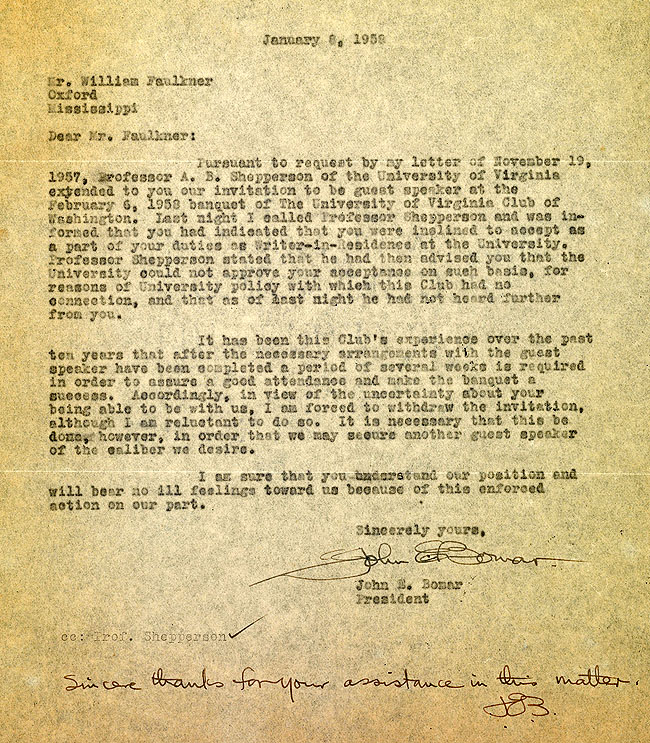
Below: Photo by Ralph Thompson of Faulkner in Cabell Hall with unidentified students (undated but c1957) [Print# 0189; Digitization# 000005733_0015].
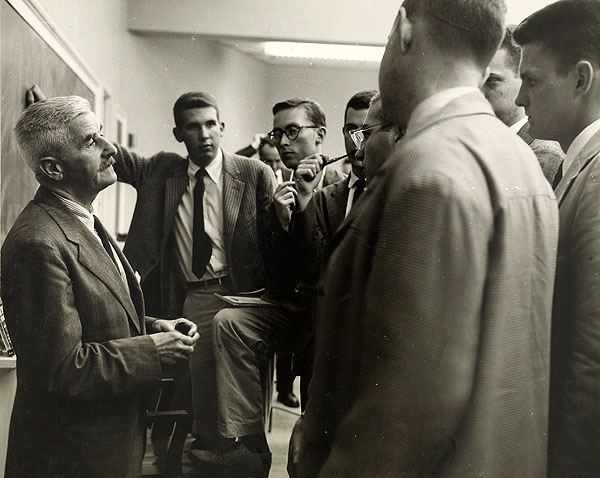
Below: William Faulkner in a Cabell Hall classroom at the University of Virginia, probably February 1957. Photograph by Ralph Thompson. [Digitization #000004470_0015]
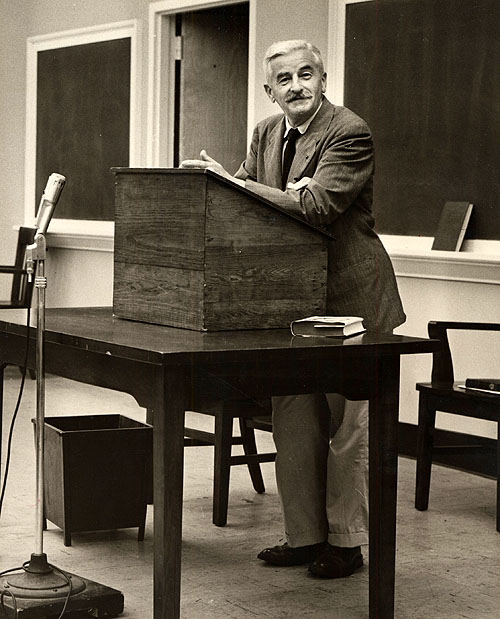
Below: Photo by Ralph Thompson of Faulkner in Rouss Hall [Print# 0218]. Note woman in front row with fan. Faulkner called this windowless classroom, where most of his UVA sessions took place, "the black hole of Calcutta" because it was so hot.
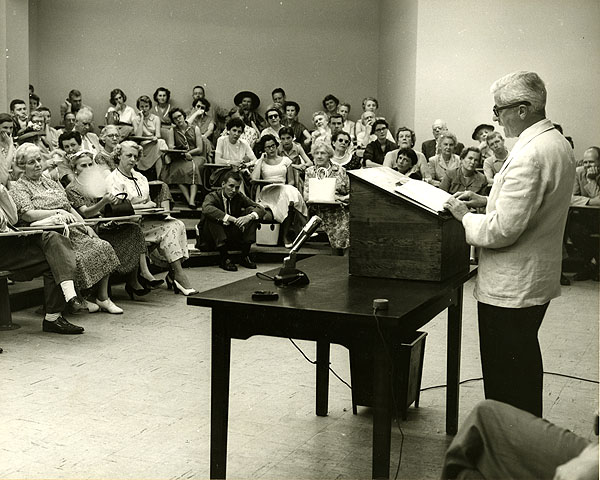
Below: Photo by Ralph Thompson of Faulkner in Rouss Hall with (left to right) Joseph Blotner, Frederick Gwynn, unidentified man. Caption on back: "May 15 [1957] after meeting with the public. Photo by Ralph Thompson." [Print# 0166; Digitization# 000005733_0009].
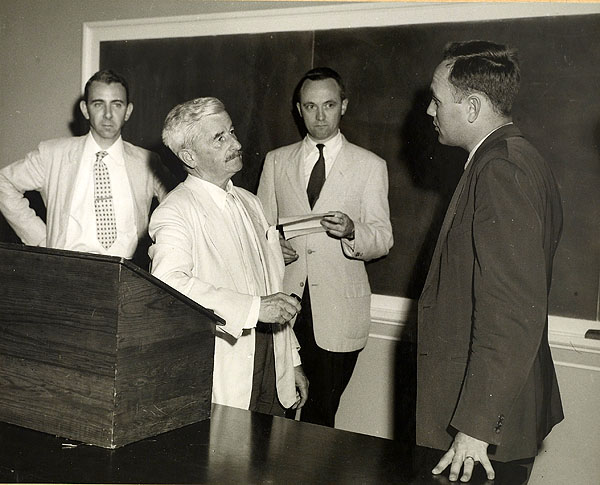
The Cavalier Daily 29 March 1958: 1
English Depart. Announces Faulkner Schedule
The English Department has announced the classroom schedule of writer-in-residence, William Faulkner, for the remainder of the semester.
The schedule is as follows: Thurs., 1 May, 10:00 a.m. in 337 Cabell Hall for Eng. 28, (McAleer), Subject – "Portable Faulkner"; Fri., 2 May, 4:00 p.m. in 202 Rouss Hall for Eng. 22, 28 (Blotner) and Eng 124, Subject – "The Sound and the Fury" and "As I Lay Dying".
Tues., 6 May in Radio Cabell Hall for Eng. 32: Language (Stephenson), Subject – Language and Dialect; Thurs., 8 May, 4:00 p.m. in 202 Rouss Hall for Eng. 3-4: Sophomore English (Murrah) and Eng. 124, Subject "The Bear" and "Absalom, Absalom!"
Mon., 12 May, 4:00 p.m. in 202 Rouss Hall for Virginia Colleges, Subject – Writing; Thurs., 15 May, 3:30 p.m. in Lee Chapel for Washington and Lee University, Subject – Writing.
Mon., 19 May, 4:00 p.m. in 202 Rouss Hall for Eng. 2 (Weston), Subject – "As I Lay Dying"; Fri., 23 May 4:00 p.m. in 202 Rouss for University and City public (Eng. Dept. Secretary), Subject – Writing.
Classes are open to all members of the University, with permission of the instructor.
©1958 The Cavalier Daily
Below: Photo by Ralph Thompson of Faulkner in Rouss Hall (undated but c1957). [Print# 0191; Digitization# 000005733_0017].
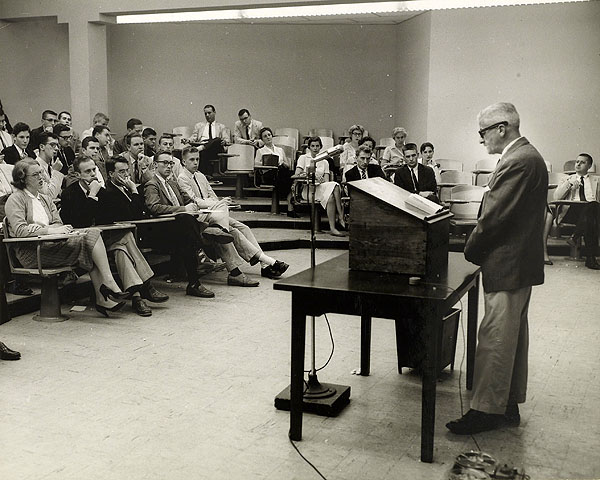
Below: William Faulkner with townspeople in 202 Rouss Hall, University of Virginia, Spring 1957. Photograph by Ralph Thompson. [Digitization #000004470_0028]
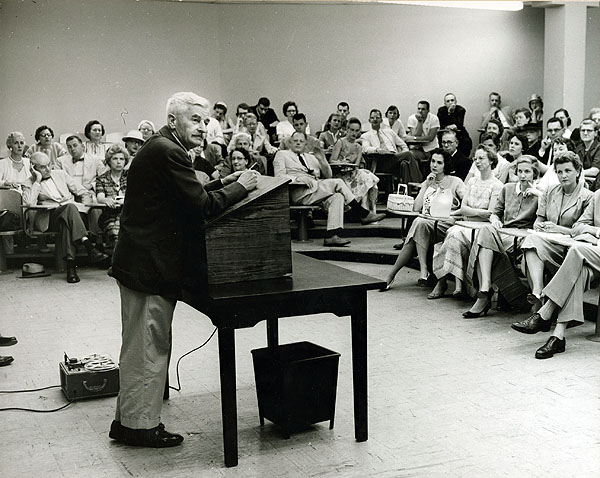
The Cavalier Daily 16 April 1957: 2
Mistaken Invitation And A Damaged Reputation
Virginia lost a genuine opportunity to create goodwill in the race issue last week when the State Chamber of Commerce withdrew two invitations accidentally extended to Negroes for a "Distinguished Virginians Dinner" in Richmond on May 17. The invitations were issued in the names of Frank A. Ernst, Chamber president, and Thomas B. Stanley, Governor of Virginia, through what was termed by Ernst a "clerical error."
Newsmen were able to obtain nothing more than a "no comment" from the Governor's office when they tried to get an official explanation. The Chamber of Commerce stated that personal letters had gone to both Negroes asking that they return the invitations. One of these persons has answered that he will attend the dinner unless Governor Stanley personally rescinds the offer.
If this "Distinguished Virginians" banquet is to be what the name implies, we can see no good reason why it should not include Virginians of both races. Certainly, once colored persons had actually been invited – through error or not – it was a mistake to retract their invitations. A far more sensible course would have been public welcome of the Negroes as proof that we respect distinguished Virginians regardless of race even though we are not ready to bring their race into the white schools of our educational system.
The date of the dinner, May 17, serves as an ominous reminder to us of the damage done to our State in the current racial crisis. It was on this date in 1954 that the U.S. Supreme Court handed down the original decision outlawing race segregation in public schools.
©1957 The Cavalier Daily
Mr. Faulkner: Writer-In-Residence
By Joseph Blotner
[This essay was first published in The Virginia Quarterly Review (Spring 2001), then as a chapter in Mr. Blotner’s autobiography, An Unexpected Life (Louisiana State University Press, 2005). It is reprinted here with the generous permission of the Blotner family and VQR.]
It was just as well, for Fred Gwynn and me and our hopes for the University of Virginia’s Writer-in-Residence Program in 1955, that our memories of Charlottesville did not stretch back more than a few years. Others recalled a signal event in its cultural life more than two decades before. Ellen Glasgow, Virginia novelist and literary grande dame, felt that Southern writers like herself living in New York were kept from seeing each other by their isolation and the bustle of metropolitan life. She proposed to UVa. English Department head James Southall Wilson a gathering of 20 or 30 leading writers in some pleasant place where they could talk with each other. The president of the university endorsed the idea, and the resulting committee invited 34, including Thomas Wolfe, James Branch Cabell, and William Faulkner. Against his inclination and better judgment, Faulkner made one of the number on Oct. 23, 1931, eagerly awaited because of the publicity that had greeted his sensational novel Sanctuary.
Genuinely shy, and convivial mainly with a few friends and then only intermittently, he attended just a few of the sessions. His old friend and sometime mentor, Sherwood Anderson, later wrote, “Bill Faulkner arrived and got drunk. From time to time he appeared, got drunk again immediately, & disappeared. He kept asking everyone for drinks. If they didn’t give him any, he drank his own.” By the time for departure, Faulkner was glad to accept dramatist Paul Green’s offer of a ride to New York. This was the beginning of a journey by car and coastal steamer that would add to the lore of Faulkner’s drinking exploits before his circuitous return to Mississippi. Memories of these events were still green in Charlottesville in 1955. One of the journalists who wrote at length about the Southern Writers’ Conference was Emily Clark, and now it was her bequest that would be the linchpin for the return of its most spectacular participant.
Fred and I wrote to more than a dozen prominent writers, but we had very little money to offer, and some, such as Edmund Wilson and J.D. Salinger, said that they did not do that sort of thing. Some were doing it elsewhere. Others did not reply. When a friend of the English Department mentioned the plan to Jill Faulkner Summers, she said, “I think Pappy might be interested in that.” When Fred wrote to him in April of 1955, he indicated his interest and supplied a short list of his needs, including “a place to live and a servant to clean it.” When Fred and Floyd Stovall, our chairman, drove out to see him in April at Fox Haven Farm, where Jill and her husband Paul were living, Stovall said with some embarrassment that he doubted if they could raise $2,000. “Don’t worry about money,” Faulkner replied, “All I need is enough to buy a little whiskey and tobacco.” He agreed to come in the late winter and early spring.
The three of us on the Balch Commitee were delighted, and Floyd moved quickly. He urged the appointment to President Colgate W. Darden, a tall spare aristocrat, former governor of the state and a member of the DuPont family by marriage. “It would add prestige to the university,” Floyd said in summing up.
“The University of Virginia,” said Darden, “has sufficient prestige without William Faulkner.”
Floyd thought that Darden had obviously heard about Faulkner’s last appearance at the university. “I feel sure nothing like that will happen again,” he said reassuringly, and the president agreed to recommend his appointment as writer-in-residence for the second semester of 1956-1957.
In January I glimpsed him for a moment from the other end of the long, dimly-lit corridor when he made a brief visit to the fifth floor of New Cabell Hall. A small man, severely erect, he moved slowly, turning into Fred’s office and out of my sight. On February 15th he strolled the Lawn in tweed suit and overcoat and Tyrolean hat, casually trim and elegant. After a press conference in Cabell Hall with the journalists and photographers who had trailed him along the Lawn, he met with students and visitors in Fred’s graduate course in American fiction. The session began with questions about The Sound and the Fury. He answered slowly and carefully in his light, soft voice. Then he would look down at the desk, idly turning over a matchbox housed in a metal holder decorated with RAF wings. His calm belied his feelings. “I’m terrified at first,” he would say later, “because I’m afraid it won’t move.” But it did, and the hour passed quickly. He was more relaxed at its end and in a session with reporters. When one asked why he accepted the invitation, he answered, “It was because I like your country. I like Virginia and I like Virginians. Because Virginians are all snobs, and I like snobs. A snob has to spend so much time being a snob that he has little left to meddle with you, and so it’s very plesant here.”
Enthusiastic admirers of his work as Fred and I were, we formed a kind of silent cheering section. After his accepting this gambit, we were anxious that it should succeed. I had heard a number of authors’ question-and-answer sessions, but his were different, and they were reflections of both his mind and personality. He was articulate but not voluble, and he could tolerate silence as few people could. He had submitted to many interviews, and over the years he had developed a number of formulaic answers, often wry and funny, and often conveying the flash and brilliance of epigrams. But he also had a spontaneous phrase-making gift. Though he looked attentively at questioners, I had the sense of a distance which he imposed between himself and the rest of us. This appearance had been an unparalleled experience for me and Fred too. When I returned to my office after meeting another class, Fred stuck his head in my door. “I’ll go get Mr. Faulkner and we’ll have coffee in my office,” he said. Before I could compose myself, Mr. Faulkner walked in.
He had an extraordinary presence. As I thought about it later, I realized that he radiated power. It was the kind of effect attributed to great tenors and matadors. Here this perception came from a number of things: from knowing I was with the man who had created so many works of art and who had such a profusion of gifts, from his aura of calm and silence, and from knowing how withdrawn and sometimes irascible he was said to be. When Fred introduced me and Mr. Faulkner extended his hand, it was not a handshake but a handclasp, the hard firm grip of a man used to exerting pressure, as in training horses and grasping hand tools. He spoke softly and casually. “Morning, Gin’ral,” he said.
He appeared perfectly relaxed in Fred’s large, cream-colored office, waiting quietly while the steaming Nescafe cooled, lighting a pipeful of his strong, rich-smelling tobacco, a blend so distinctive that you could enter a room and recognize that he had been there. As we sipped, he answered questions slowly and politely, but he obviously felt no need to initiate conversation for the sake of any amenities. He had been cordial, but when he left, walking slowly down the hall, head up, eyes straight ahead, Fred and I sat down as we would have after exercise that had claimed all our attention. Then Fred apologetically explained Faulkner’s odd greeting to me. Remembering his stories about World War I, and trying to make conversation that might interest him, Fred said that he and I had both flown in World War II. When Faulkner had expressed quiet interest, Fred had said, out of a mixture of nervousness and attempted humor, “I’ll go get General Blotner and we’ll have some coffee.” So the strange greeting had been an attempt to use local informal names. He did not employ it again, and soon he was calling us by our first names. We had enjoyed being with him, but it would be some time before we would be easy in his company.
Relatively few students took advantage of the office hours he offered to hold. “I sat there,” he said later, “and answered questions that could have been answered by a veterinarian or a priest.” Our colleagues kept up a steady stream of requests for him to appear in their classes, usually when they had assigned his fiction. As the junior member of the committee, I helped Fred in setting up the schedule and escorting him to class. When Floyd Stovall had written him in November, he had offered the department as a barrier against engagements beyond his duties, and Faulkner had gratefully accepted. It fell to Fred and me to do most of the shielding. We did so gladly, with the sense of intimacy it gradually helped to produce. Only later would we realize this would not endear us to some, including a few of our colleagues, but we didn’t care. This assignment was worth any amount of resentment. Only gradually would we recognize what a stroke of good fortune ours had been.
It occurred to us that our duties included an obligation to others besides the writer-in-residence. There were the students and teachers who would come after us and would not have the chance to ask the author of The Sound and the Fury and Absalom, Absalom! about his work. One day Fred and I resolved that after time spent with him we would write down what he said. But when we compared our recollections, we realized that this wouldn’t work. We couldn’t be his friend, but secretly recording what he said when he had thought he was talking casually. Only a few of his remarks at universities had been recorded, and others which had been misquoted or quoted out of context had caused misunderstanding and hurt feelings. There was one thing we could do. Fred suggested to him recording all the sessions. He readily agreed, and so one of us would carry a bulky tape recorder to class. That year Fred and I wore raincoats, and this sight of two average-sized men flanking a smaller one and carrying an object in a case reminded some of sinister characters in adventure movies. When one observer mentioned us to Faulkner, he replied, “They’re doing pretty well. Next month I’m going to teach them to fetch and carry.”
There was no telling when or how that sharp wit would flash out. And he provoked humor in others as well, though now it was good-natured rather than acerbic, as it had been many years before when envious locals had called him “Count No ’Count.” One of my students was a talented caricaturist. Al Carlson sketched him as long-nosed and spindly, cuffs over his knuckles, a book under his arm, one hand resting on a broken column as he looked smiling ahead. When the editor handed him his copy of The Virginia Spectator, I watched the subject, himself a talented caricaturist, take it and slowly inspect the cover. His face flushed with soundless laughter that grew until he was overcome with the paroxysms of coughing of the inveterate pipe smoker. There were other symptoms of the growing attitude that semester toward the writer-in-residence, one of pride and affection. What he had called snobbery in the first press conference had translated into respect for his privacy, and pride at the presence of a world-class artist on the Grounds of the University of Virginia.
Because Fred’s duties as editor of College English placed added demands on his time, he tended to have less of Mr. Faulkner’s society than I did. Some mornings he might stop in at my office rather than his own and sit there while he checked his morning mail. Occasionally he would surprise me with a comment. He had told Professor Atcheson Hench that his mail seemed initially to come mostly from old ladies criticizing his remarks that Virginians were snobs. He could never tell what subject they might broach. One morning he opened a letter, read it slowly, and then refolded it. “This woman says how she likes my work and then tells me what a hard time she’s having,” he said. “That means she’ll let me give her some money.” He deposited the letter in the wastebasket. He unfolded his Times and settled his dark-horn-rimmed glasses more firmly on his nose. I turned back to my preparations for class.
His class sessions and occasional readings from his work were interrupted in March by a two-week visit to Greece for the State Department to coincide with a performance of his Requiem for a Nun. His busy schedule was crowned by his reception of the Silver Medal of the Athens Academy. But this triumph came at a cost. The combination of fatigue, celebration, and his pattern of retreat from crowds precipitated a drinking cycle. Leaving behind him a trail of lost objects, he was back in Virginia in early April, in the hospital. Before long, however, he had recuperated enough to resume riding with friends, aiming to condition himself and take jumping instruction for fox hunting with the Keswick and Farmington Hunts.
This was not an activity I had the skill or time to share with him, but fortunately there was another one. For a few years I had been helping to judge places in track meets or take times with a stopwatch, in return for which I received two seasons’ football tickets. With the approval of our supervisor, anatomist James Kindred, Faulkner joined me at the finish line of the 440-yard race. Our job was to pursue the first three finishers to get their names accurately. I should have known better by now than to think my fellow judge could escape observation and blend into the slim crowd in his khaki pants, linen jacket, and old Panama hat. Most of the athletes appeared not to know who this official was who walked after them rapidly at races’ ends asking, “Young man, young man, what’s your name?” One race, however, was different. The mile relay had just been won with a brilliant sprint by the visitors’ anchor man. A moment later, one of the runners walked up to us, his face flushed, and his chest heaving. “Sir,” he gasped, “in our class” – he struggled for breath – “we’ve just been reading your book.” He held out a copy of Light in August. “Would you please autograph it for me?” I recognized the visitors’ anchor man in the relay. Faulkner smiled and signed it. The winner thanked him profusely and walked away with an additional laurel from Charlottesville. As we were jotting down the first set of names, one of the officials who had met him earlier observed our progress.
“Well, Mr. Faulkner,” he said, “I see they’ve put you to work.”
“Yes,” he replied. “Blotner and I are workin’ for our letter. When we get it, we’re goin’ to put it on a sweater. I get to wear it on Sattidays.”
When it came to racing, he preferred the equine variety. He was riding often in spite of near-chronic back pain from injuries old and new and the inconvenience of having to depend occasionally on others for rides out to Grover Vandevender’s farm where he rode. We discussed the problem one morning over coffee in Fred’s office, which had become our Squadron Room. He said he had considered a motor scooter because a cycle might jar his back.
“We ought to get one of those belts for your back,” Fred said.
“Yes,” I added, “one of those wide black leather ones with red and blue stones on it.”
“We could letter ’Charlottesville’ on it,” Fred said.
“No,” Mr. Faulkner said, “we should put on it, ’Department of English.’”
The ambience of his various appearances was unpredictable and sometimes anticlimactic, as at one event of a kind he would have shunned ordinarily. On Friday, April 12, John Dos Passos arrived to address the law school and the Jefferson Society. A large man, smiling and diffident, he talked afterward at a reception with undergraduates clustering around him. Then the circle broke as some of the students made way for this other guest come to congratulate the speaker. When they saw it was Faulkner, those closest fell silent to hear the exchange between the two novelists who – according to Faulkner at least – were among the five best contemporaries in their craft. Faulkner extended his hand, and Dos Passos, a good head and a half taller, grasped it.
“Hello, Dos,” said Faulkner.
“Hello, Bill,” said Dos Passos.
They exchanged casual pleasantries as the circle reformed at a respectful distance and a photographer recorded the meeting. Dos Passos did not give the impression of shyness Faulkner did, but neither was he voluble, and so the two frequently fell silent as they sipped their drinks. After a short but polite interval, Faulkner offered his hand again.
“Well, good night, Dos,” he said.
“Good night, Bill,” his old acquaintance responded genially, and as the ring closed once more, Faulkner set off on foot for home.
For his scheduled public appearances, however, he usually rose to the occasion, and he was anxious to give what he considered full value for his appointment and remained wary of drifting into a formulaic routine of classroom sessions. As the end of April neared, it was time, as he put it, to “put the show on the road.” Students and faculty at other Virginia institutions were anxious to hear him, and so we set off in my car on a beautiful afternoon for Mary Washington College, the university’s sister institution in Fredericksburg an hour away. Well-turned out, his hair white from the morning’s shower, he was in good form, Reading rapidly as usual, from “Spotted Horses,” he held the attention of the young ladies of Mary Washington, who listened in a hush. They asked questions that were intelligent as well as respectful, and as if put on his mettle by their attractive presence, he was witty and responsive.
The American ambassador had recalled to me how after Faulkner discharged his last Nobel Prize obligation, he helped himself liberally from the drink tray as if he were saying, “School’s out.” Now, leaving Mary Washington, we walked through the sombre brick-walled cemetery where Confederate soldiers lay beneath dark weathered stones with fading letters. Any meditations on mortality they inspired may have increased his readiness for relaxation. We stopped by a meadow and uncorked the bottle of Jack Daniel’s he had brought along. It tasted fine out of paper cups with ice and a little water. Talking at random we looked out over the country. We had a second drink. When it was finished Mr. Faulkner said, “Let’s have another one.”
“Why don’t we go on,” Fred countered, “and find a restaurant where we can have one while we’re waiting for dinner?”
“I don’t see why we can’t finish the bottle here,” said Mr. Faulkner, with what sounded to me like the slightest edge to his voice.
Fred and I exchanged fleeting wary glances. We were both bourbon fanciers but essentially moderate drinkers, and I think Fred may have shared my sudden vision of darkness falling on the meadow with none of us in best shape to drive the car. Thinking too of Yvonne and the children at home waiting for dinner, I said “Let’s have one more here and then go.” Fred poured the drinks, and we enjoyed them without further discussion. The Jack Daniel’s was tasting even better now, but we went on to find a restaurant that served moderately good steaks, and at last we returned home in the fragrant evening.
There were further occasions for relaxation that spring. Each of us on the Balch Committee and our wives had found occasions to invite the Faulkners for drinks. If William Faulkner tended to be withdrawn, his wife, Estelle, had always been outgoing and popular, so much so that Faulkner’s college friend and first literary agent, Ben Wasson, would recall her in her youth as “the Butterfly of the Delta.” Slim now almost to the point of emaciation, she dressed elegantly. She had long since mastered the traditional arts of the Southern belle. Graceful and animated, never at a loss for conversation, she charmed effortlessly. “Call me ’Stelle,’” she had said and made us feel perfectly natural when we did.
The Town, the second volume of the projected trilogy describing Faulkner’s fictional Snopes family, made its appearance, and he gave us our inscribed copies. In the warm sunlight of late May, he and Estelle entertained the whole English Department, the French doors of their graceful Georgian home on Rugby Road thrown open to the spacious flagstone terrace. By mid-June, with the last of his University obligations discharged, we were free to go on the first of several planned expeditions. One bright morning at 5:30 his gray Plymouth station wagon pulled up in front of our house, and I went out to join him, Paul Summers, and Estelle’s son, Malcolm Franklin, for a tour of the Seven Days’ battlefields, the scene of bloody Civil War fighting. We took turns driving, and then, as the day wore on, made our way from Malvern Hill to Petersburg and Amelia Courthouse. Paul had brought along one of his West Point textbooks, and we stopped frequently to orient ourselves. It became obvious that Mr. Faulkner knew the battles in considerable detail, far better than any of the rest of us. The day turned warm and sunny, and though we were solemn and inclined to silence in the midst of the stone testimonials to awful carnage there, the trip had been a memorable one.
That evening, the Faulkners gave a Squadron dinner on the terrace at Rugby Road. (We were acquiring our own memorabilia even though we had thus far obtained only a model of the RAF Sopwith Camel for him – the Chief – and not yet the TBF bomber for Fred or the Flying Fortress for me.) We savored Estelle’s giant shrimp curry, ate quail eggs, and drank champagne. After dessert we had coffee and brandy in the candle light. In a momentary pause in the conversation, the Chief spoke. “Lieutenants Gwynn and Blotner, front and center,” he said in an abrupt, clipped voice.
Fred and I rose, stepped forward together, and came to attention. He stood at attention too and made a short rapid speech about our work, then stopped as abruptly as he had begun. The surprise still lingering, we said “Thank you, sir,” saluted, performed an uncoordinated about-face, and resumed our places. Fred was then 41, six years my senior, but I think he must have felt a glow just as I did. By late June the Faulkners were gone, back home in Mississippi attending to Rowan Oak and the needs of his Greenfield Farm out in the country. Indoor as well as outdoor work kept him busy, and it would be five months before he and Estelle could return to Charlottesville.
When the Faulkners returned, they brought with them two paintings by his mother, Maud Falkner – now increasingly well known for her realistic "American Primitive" style – one for the Gwynns and one for us. Although the Chief rode and hunted and sailed his sloop at home, he found more diversion here in Virginia. As he had gone to Little League baseball games with me in the spring, now in November he was ready to sample University of Virginia football. “I like this,” he told me. “This is real amateur sport. At home they got a tame millionaire and he buys a team for them.” Before half-time began the producer of the game’s radio coverage asked me if I could persuade Mr. Faulkner to talk with “Bullet Bill” Dudley, a Virginia football “immortal,” who was doing the color portion of the broadcast. When he agreed and followed me up the crowded aisle, the effluvium of his farm trench coat was nearly overpowering as we entered the confines of the broadcast booth. Reading from the producer’s scrawled note, Bullet Bill declared, “it’s a real pleasure to have with us today Mr. William Faulkner, winner of the Mobile Prize for Literature.” The Laureate was increasingly a unique presence in Charlottesville.
In the spring he had begun talking about moving to Charlottesville permanently. He had broached the subject sitting in my office. “I was thinking that it might be good to have some connection with the university after I’m through being writer-in-residence – if they can still use me, that is.” Mr. Stovall and Fred and I determined that we would go to the administration again when he returned in February. It was not as if he did not have work of his own to do. He was now well into The Mansion, the volume that would complete the Snopes trilogy begun so long ago. In January he remained faithful to a schedule of office hours that saw him seated at his Cabell Hall desk from 10:30 until noon five days a week. When he had no callers, he would read his New York Times for a while, then take from his trench coat a thick roll of white copy paper. Soon anyone passing could hear his slow tapping on Floyd Stovall’s portable typewriter.
Fred and I had only gradually become accustomed to our unique situation. In our developing careers we had gradually come to teach American classics, the work of Hawthorne and Melville, Twain and James, and others in the canon. Then suddenly we had found ourselves teaching that of an artist whom many anthologists and literary historians were placing on a similar level. It was a heady experience, in part because, though he was far from voluble himself, he gave us leave to ask anything in the class sessions and obviously made an effort to answer conscientiously. Our unspoken part of the bargain was to respect his personal and professional privacy. When we talked as friends in the Squadron Room, we did not interpolate the kind of literary questions he had heard for years, and in class we had asked more than we had ever expected to do. One result was his unasked volunteering of information virtually fresh from his worktable. Greeting him one morning, I asked how he was feeling. Not only was he fine, he said, but “I even got back to work on my novel.” Another morning in mid-February found him even more ready to talk.
“Get any work done this morning?” Fred asked.
“Yes,” he replied, stirring his coffee. “I haven’t worked for so long that it’s fun again. I got back to that Memphis whorehouse in Sanctuary, Miss Reba’s. That’s where I am right now. Senator Snopes is in Memphis and the nephew is going to barber college and they’re trying to preserve his innocence.” This was the kind of story-telling he had done as a young aspirant in Greenwich Village, sitting shoeless on the floor among friends, his imagination still busy with his creations. When Fred asked if Eula Varner’s daughter had reappeared, he volunteered more. “No,” he said, “that’s the third-act curtain to the whole thing” and went on to describe the action on which the end of the plot turned.
It was exciting to be this close to the artist’s smithy, and he even gave us a sense of participation in some of his work. In February he wrote out a talk he had been invited to deliver to three societies on the Grounds of the University. The political atmosphere in Virginia provided a special element of drama. The governor had promulgated a doctrine of “massive resistance” to federal pressure for integration. It would have been politic for William Faulkner to avoid the subject, but when he brought his talk with him to Fred’s office at coffee time and asked us both to read it, we saw that he had instead met the issue head on. “A Word to Virginians” was an appeal to lead the whole South in educating the Negro. The other Southern states still looked to Virginia as a mother. They had ignored her counsel once before, to their grief, but now, he wrote, “Show us the way and lead us in it. I believe we will follow you.”
“How’s that?” he asked us. We had both read the pages quickly.
“Good,” I said, thrilled more, I believe, by his request that we read his work than by the carefully worded appeal itself.
A week before, Floyd Stovall had talked to President Darden about some permanent tie to the university for Mr. Faulkner. Darden responded that though he appreciated Faulkner’s contribution, he felt that other writers who came under the Balch program would feel that they too might achieve permanent connections with the university. Though this seemed a lame and transparent excuse to us, we felt that Faulkner’s speech must have convinced Darden that his position was right. And the closing of some public schools, extending through 1958-1959 showed that it had extensive support.
Though there were still nearly a dozen class appearances ahead before William Faulkner’s term as writer-in-residence was over, there was a sense for us of the end of things as spring came in. We still gathered for coffee each morning, the Chief sitting in the low camp chair Fred had stencilled “Balch Chair of American Literature.” Katherine Anne Porter had been chosen as the next writer-in-residence. “I guess we ought to get a pipe,” I said “and have it engraved ‘Emily Clark Balch Pipe of American Literaure.’ That would still be yours.” He chuckled soundlessly. If we needed evidence that some did not share our regret at his vacating the position, I had heard it a few days earlier from another member of the Balch Committee, Fredson Bowers, who seemed likely to succeed Floyd Stovall as department chairman.
“Did ‘Pappy’ get over the idea that he was going to be the permanent writer-in-residence?” he asked me, with a broad grin. I replied that he had never seriously entertained that idea, and more than once he had asked me to tell him if he stopped being effective in the job.
Sometimes now his remarks would take on a valedictory tone, and we began a round of Squadron dinners, for in late May the Faulkners would return to Mississippi for the summer. Not long after that the Gwynns would be leaving as Fred took up the chair of the English department at Trinity College in Connecticut. Then, in August my wife and I would be departing for a Fulbright Lectureship at the University of Copenhagen. But these dinners were festive occasions. Knowing Mr. Faulkner’s taste for French cuisine, Yvonne served beef bourguignon, with baba au rhum for dessert. As he put down his spoon he asked, “What time’s breakfast, Miss Yvonne?”
He fulfilled his last public sessions and continued work at home on The Mansion. Earlier he had told Fred and me that he wanted us to see his new book. Because I had thought this just a polite remark, I was totally surprised when he arrived at our door one afternoon and handed me a manila portfolio.
“Here,” he said brusquely, “you can read this.” A glance inside showed me that it was a ribbon typescript, not just a carbon copy. It was the first third of his new novel, he said.
“You have another copy at home, don’t you?” I asked anxiously.
“No,” he said abruptly.
After he had left, I showed Yvonne what he had given me. She was aghast. “You don’t mean you expect to keep that overnight in a house with three little girls with crayons?” I read it that night, put it on top of our highest bookcase, and returned it to him the next day at cocktail time.
Even though the time was short, Floyd Stovall decided on one more try and walked up the Lawn to the president’s pavilion. “Mr. Darden,” he said, “I’d like to propose, with the concurrence of the English Department, that Mr. Faulkner be made an honorary lecturer in American literature to keep up his connection with the university.”
“There are no honorary positions at the University of Virginia,” was the reply. Colgate W. Darden had kept his no-hitter going.
There were, however, some tangible mementos. One night as the Faulkners sat in their Rugby Road living room, there was a knock on the door. Faulkner opened it and found no one there, but on the steps was a large package containing a silver tray from the Seven Society, an anonymous group of the university’s most distinguished sons. It was engraved to him in tribute to his contribution to the life of the university.
Our Fulbright year of 1958-59 passed rapidly with my teaching at the University of Copenhagen, lecturing elsewhere, and traveling strenuously in the summer through the Alps and as far as Rome before our return to Charlottesville in August. The Faulkners were back as the gold of October gave way to dappled November. Back in time for the Blessing of the Hounds, he was riding now with not just one hunt but with two, togged out in derby, stock and shining boots. But he was not neglecting his vocation for his avocation. He had finished his work on The Mansion, and on November 13 of 1959 it was published. Reading something he had written recently, I never knew when I would experience the shock of recognition. Sitting in Fred Gwynn’s office during those coffee and hangar-flying sessions, we had told war stories. Fred had said little about flying a TBF off a carrier in the Pacific, but I had told about the end of my brief career as a bombardier until we were shot down over Cologne, and about watching helplessly as green target flares drifted right over Stalag Luft XIII D when the RAF came over to bomb one of Germany’s largest marshalling yards. When I read Chapter Thirteen of The Mansion, I sat straight up in my chair. “I enjoyed that part about Chick’s experience in Germany,” I told the author later.
“I used your story about being bombed in POW camp,” he said with a smile. “I lifted that right from what you told me.”
There were other items that drew on our experiences. Fred and I had edited the Chief’s class conferences, and 36 of them would be published that year as Faulkner in the University. Saxe Commins at Random House had opposed the project for fear it would be thought Faulkner’s last word on his work. But then it was agreed that the University Press of Virginia would publish it, with the royalties to be split evenly among the three of us. We also made the joint resolve that they would always be spent on Jack Daniel’s.
Faulkner’s Virginia connection was signalized in two other ways as well. Linton Massey had suggested to University Librarian John C. Wyllie that some connection be found for Faulkner. Wyllie cautiously agreed, and in early January he released the news that William Faulkner would become consultant on contemporary literature to the Alderman Library. Very shortly thereafter he had a call from President Darden asking where he got the authority to add people to his staff and payroll that way. Tough-minded John Wyllie had a ready response. “There’s no money involved at all.” Faulkner would have a study with a desk, a chair, and a typewriter. “He’ll have access to anything in the library, but nobody will have access to him.” This time Darden made no rejoinder.
Buying land was a different kind of commitment. Hedda Hopper had reported from Hollywood that Rowan Oak was for sale, with a room reserved for Faulkner’s permanent use. Three days later the Associated Press followed this fanciful account with the word that the Faulkners had bought a home on Rugby Road in Charlotttesville and would move into their handsome Georgian brick house in August. He might never be able bring himself to sell Rowan Oak, but he intended to spend as much time living in Virginia as his tax situation would permit.
They settled in comfortably there, but he had his eye on a place in Albemarle County where he could leave his own home, mount Stonewall or Fenceman, and ride to Grover Vandevender’s farm to set out with him for the hunt. After searching in the winter and spring, he settled on the place. “I want Red Acres,” he wrote his friend, Linton Massey, asking if he would let him have $50,000 on demand if he needed it to seal the deal. Faithful as ever, he agreed. It looked as if Red Acres would be his, with its nine-box-stall, stable and groom’s room, and seven other buildings. The residence itself was a handsome brick structure with a central portion nearly a century old. To look from the wide front veranda was to see for miles, the panorama of rolling hills and meadows like an 18th-century landscape. Almost within his grasp, it eluded him when he died of a heart attack in Oxford, Mississippi, on July 7, 1962.
A year later I began my biography of William Faulkner. Two years later Yvonne and I bought 917 Rugby Road from Estelle Faulkner and I continued my work there.
©2001, 2005 Joseph Blotner
The Grounds and the Fury: William Faulkner at the University, 1958
By Ken Ringle (College ’61)
God obviously created William Faulkner to explain the American South. He may have regretted it, because then He needed an army of scholars, critics and teachers to explain William Faulkner.
Those of us who found ourselves on the same campus with him half a century ago in Charlottesville needed at least that much aid. Faulkner himself was not much help at all. It wasn’t for lack of availability. The agreement that made him the University of Virginia’s first writer in residence in 1957 and 1958 specified that he keep regular office hours something like once a week. Those of us hoping to write our own selves into immortality (or at least into the arms of English majors at Sweet Briar) would show up to sit at his feet and study the muse.
Surprisingly, the regulars were a pretty small group, perhaps because the novelist rarely said much. He would lean back in his chair in his tweed sport coat, khakis and a green wool tie with little fox heads on it, then puff on his pipe and make infrequent gnomic pronouncements. We would sit there gaping, wracking our under-booked brains for some question that wouldn’t make us look stupid.
“Mr. Faulkner, in your short story ‘The Bear,’ do you consider the bear a positive nature symbol or a negative nature symbol or a symbol both positive and negative like the white whale in Moby-Dick?”
“Oh,” he’d eventually say in his thin, reedy voice, after puffing on his pipe long enough to raise the suspense: “That’s just a story about a bear.”
I was usually too intimidated to ask anything. Though I was certain I was destined to write the Great American Novel, I was mortified that I found his work unfathomable. How could I write a novel when I couldn’t even read his?
“Mr. Faulkner, how do you start a novel? How do you even know what you want to write about?”
Pause while he stroked his gray mustache.
“M’boy you have to write because you can’t not write. You have to be demon-driven by what’s inside you.” More pipe puffing. What the hell did that mean? It was years before I’d learn.
Stalking him for clues became a passion. Once, on my job shelving books at Alderman Library, I borrowed the key to the room in the stacks where he wrote. He’d just finished The Mansion and I thought the pictures on the wall, the books he used for reference, his general writing environment would give me clues on how to be a writer. I found the answer, but not the one I expected. The room was absolutely bare. There was nothing in it but one of the library’s standard oak tables and a chair, an upright Underwood typewriter and a big stack of writing paper. Nothing else. No books, no pictures or posters on the wall, no jottings, no comfy sweaters, not even a dictionary. It was all in his head. How depressing.
Undeterred, I soldiered on. Faulkner liked to wander around the university grounds and observe things, usually from beneath one of those little green Tyrolean hats with the shaving brush in the hatband. I would run across him regularly near Lambeth Field, where he used to idle at track practice. He showed little interest in the major university sports of football and lacrosse, but would spend hours timing sprinters and hurdlers with two stop watches that never seemed to agree.
I pondered that for clues. Maybe it had something to do with the horses in his books and stories. He rode to hounds with the Farmington Hunt and always rode horses too big for him, which greatly excited Freudians in the English department. But I wasn’t sure what it told me.
He didn’t appear demon-driven whenever I saw him. Just a meditative onlooker, galloping somewhere deep in his imagination.
Not all our encounters were planned. In the winter of 1958, as a photographer for the Cavalier Daily, I was stationed across from the Virginia ABC store on Charlottesville’s Main Street to get a shot of students stocking up for Midwinters weekend. I was framing the line snaking into the door on the right when out of the door on the left came William Faulkner. Wholly dwarfed by his enormous burden of bottle-packed shopping bags.
In those days college drinking was a source of more celebration than hand-wringing, particularly at Virginia, and we merrily ran the picture on the CD’s front page. The English department faculty was horrified. Faulkner was not. “They caught me,” he said with a grin.
The faculty reaction was symptomatic. In those days novelists didn’t hang around campuses much, believing real life a more profitable laboratory for observation. Faulkner was such a prize that obsequious professors all but laid their coats over puddles in his path. The writer himself, who lacked even a high school diploma and was famously disdainful of academics, remained polite but distant, countering scholars’ questions with mischievously opaque replies.
His agreement with the university specified that he was required to give no more than an occasional speech and no classroom lectures at all. But, in addition to keeping office hours, he was to answer questions periodically from both graduate and undergraduate students in a classroom setting. Thus he was regularly led before us like a trained bear to deepen the mystery of just what he meant by the biblical allusions in Light in August or the stained-glass imagery in Go Down, Moses. There was much tape-recording of all this, the results appeared years later in Frederick L. Gwynn and Joseph Blotner’s book Faulkner in the University. But Gwynn and Blotner edited out much of the mischief.
Unenlightened by such sessions and despairing of unlocking Faulkner on my own, I sought out a superb young English instructor named John Graham, who was far more passionate about nourishing learning than about nourishing cults of celebrity.
“I’m not surprised you found Faulkner difficult,” he said. ”You probably started off trying to read The Sound and the Fury.” I had. “Everyone does that. It’s his best-known book. But it’s also his most difficult.”
The way to read and appreciate William Faulkner, he said, was to take one of two routes. To just sample his power with language and as a teller of tales, he said, read “Old Man.” It’s a mesmerizing short novel – originally part of The Wild Palms – about the 1927 Mississippi flood and a convict trapped therein with a pregnant woman who, in one of literature’s great Gothic sequences, gives birth in a swamp atop an Indian mound aswarm with cottonmouth water moccasins.
To go further and understand Faulkner’s panoramic sweep of history, he said, one should start with The Unvanquished, a historical novel that’s one of his most accessible. It deals with the earliest years in his saga of the Southern aristocracy. Then read Absalom, Absalom! and Go Down, Moses, which continue the story of the aristocratic decline and focus on how that affects blacks. Then The Hamlet, which charts the rise of the poor white Snopes clan. Then, he said, you’re steeped in Faulkner’s mythical Yoknapatawpha County and its secrets of blood and history, and ready for all his other books, which weave in and out of the cultural stream he chronicles with such power.
Graham’s insight, which I’ve never seen published anywhere, finally unlocked William Faulkner for me. And as it did, his books became a passion and the writer himself seemed to open up. One day as we talked in his office, he presented me with an insight as valuable today as it was then.
“Mr. Faulkner,” I asked him “In your book As I Lay Dying, most of the characters are socially pretty reprehensible. The only one with any kind of sensitivity or nobility is Addie Bundren, the schoolteacher. Yet you have her marry Anse Bundren, absolutely the most dreadful of the whole lot. How can you justify that?” Faulkner rubbed his mustache and re-lit his pipe, then looked at me a long, long time.
“My boy,” he finally said in his slow drawl. “Haven’t you ever heard the story of the beautiful butterfly? That flitted from flower to flower? And lit at last on a horse turd?”
Despite the courtly charm with which he inevitably responded to those who approached him, Faulkner was normally reserved and, though he basically liked students, he appeared somewhat remote and most held him in awe.
But not all students were so cowed.
One who wasn’t was a fraternity brother of mine named Zeke Waters. Zeke was a jovial good-hearted guy but, like most of us then, did not over-exert himself in the classroom. He was always looking for shortcuts.
One spring evening we were lounging in he sun on the porch of the Beta House next to Beta Bridge before dinner. Zeke was panicked. He was an English major and the next day faced the dreaded senior “comprehensives”, the do-or-die examinations which in those days tested every student facing graduation on the entire body of knowledge absorbed in his major field of study over four years. Zeke was weak on American literature, and was looking for some quick fix to repair the situation. Where could he find it? he asked us. He got a few opinions but mostly shrugs. Then, from the direction of the Rotunda he spotted William Faulkner, walking home to his house up Rugby Road.
“That’s it!” said Zeke. “Faulkner knows all about American literature! He can tell me what I need to know!”
Now, I’m pretty sure Zeke had never read a line of Faulkner’s, but he was the most amiable and approachable of souls, and could make friends with a tree. He loped across Rugby road, greeted Faulkner and soon they disappeared together up the road and over the hill chatting, tall and lanky Zeke with his arm around Faulkner who was a kind of splendidly dapper but miniature man.
An hour or more went by. Zeke did not appear and we Betas went in to dinner without him. Finally, after dinner, Zeke showed up.
How did it go? we all wanted to know. Did Faulkner give you the keys to American literature?
“Well, not exactly,” said Zeke. “He couldn’t have been nicer and we talked about all sorts of things. But I never quite got him around to where I could ask the right question.”
It turned out Faulkner appeared glad to meet Zeke and grateful for the company on his homeward stroll. They chatted about the weather, the football weekend, where Zeke was from and other topics. When they got to Faulkner’s house, he asked Zeke in. He said his wife was away, the housekeeper was fixing dinner but he was going to have a drink first. Would Zeke like one too?
Zeke, like most students, never turned down a drink and soon they were seated companionably in Faulkner’s living room sipping good bourbon. The talk turned to horses, the pictures on the wall, the house – Faulkner liked Charlottesville because his daughter lived there – and so on. Faulkner suggested a second drink. Zeke accepted. There may have been a third.
“I was trying to think how to get him around to the literature question when the housekeeper came in and said dinner was ready,” Zeke said. “Faulkner is just the most courteous man in the world. He asked me to stay to dinner, saying there was plenty to eat. I protested no, I couldn’t do that, I was expected back at the Beta house. But I said I would come in the dining room with him and finish my drink while he ate. I was still trying to work him around to American literature.”
The housekeeper had arranged the small dining room beautifully, Zeke reported, with crystal, wine glasses, a vase of flowers and so on, all set off by a splendid white table cloth. Faulkner sat down and began spooning his soup. Zeke stood against the wall with his glass of bourbon, making conversation, trying desperately to turn the talk to books.
“That’s when it happened,” Zeke said. “For some reason I crossed my legs while I was standing there talking and thinking, and I lost my balance.”
Down he slowly toppled, grabbing desperately for support. He caught the end of the tablecloth. Off came the tablecloth, the vase, the glasses, the flowers, Faulkner’s soup, everything. The sound of crashing crockery and glass, Zeke said, seemed to go on forever.
Faulkner, who had somehow escaped both injury and stains, was unconcerned by the mess. He was worried Zeke might have hurt himself. He picked Zeke up, brushed him off, apologized for the incident and asked once again if Zeke wouldn’t stay and share the rest of the dinner.
“But I decided it was time to leave,” Zeke said. “Because even though I hadn’t had a chance to ask him about literature and even though Faulkner could not have been nicer, that housekeeper was really, REALLY pissed off.”
I can’t remember if Zeke passed his comprehensives.
©2009 Ken Ringle
Ken Ringle retired in 2003 after 33 years as a writer, editor, essayist and critic for The Washington Post. His work has also appeared in The National Geographic, Smithsonian, European Affairs and other publications, and he has been a writer-in-residence himself as a Washington Post Fellow at Duke University.
Faulkner and an Undergraduate
By John A. Church (College ’59)
In this Ralph Thompson photo of Faulkner at a UVA track meet in 1958, John Church can be seen in sweat togs standing next to the hurdles on the far side of the track.
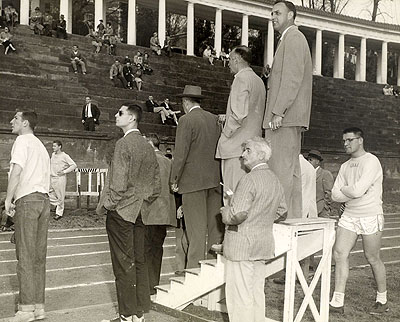
I was nearing the end of the fall semester of my third year in the College of Arts and Sciences. Except for a required chemistry course in the spring semester, the remainder of my schedule was relatively free. Now was my chance to branch out and explore some other areas, as befitted someone pursuing a liberal arts education.
I had always enjoyed English literature but had never read much that was written after the nineteenth century. The course catalog had an offering called English 28, Contemporary American Literature, meaning starting at about 1900. It looked interesting. I knew, however, that it was intended for English majors, and English had always been a strong department at Virginia. As a nonmajor I couldn’t take it without specific permission from the instructor, and so I went to see Joseph Blotner.
I gave Mr. Blotner a sales talk about how much I liked English literature and wanted to take his course. He quickly learned that I was a chemistry major and seemed really puzzled and cautious about having me in his class. English and chemistry are what one might call orthogonal disciplines, i.e. at right angles, the one having little or nothing to do with the other. So what was I trying to do? Didn’t I know that this was an intense course that demanded lots of reading and analysis, and that I would be up against serious competition? I could almost read his mind: What would I think of some dilettante English student who wanted to try his hand at an advanced chemistry course with little or no preparation? (Obvious answer: I would have admired his courage, but advised him as strongly as possible not to do it.) But seeing my persistence, Mr. Blotner finally relented and let me sign up anyway, probably against his better judgment.
At that stage I was unfamiliar with the words that Alexander Pope had put into the mouth of his pedantic literary nemesis Richard Bentley: “For thee (i.e. the Goddess of Dullness) we dim the eyes and stuff the head/With all such reading as was never read.” I was soon loaded to the gunwales with reading that was seldom read even then, and probably almost never these days except in English classes. We started off with The Ambassadors by Henry James, an enormous and convoluted unpageturner published in 1903. I imagined that one reason Mr. Blotner had assigned it was that he was trying to get students like me to drop the course early on. I somehow managed to get through this stultifying comedy of manners, and then after Theodore Dreiser’s equally lengthy but considerably more interesting An American Tragedy, things started to change.
William Faulkner was writer-in-residence at the University during this period, which was one reason I had wanted to take English 28. (Blotner was later to write a long biography of Faulkner, authorized by the writer’s family after Faulkner had passed on in 1962.) As a suitable diversion, Blotner accompanied Faulkner all over the Grounds, including to our track meets, which probably appealed to Faulkner’s horse-racing interests.
We commenced our Faulkner journey in Mr. Blotner’s class with The Sound and the Fury and As I Lay Dying, soon getting deep into the saga of Mississippi’s fictional Yoknapatawpha County and its stupendously decadent denizens. Most of the latter would have struggled to put one word after another on paper, but they thought in streams of consciousness that went on for page after page of muddled confusion, indecipherable time shifts, antecedentless pronouns, neurosis, outright psychosis and miry misery, with occasional flashes of sardonic humor to leaven the unbearable messes of their hopelessly depressing lives. Still, I would rather read ten of these books than one comatose The Ambassadors. Faulkner was often charged with writing such material after having had a few bourbons, and I could easily understand why this perception had arisen.
Faulkner gave frequent afternoon seminars in Rouss Hall to which students from many different graduate and undergraduate English courses were invited in turn. Faulkner did not lecture or volunteer material here; he was a quiet, shy, and private individual who inhabited his proprietary county and rarely left it. He had given a memorable address upon receiving the 1949 Nobel Prize for literature, but public speaking was not really his forte.
Students would come to the seminars with carefully-prepared questions typically addressing some abstruse point in one or another of his novels or stories. Faulkner would respond extemporaneously, gracefully, and as completely as he could under the circumstances. Although he answered most of the questions clearly and would sometimes expound upon them at length, the process was obviously difficult for him at times, as it no doubt would be for any author with a substantial opus. When stumped, he would unabashedly ask for help from Gwynn or Blotner. Occasionally, as at the seminar I attended on May 2, 1958, he would say very simply, “I don’t remember” or “It’s just a story.”
Upon being asked in one of his early seminars if he had read Henry James, Faulkner replied “Yes, but without much pleasure. Henry James to me was a prig, except for The Turn of the Screw, which was [a] very fine tour de force.” A few years ago, I read Faulkner in the University, Gwynn and Blotner’s condensation of Faulkner’s seminars, for the first time. I found it entertaining reading, and I confess that it gave me much pleasure to read Faulkner’s assessment of James. Due to lack of space, however, many of Faulkner’s remarks had to be omitted in the Gwynn and Blotner book. The present compilation now restores these omissions as completely as possible. In particular, the audio tapes provide much additional insight into Faulkner's thoughts as he responded to questions from the participants.
Perhaps I may be permitted to digress from my direct recollections of Faulkner the man to Faulkner the writer. I have enjoyed his stories and novels and have much appreciated the introduction to them that I received in Blotner’s course. Among dozens of other unforgettable characters that he created, Faulkner invented the avaricious and amoral Snopes family of The Hamlet, The Town, and The Mansion partly to satirize the growing crassness and commercialism of the South in the early twentieth century, and in this he succeeded admirably. The names of the Snopeses are memorably apt. The chief schemer is Flem (phlegm), who always seems to be chewing his eponymous cud. Among his many other misdeeds, Flem overlooks and even encourages the adultery of his stunning but clueless wife Eula in order to gain advancement in a local bank so that he can embezzle from it. After a series of earlier money-grubbing schemes, Flem solicits a bribe from Eula’s father to marry her, she being pregnant by another man. In a marvelous passage, Flem, who had no soul to begin with, cheats Satan out of it anyway. Then there is the vicious bushwhacker Mink Snopes, who eventually murders cousin Flem for not having helped him escape from prison after a previous assassination; proverb-quoting I. O. Snopes, who chisels his own kinfolk; honest grocer Wallstreet Panic Snopes (the son of good-hearted Eck, who after all is not a real Snopes); Montgomery Ward Snopes, who runs a photographic studio with pornographic postcards on the side, and various others. (If Faulkner were writing today, we might have Subprime Mortgage Snopes and Stimulus Package Snopes.) Finishing one of his novels tends to leave one wandering around in a depressed daze for several hours, which must mean that it was a good one. End of digression.
When attending Cavalier track meets at Lambeth Field, Faulkner was permitted to judge running events and also time them, although his timings in all likelihood were unofficial. At one such meet, I was in the stands with some of my friends when not participating myself. For part of his time at Lambeth on this occasion, Faulkner went over to a remote section of the stands and sat there alone. One of my friends asked us whether we would like to go over and talk with the author privately. None of us took him up on this suggestion, whereupon he sallied forth unafraid and spent some 15 minutes or so alone with Faulkner. Upon returning, he said that they had had a very nice conversation but was unwilling to divulge the subject matter.
Mr. Blotner has recently written an engaging autobiography (An Unexpected Life, 2005). Surviving a forced belly landing in a B-17 behind German lines, enduring bedbugs and lice at POW camps, and having known William Faulkner so well should certainly qualify as unexpected. His book is quite touching in places, if giving somewhat short shrift to the nuances of Charlottesville academic society; Blotner was from a far different biome, northern New Jersey.
Aristotle had a notion that within every raw piece of marble lies a predestined statue that will appear after a sculptor has simply removed the superfluous parts. In Pope’s concise paraphrase, you hew the block off and get out the man. Critics differed as to whether Blotner, in his massive two-volume 1974 biography of Faulkner, had successfully gotten out the man or just reduced him to powdery fragments that shed little light on how or why he had written his books. “Footnotes to Genius” ran the title of an unfriendly review in Time magazine, while others praised the study as definitive. Several extensive condensations and reissues with new matter have taken place, most recently in 2005.
Many writers, including Faulkner if one is to take his statements about such biographies at face value (“Don’t tell [my readers] anything [about me], it can’t matter to them”), prefer that their lives not be described at all, unless by themselves. This does not discourage those whom Faulkner called “academic gumshoes” from intruding in the dust. Their efforts continue to be the basis of a thriving cottage – one hesitates to say academical village – industry. Kipling’s valedictory “The Appeal” is one author’s plea for privacy about his personal life, one that often goes unheeded:
If I have given you delight
By aught that I have done,
Let me lie quiet in that night
Which shall be yours anon:
And for the little, little span
The dead are borne in mind,
Seek not to question other than
The books I leave
behind.
Notes and Sources
John A. Church is the author of Pleasant Riches: The University of Virginia in the Late Fifties (privately printed, 2009), from which most of the above material has been adapted. He was the City Editor for The Cavalier Daily who wrote the headline for the 16 February 1957 article “Faulkner Begins Stay As Writer-In-Residence.” He adds:
“I read the transcript and listened to the tape recordings of the Faulkner seminar that I attended on May 2, 1958. I couldn’t at first remember having asked a question myself on that occasion. However, just before the end of the second of these two tapes, I did a double take when a person clearly using my own voice posed the following question: ‘Sir, you’ve mentioned that these people in The Sound and the Fury are doomed. Is it your theory that people everywhere are doomed, or is it just these people in Mississippi?’ Faulkner began his answer with ‘No, no,’ followed immediately by laughter from the audience. He then chuckled and went on to give a ringing response: it was only the Compsons themselves who were doomed, because they lived in the past and ‘refused to accept now and tomorrow.’ Could I have just been intentionally priming Faulkner for the kind of answer that he gave? I can’t say now, because it’s impossible for me to remember exactly what was going on in my head more than half a century ago. In fact, many other Faulkner characters do appear to be doomed, though not necessarily in the Compsonian sense. Whatever the case, Faulkner’s answer was an eloquent one, and so I’m indeed glad that I did ask the question.
“My father had a far more significant connection with William Faulkner than any of mine. In October 1931, Faulkner attended the Southern Writers Convention at the University. Randolph W. Church (College ’29, Grad ’32), later State Librarian of Virginia and a graduate student in English in 1931, met Faulkner and other prominent writers of the day at the convention. The following account of some of these events is from my father’s small booklet entitled ‘John Cook Wyllie 1908-1968: A Very Personal Remembrance’ (privately printed, 1972): ‘There were literary giants in the earth in the early days. Through the good offices of perceptive members of the faculty they came to visit the University, and John [Wyllie] and I had the opportunity of meeting and talking with many of them: T. S. Eliot, James Stephens, Vachel Lindsay, Robert Frost, and, not least, an introspective little man who claimed Yoknapatawpha County, and who later made the University his final home. For him, we were commissioned to see that the University Library had in its collections all of his then extant printed material – no mean task. We were also required to find him when he became lost, and I vividly recall a sombre dawn when he was located, curbside, in the lower town.’ One can only speculate as to what might have happened if Faulkner had not been lucky enough to have been rescued in this way. John Wyllie was the University’s twelfth Librarian, serving in this capacity from 1956 until his untimely passing twelve years later. He had previously been Curator of the McGregor Library at Alderman and was a noted expert on rare books.”
Acknowledgment
I thank my brother Randolph W. Church Jr. (College ’57, Law ’60) for supplying extensive files of the Cavalier Daily from our time period as well as photocopies of pages from the Virginia Spectator.
©2010 John A. Church (j.church@mindspring.com)
Faulkner and an Undergraduate
By Gerald L. Cooper (College ’58, M.Ed. Guidance ’69)
Upon graduation from Christchurch School in June 1953, I entered and quickly left Princeton University in September, disenchanted. I attended the College of William and Mary for three semesters happily, and then transferred to the University of Virginia in January 1955, to pursue a major in English. A year or so later I found myself in a small lecture hall, straining to hear a world-renowned writer-in-residence who spoke in an almost inaudible voice using an extraordinary accent. He described a mythical place with an Indian-sounding name: Yoknapatawpha. That reminded me of my own place of origin: the shores of the Rappahannock.
The speaker was William Faulkner, whom I had heard of from another native Mississippian, Robert M. Yarbrough Jr., instructor in senior English at Christchurch. Bob had introduced me to Faulkner’s novels The Sound and the Fury and As I Lay Dying outside of class.
Someone in the audience that day in 1957 at the University of Virginia asked Mr. Faulkner to give his view of promising young American writers. Violating his policy against endorsing writers, he replied that one of the best was from right here in Virginia: “His name is William Styron, and his book is titled Lie Down In Darkness.” Deciphering Faulkner’s low-pitched, Miss’sippi drawl with no amplification from my seat on the back row of the small auditorium in Rouss Hall, I realized he had spoken the name of a graduate of my old school – William Styron, known to his Christchurch classmates as “Sty.” I had attended the graduation of the Class of 1942 at Christchurch, to honor my friend and mentor, Jim Davenport, a member of that class, along with Styron and about fourteen others. By 1957 I had also read Lie Down In Darkness, Styron’s first book, that he published in 1951 and that won the Prix de Rome.
Several daily newspapers reported Faulkner’s public recognition of William Styron, including the Washington Post and the Richmond Times-Dispatch. Thereafter I found it more comfortable to mention around the Grounds that I was a graduate of Christchurch. Both the University’s English professors and my fellow students, some of whom were graduates of well-known prep schools like Woodberry Forest, Episcopal High, and Lawrenceville, suddenly sounded respectful of Christchurch, that unpretentious school with the million-dollar view on a bank overlooking the Rappahannock River.
I completed a bachelor’s degree in English at the University of Virginia in December 1957, a year after William Faulkner arrived as writer-in-residence. I had several opportunities to hear Mr. Faulkner discuss his writing between January and December of 1957. Although I was not among the favorites of the English department’s English majors, and therefore not invited to special gatherings with Mr. Faulkner, it was possible nonetheless to find “Old Bill” around the Grounds, occasionally at fraternities. I remember his quiet presence one evening in the Serpentine Club, at the back of the Quadrangle. (I knew the location of every fraternity because one of my part-time jobs was delivering beer kegs to the fraternities from Carroll’s Tea Room.)
In that setting Mr. Faulkner was less reticent than he was in small English seminars or honors classes. His painful shyness in one-to-one settings became well-known in New Cabell Hall, and not many students signed up for those uncomfortable meetings. Perhaps he was under-utilized, as some have suggested.
Even peripheral undergraduate students such as I were aware that factions within the English department – and perhaps among the entire University administration – were in disagreement over the value of Mr. Faulkner’s presence and usefulness on the Grounds. Former professor of English Joseph Blotner has captured much of the color, along with some of the political issues, of that era at the University in his autobiographical work, An Unexpected Life, published in 2005. The chapter titled “The University and Mr. Faulkner” might more accurately be titled “The Faulkner Era at the University of Virginia.”
Despite the politics and controversy, William Faulkner had a remarkable impact in the brief period of his presence in Charlottesville. His time on the Grounds is comparable to the presence of Edgar Allan Poe, who was enrolled for one academic year, beginning February 1, 1826, in just the University’s second session.
The University of Virginia’s first president, Edwin A. Alderman, wrote in 1925 a convincing essay on Edgar Allan Poe’s tenure as a student. He describes how Poe, despite a short stay and a less than exemplary lifestyle, had symbolized the presence of a “world poet” at the University. Alderman concludes that Poe “has contributed an irreducible total of good to the spirit which men breathe [at the University] as well as a wide fame to his alma mater that will outlive all disaster, or change, or ill-fortune.” Alderman defines the effect that a true artistic talent may have upon a community of scholars – even when that presence is brief and controversial.
Blotner and others have reported that President Colgate Darden was lukewarm to Faulkner’s writer-in-residence status because he questioned that the University needed the national attention that Faulkner’s visit would bring. But from my point of view, William Faulkner’s presence on the grounds had the effect of opening a window onto a larger world for UVA students in the late 1950s. It is difficult for students in the 21st century to imagine what a great gulf existed between the Grounds and the larger worlds of government, commerce and especially the arts, before the advent of mass communications. No national media coverage originated in Charlottesville, and even Washington, D.C. offered little or no live theatre, at least until the Kennedy Center opened in 1971. Thus to have a person of international stature in the world of letters – a Nobel laureate – walking the Grounds daily over a period of months and years demonstrated that the University of Virginia had not lost sight of the world-class ambitions of its founder.
I’ve had an enduring interest in the University of Virginia ever since I arrived on the Grounds some fifty-three years ago as a “transfer” from another college. Perhaps that’s why I view the University from a different perspective than does the typical alumnus of any era before the 1970s. I have devoted a chapter in my ebook to the University of today, titled “Leading to Diversity,” highlighting the changes that I see as having occurred under the leadership of President John T. Casteen III.
I am happy to observe that gone are the days of a stereotyped faculty and student body, and of a laissez faire attitude toward diverse students that I experienced when I attended in the 1950s. As Mr. Jefferson the Francophile might have said, Vive la difference!
Gerald L. Cooper divided his 43-year career as an administrator, counselor and teacher among four preparatory schools, two colleges, and finally as executive director of a college access program [501 (c) (3)] that served ten public high schools in Norfolk, Portsmouth, and Virginia Beach. This essay derives from his ebook, On Scholarship – From An Empty Room at Princeton, available in PDF format online at “http://www.talkeetna.com/OnScholarship/index.html” . In it he describes his personal experiences with financial aid: receiving it, granting it, fundraising for it, and finding it for needy students.
President Alderman’s remarks about Poe can be found in “Edgar Allan Poe and the University of Virginia” (The Virginia Quarterly Review, spring 1925), reprinted in We Write for Our Own Time: Selected Essays from the Virginia Quarterly Review (Charlottesville, 2000).
©2010 Gerald L. Cooper
Faulkner and an Undergraduate
By Gerald L. Cooper (College ’58, M.Ed. Guidance ’69)
Upon graduation from Christchurch School in June 1953, I entered and quickly left Princeton University in September, disenchanted. I attended the College of William and Mary for three semesters happily, and then transferred to the University of Virginia in January 1955, to pursue a major in English. A year or so later I found myself in a small lecture hall, straining to hear a world-renowned writer-in-residence who spoke in an almost inaudible voice using an extraordinary accent. He described a mythical place with an Indian-sounding name: Yoknapatawpha. That reminded me of my own place of origin: the shores of the Rappahannock.
The speaker was William Faulkner, whom I had heard of from another native Mississippian, Robert M. Yarbrough Jr., instructor in senior English at Christchurch. Bob had introduced me to Faulkner’s novels The Sound and the Fury and As I Lay Dying outside of class.
Someone in the audience that day in 1957 at the University of Virginia asked Mr. Faulkner to give his view of promising young American writers. Violating his policy against endorsing writers, he replied that one of the best was from right here in Virginia: “His name is William Styron, and his book is titled Lie Down In Darkness.” Deciphering Faulkner’s low-pitched, Miss’sippi drawl with no amplification from my seat on the back row of the small auditorium in Rouss Hall, I realized he had spoken the name of a graduate of my old school – William Styron, known to his Christchurch classmates as “Sty.” I had attended the graduation of the Class of 1942 at Christchurch, to honor my friend and mentor, Jim Davenport, a member of that class, along with Styron and about fourteen others. By 1957 I had also read Lie Down In Darkness, Styron’s first book, that he published in 1951 and that won the Prix de Rome.
Several daily newspapers reported Faulkner’s public recognition of William Styron, including the Washington Post and the Richmond Times-Dispatch. Thereafter I found it more comfortable to mention around the Grounds that I was a graduate of Christchurch. Both the University’s English professors and my fellow students, some of whom were graduates of well-known prep schools like Woodberry Forest, Episcopal High, and Lawrenceville, suddenly sounded respectful of Christchurch, that unpretentious school with the million-dollar view on a bank overlooking the Rappahannock River.
I completed a bachelor’s degree in English at the University of Virginia in December 1957, a year after William Faulkner arrived as writer-in-residence. I had several opportunities to hear Mr. Faulkner discuss his writing between January and December of 1957. I was not among the elect of the English department’s English majors, and therefore I was not invited to special gatherings with Mr. Faulkner. It was possible nonetheless to find “Old Bill” around the Grounds, occasionally at fraternities. I remember his quiet presence one evening in the Serpentine Club, at the back of the Quadrangle. (I knew the location of every fraternity because one of my part-time jobs was delivering beer kegs to the fraternities from Carroll’s Tea Room.)
In that setting Mr. Faulkner was less reticent than he was in small English seminars or honors classes. His painful shyness in one-to-one settings became well-known in New Cabell Hall, and not many students signed up for those uncomfortable meetings. Perhaps he was under-utilized, as some have suggested.
Even peripheral undergraduate students such as I were aware that factions within the English department – and perhaps among the entire University administration – were in disagreement over the value of Mr. Faulkner’s presence and usefulness on the Grounds. Former professor of English Joseph Blotner has captured much of the color, along with some of the political issues, of that era at the University in his autobiographical work, An Unexpected Life, published in 2005. The chapter titled “The University and Mr. Faulkner” might more accurately be titled “The Faulkner Era at the University of Virginia.”
Despite the politics and controversy, William Faulkner had a remarkable impact in the brief period of his presence in Charlottesville. His time on the Grounds is comparable to the presence of Edgar Allan Poe, who was enrolled for just one academic year, beginning February 1, 1826, in the second session at the University of Virginia.
The University of Virginia’s first president, Edwin A. Alderman, wrote in 1925 a convincing essay on Edgar Allan Poe’s brief time as a student at the University. He described how Poe, despite a short stay and a less than exemplary lifestyle, had symbolized the presence of a “world poet” at the University. Alderman concluded that Poe “has contributed an irreducible total of good to the spirit which men breathe [at the University] as well as a wide fame to his alma mater that will outlive all disaster, or change, or ill-fortune.” Alderman defined the effect that a true artistic talent may have upon a community of scholars – even when that presence is brief and controversial.
Mr. Faulkner’s arrival on the Grounds signaled the presence of another “world writer” equal in stature to Edgar Allan Poe and Thomas Jefferson, who had dominated the University of Virginia’s pantheon of genius for generations. Blotner and others reported that President Colgate Darden was lukewarm to Faulkner’s writer-in-residence status because he questioned that the University needed the national attention that Faulkner’s visit would bring.
I’ve had an enduring interest in the University of Virginia ever since I arrived on the Grounds some fifty-three years ago as a “transfer” from another college. Perhaps that’s why I view the University from a different perspective than does the typical alumnus of any era before the 1970s. I have devoted a chapter in my forthcoming book to the University of today, titled “Leading to Diversity,” highlighting the changes that I see as having occurred under the leadership of President John T. Casteen III.
I am happy to observe that gone are the days of a stereotyped faculty and student body, and of a laissez faire attitude toward diverse students that I experienced when I attended in the 1950s. As I see it today:
John Casteen as president has influenced the entire University of Virginia community to draw on the distinctive attributes of its past – including the genius of its founder, Thomas Jefferson – and also to make changes in its practices for the future, aiming to set standards for measurably higher achievement in the twenty-first century. In the twenty years that he has been president, Casteen has gathered a diverse group of persons to the University’s faculty, administration and student body, and he has nurtured them in their new environment. Apparently the Board of Visitors shares this commitment to diversity.
As Mr. Jefferson the Francophile might have said, Vive la difference!
Gerald L. Cooper divided his 43-year career as an administrator, counselor and teacher among four preparatory schools, two colleges, and finally as executive director of a college access program [501 (c) (3)] that served ten public high schools in Norfolk, Portsmouth, and Virginia Beach. This essay derives from his forthcoming book, On Scholarship – From An Empty Room at Princeton, about his personal experiences with financial aid: receiving it, granting it, fundraising for it, and finding it for needy students.
President Alderman’s remarks about Poe can be found in “Edgar Allan Poe and the University of Virginia” (The Virginia Quarterly Review, spring 1925), reprinted in We Write for Our Own Time: Selected Essays from the Virginia Quarterly Review (Charlottesville, 2000).
©2010 Gerald L. Cooper
Learning Faulkner
By Ann Thomas Moore (Grad English ’58)
Why Frederick Gwynn prepped our graduate class in the American novel so rigorously in anticipation of the visit of William Faulkner, I’m not quite sure. Whatever his reasons, he had each of us submit, several class meetings in advance, a list of tentative questions that we might ask our guest. These sheets came back to us in the next class, the last before the visitation, with the handwritten note, “Ask this one.” An arrow pointed to the acceptable question.
It was humbling to realize that any of our questions might have been unworthy, but whatever the reasons, graduate school was all new to me. Since graduating four years earlier from Westhampton College of the University of Richmond with the BA in French, I had taught half that time in a public elementary school in Roanoke and half in the English department at the then-flourishing old Lane High School in Charlottesville. But the University of Virginia exerted an irresistible pull: I couldn’t live that close to Mr. Jefferson’s university without being a student there myself. And so I had enrolled as a graduate student in English.
On the appointed day of the Faulkner visit to our class, we sat, thoroughly coached, in silent anticipation, our sheets of questions on our desks before us. Mr. Gwynn stepped out into the hall and ushered William Faulkner into the room. He introduced our guest formally and, after seating him in the professor’s chair, center front, retired to a student desk on the side of the room near the windows and waited to see what would happen.
A lengthy silence followed. Faulkner sat, hands loosely clasped on the desk, and looked at us. He was utterly serene, and we began to realize that we could sit a very long time with nothing being said unless one of us asked a question. Finally, Doug Day, veteran of the U.S. Marine Corps who sat on the front row (and later became a member of the UVA English Department), stormed the silence with the first question. Faulkner responded fully and graciously, and then the silence fell again. But we now understood the strategy. I’m not sure that we ever overcame our reticence entirely, or that he ever really relaxed into an easy exchange with us. But for the next hour, we proceeded in this manner, feeling our way and getting dim insights into this man who was both mystery and object of admiration to all of us.
For the rest of the year, I would see him from time to time on the Grounds, almost always strolling alone. He was easily recognizable from a distance – a small trim man with a certain dignity in his step, a tweed suit, a felt hat, his pipe. When I walked down the hall past his office in the English department, I would often see him through the open door, his face just visible above the big typewriter on his desk. It was his open door that gave other students outside of English individual access to him. The academic setting was one thing, however, the social another. He was reputed to be a dud at cocktail parties, where he would retire to nurse his drink and not have much to say until time to go home.
One didn’t have to be a graduate student in English to know William Faulkner. In Mary Munford Hall, which at the time housed female graduate students from all disciplines, I recall a long late-night conversation with one of the high school teachers of science who were in residence for a special program. She had independently become fascinated with Faulkner and read everything of his that she could find. She went to all his public readings and wanted to hear whatever I could tell her. Somehow, despite the requirements and rigors of her own program, her intellectual encounter with his work was clearly a significant part of the education she was getting.
He did several public readings during the course of that year. Everybody knew these were not to be missed, and there were always large audiences including people from both the University and the town. I have a dim memory of another occasion when he read his Nobel acceptance speech to a small gathering in the Rare Book Room.
Before my experience of Faulkner’s year in residence at the University, his prose had seemed complex and difficult, not providing me, I thought, any handles to relate to his story. His was not the South that I knew, and I hadn’t especially liked his characters.
But being a graduate student at the University of Virginia when William Faulkner was in residence there was an important educational initiation for me. I found, as I got to know him in some small way, and to hear his stories spoken in his own voice, that I was able to read him with greater comprehension. Intellectually, I developed some sense of what he was about, an understanding of why he was important, and a great appreciation of his accomplishment. And for me personally, these insights made less mysterious to me the larger South where I had lived all my life. They helped me to see more broadly, think more deeply, and appreciate with greater comprehension the fact of growing up in that place, at that time, in our country’s history.
Ann Thomas Moore (Rosa Ann Thomas, MA English, UVA 1958) taught in public schools in both Roanoke and Charlottesville, Virginia, and in the English Department at the University of Tennessee at Chattanooga. She worked as a copywriter in Houston (1981-1986) and in Los Angeles (1987-1997). After her move to New York City in 1997, she retired briefly but returned to teaching as an Adjunct Associate Professor of English at Pace University (2001-2010). She can be emailed at anntee@mac.com.
©2010 Ann Thomas Moore
Memories of William Faulkner
By James W. Haskins (College ’63, Law ’66)
[When Mr. Haskins took Professor Blotner’s course, Faulkner had already completed his last term as “Writer-in-Residence,” but as this recollection indicates, he remained a presence at UVA, and still made occasional appearances in English department classes. He read The Reivers publicly in the Cabell Hall auditorium on the evening of 17 May 1962. This was his last appearance before a UVA audience – and his largest: nearly a thousand people attended. These sessions were not recorded.]
I was a 1963 graduate of the College of Arts of Science at the University of Virginia and a graduate of the law school in 1966. In the fall of 1959, I had read Faulkner’s “Nobel Acceptance Speech” and had pictured him to be a writer of a unique period of southern history that had universal significance. As I began my second year of undergraduate study, I was enrolled in a course taught by Joseph Blotner who was a professor of English and a close personal friend of Mr. Faulkner. Professor Blotner arranged for our class to hear Mr.Faulkner on several occasions during which I became aware of Mr. Faulkner’s eccentric personality. At least, that is the way it appeared to a second year student from Martinsville who considered himself lucky to be a student at the University of Virginia.
On one occasion, Mr. Faulkner was coming to our class for a question and answer session about his work. At the beginning of the class, Mr.Faulkner was introduced by Professor Blotner and stood before the class. Mr. Faulkner said nothing and stood there for what seemed liked a couple of minutes of silence before a student asked him a question. The question and answer session ended and Mr. Faulkner left the class. Professor Blotner told us that Mr. Faulkner was there to answer questions from students and it was his custom to not speak unless he had been asked a question during this type of session.
On several occasions a student asked Mr. Faulkner why he made a particular statement in The Sound and the Fury. Mr. Faulkner would always answer, “I didn’t make this statement, Jason or Quentin made the statement.” Mr. Faulkner would then stand quietly until another question was asked.
During one of his class appearances, Mr. Faulkner was asked about the complicated structure of the The Sound and the Fury. He answered that he did not set out to write a novel but a long story similar in length to “The Bear.” As to the structure of the novel, it began from Benjy’s point of view. Mr. Faulkner then stated that he could not conclude the story with Benjy so he let Quentin and Jason tell the story for a while. Finally, when this too did not work, he decided to “. . . let Faulkner tell the story” and it was finished as part four. Thus, The Sound and the Fury became a great novel.
When The Reivers was published in 1962, I remember hearing Mr. Faulkner read from his new novel. Mr. Faulkner appeared at the designated time and place and after being introduced by Professor Blotner he began to read several parts of the novel. When he finished the reading, he closed the book and left the room. Again, like the question and answer session, Mr. Blotner explained that this session was a reading and when the reading was complete the session was over. There were no questions.
With Professor Blotner’s teaching of Absalom, Absalom and The Sound and the Fury in our coursework, I became interested in Mr. Faulkner as an individual. I would often see him walking alone through the grounds of the University. Whenever I would see him there, I would follow him from place to place just to see where he was going and what he might do. On a couple of occasions, I followed him into Mincer’s Pipe Shop on the Corner. I watched him purchase packages of Roitan Cigars. He would then leave Mincer’s and walk back towards his home that was located on Rugby Road.
My impression of Mr. Faulkner from my own observations, as well as insights from Professor Blotner, was that he was a private man who was not interested in traditional social skills. The course with Professor Blotner and my exposure to Mr. Faulkner are memories of the University that I still cherish.
©2010 James W. Haskins
Memories of “Bill” Faulkner with the IMP Society
By Jack Docherty (Education ’61)
I entered the University in January, 1958, as Mr. Faulkner began his second and last term as Writer-in-Residence. I would always speak with him when I saw him walking on the grounds, and especially at the track meets which he frequented. At one meet we were talking on the field and I asked him how much longer would he remain in Charlottesville before returning to Oxford, Mississippi. He said “a fortnight.” I didn’t know what that word meant, and I went back to my room and looked it up in the dictionary. Every time I’ve heard that word since then (admittedly, not too often) I think of him. He had that beautiful British way of speaking, with neat phrases and often unusual wording. Speaking with him was always a joy for me. He was also surprisingly humble. Once I had two young co-eds in my car and was showing them around the Grounds when I spotted Mr. Faulkner walking unnoticed. “There's William Faulkner,” I told my lady friends. They were extremely excited and asked me to stop, which I did. He was very sweet with those girls. The four of us had such a lovely experience that I was glad we had stopped to talk.
I was, or rather I am a member of the IMP Society. In 1958, The IMPS decided that Mr. Faulkner should receive the IMP Award we give annually to an important Professor, and invited him to attend the awards dinner. We also invited Professor John Coleman, the distinguished English Professor, to accompany Mr. Faulkner at the ceremony. (I can't remember if it was at Fry Springs or Farmington.) On the night of the dinner we sent one of our members – I’ll call him “Henry” in this account, though that is not his name – to pick up Mr. Faulkner and the VIP guest Professor Coleman from the English Department. Well, Henry had put a few swigs of his favorite bourbon, Virginia Gentleman, in him before he left our pre-dinner cocktail party to pick the two up – enough so that he was feeling no pain. He returned with both of our distinguished guests. We realized just how much of bourbon Henry had downed when he came into the room with his arm around Mr. Faulkner as if they were old and best friends. They were about the same height. Henry, with his arm around Mr. Faulkner, proceeds to introduce the ten or twelve IMPS in the room to his new pal, “Bill” Faulkner! Professor Coleman began having a nervous breakdown which got worse every time Henry called Mr. Faulkner “Bill.” As for Mr. Faulkner, he was loving it! He loved the whole evening and we all had a great dinner and evening. This wonderful man and author gave a warm thank you speech. Of course a more sober member took Mr. Faulkner home.
In closing I want to remark how humble and shy Mr. Faulkner was. While attending Mr. Jefferson’s University we often speak about being a “gentleman.” To me and my fellow classmates, Mr. Faulkner was the walking symbol of what that word means. And God, could that man write!! We were blessed, we few 4500 men students wearing coats and ties, to have William Faulkner walk with us and share with us his genius on our immortal grounds.
While a student on an athletic scholarship Jack Docherty was elected the President of his school and was a member of the Jefferson Literary Society, the IMP Society, the TILKA Society and the Honor Committee. He played on the football team and was the last boxer to represent the University of Virginia at the NCAA Boxing Championships. Although he says he still doesn’t know how he did it, he graduated in 3 years. After UVA he worked at Bristol Myers Squibb before he became the Founder and CEO of a Boston Orthopaedic Medical Firm. He assisted in the design and development of total hip and knee joint replacements and reconstruction at the Harvard Medical School Hospitals. In 1997, he retired to Hilton Head Island, South Carolina. He can be contacted at docxx@webtv.net
©2010 Jack Docherty
Encountering Mr. Faulkner
Joe Carroll (College ’61)
In this detail from a Rip Payne photo of Faulkner’s May 1961 reading in the Library’s McGregor Room, Joe Carroll, but not his wire recorder, can be seen far right, in the chair at the author’s immediate left.
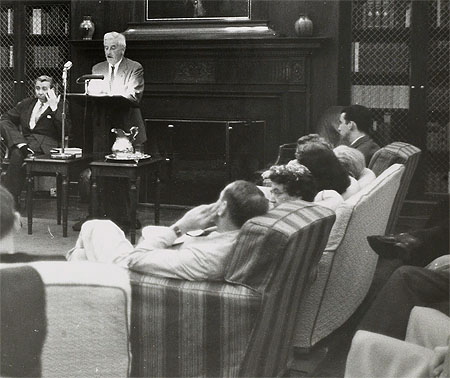
I was a First Year Student when Faulkner served his second term as Writer-in-Residence. My memory tells me that my encounters with him both occurred during my own second year, 1958-1959, but the photographic evidence makes it seem more likely that the second encounter came during my last year at UVA. Before I get to these encounters, however, I want to share one anecdote I acquired secondhand, about Faulkner as a true window shopper.
I recall the owner of ELJO’s, at the time Charlottesville’s leading men's store, located near Mincer’s on the Corner, telling me that he sold clothing to Faulkner from time to time but that, due to his nature (perhaps shyness), Faulkner would never come in to the store to shop. He preferred to window shop as he passed by the store. When he saw something in the window that he liked he would come in to the store and purchase it. Therefore, El always tried to put something in the window he thought would appeal to Faulkner.
My own first encounter with Faulkner can be called cinematic. I had gone to the University Theatre one afternoon to see a new movie, based on a Faulkner novel. I believe it was The Long Hot Summer. I was sitting in my favorite spot, the middle seat in the center of the theater. Just as the lights dimmed and the movie began I noticed that someone came in and took the seat next to the empty one beside me. I did a double take when I realized it was Faulkner. He saw me looking at him and gave me a polite nod. We never spoke and I did not have the nerve afterwards to ask if he enjoyed the film.
My last encounter could be entitled “A Painful Lesson.” When it was announced that Faulkner was going to do a reading at the Alderman Library one afternoon, and that it would be open to all students, I scraped together practically every cent I had to run down to the University Bookstore and purchase a portable wire recorder. Some may remember that wire recorders preceded tape. I think it cost about $100. I got to the reading room at the library about an hour early to get a seat as near to the lectern as I could. I chose a sofa that was facing perpendicular to the lectern. When Faulkner began to speak I plugged in the microphone and held it out toward him as far as I could reach. I had never used the recorder and did not know how well the mike would pick up his voice.
I held the microphone in this position until my arm was practically paralyzed. I saw Faulkner glance at me several times, probably noting that I was recording him, but he did not say anything so I felt I was not violating any rule. When he finished his reading, I relaxed my arm and reached down to turn off the recorder. What I saw pained me even more than my sore arm: the microphone jack was unplugged and dangling beside the chair near the floor. I had recorded absolutely nothing of his reading.
I’ve always wondered if Faulkner had noticed this idiot holding up an unattached microphone for almost an hour. I’m sure it would have given him a chuckle.
After graduating from UVA, Joe Carroll received an MA in Romance Languages from Princeton in 1963 and went on to teach at several colleges and universities until 1969 when he left academia to join an advertising and publishing relations agency in Knoxville, TN. There he served as Vice President/Account Supervisor. He then joined Furniture/Today, the weekly business newspaper of the furniture industry, becoming publisher in 1985. In recognition of his contributions to the furniture industry he received the City of Hope's Spirit of Life Award in 2006. In 2009 he was elected to the American Furniture Hall of Fame. He received an honorary Doctorate degree from Kendall College in 2010. He is the author of four books in The Perfect Home series. He retired in April, 2010 and came out of retirement in July to head a High Point Advertising and Public Relations agency.
©2010 Joe Carroll
Memory of William Faulkner
By Lloyd T. Smith, Jr. (College ’55, Law ’60)
I was a 1955 graduate of the College of Arts & Sciences at the University of Virginia and returned to the Law School in September of 1957. At that time the Law School was in Clark Hall, which was only a stone’s throw from Cabell Hall where Mr. Faulkner was scheduled to give a series of talks to students, all of whom were invited to attend. I think I attended about three of his informal lectures which were really simply question and answer sessions. I have no memory of Mr. Faulkner giving a prepared talk or that these sessions were related to any particular work. There was a faculty member present but I don’t think he ever directed the lectures.
My clearest impression is that Faulkner did not wish to be asked analytical questions about his style or the moral or philosophical implications of his writing. I think he considered himself a story teller who had worked hard to develop a voice and a style: each reader could take from one of his novels just what he wished. What scholars might find in his work was not his business and much of it was rubbish. He did not appear to enjoy appearing before such an audience; if anything he was resentful.
In one of his lectures a student arose and asked how Mr. Faulkner could possible justify writing “The Bear,” which he characterized as glorifying the slaughter of wild animals. Faulkner had apparently never thought of this criticism and remarked that the question was stupid and gave no answer.
I met Mr. Faulkner on more intimate terms in the early 1960s. I was practicing law in a Charlottesville firm when the senior associate, Leigh B. Middleditch, Jr., asked me if I would go with him after work to witness William Faulkner’s will. Middleditch had prepared the will, and at 5:00 PM we left the office and drove to Mr. Faulkner’s house on Rugby Road. We were met at the door by a courtly black man wearing a white jacket with green and gold piping who showed us to the parlor. Mr. Faulkner appeared shortly and Middleditch went through the formalities and the will was signed and witnessed. Then, without any particular request, the black man reappeared in the parlor with a silver tray bearing three gin and tonic.
The three of us sat quietly for a few moments and to make conversation I asked Mr. Faulkner if his novel, The Fable, which I had recently read, drew on a chapter in Dostoyevsky’s novel, The Brothers Karamazov, particularly, “The Grand Inquisitor.” His response, after a poignant pause, was, “Misto Smith, I gather you fancy yourself a Renaissance man.” He was correct, but never answered my question and I did not repeat it. I knew the answer.
The conversation turned to fox hunting and there was no further literary discussion.
©2010 Lloyd T. Smith, Jr.
My Time with William Faulkner
By William Lecky (Architecture ’60)
I was in the School of Architecture at UVA from 1955 until I graduated in 1960. I audited several English courses during Faulkner’s tenure at the University. Mr. Faulkner was given a small office in Cabell and students were encouraged to “drop in” and meet this amazing author. I had a class on the same floor as his office and would walk by his assigned space every other day. Yet each time I looked in his open door, there was no one there but him, reading the paper. In hindsight, I suppose it was absurd, but I began to feel sorry for the man, thinking he might be feeling under-utilized by the students. So one day I went in, introduced myself, asked a few inane questions about one of his books as a way to break the ice, and then sat down and began to chat. Over time we became friends and started going to UVA baseball games together at Lambeth Field. We frequently walked down the street and a car would speed by and someone would shout “Hi, Bill.” Since we were both Bills, we both waved back on reflex. We would always smile at each other, having no idea who was in the car or who they were calling to. Since he was who he was, and I was who I was, I suspect they were calling to him somewhere between 95 and 100 percent of the time.
I remember one game in particular. They sold cold Coca-Cola in bottles to people watching the game. We were sitting on the upper seats looking down at the game when two children – perhaps 10 or 12 years old – began running around the collecting empty bottles that had been left by students below us. At one point an argument broke out over who was going to claim one of the empty bottles. They both arrived at the same bottle at the same time. The argument got more and more heated until it appeared they were going to square off and fight for possession of that empty bottle. I turned to Faulkner and said, “Well, who do you put your money on?” Faulkner hesitated for a moment and replied, “I don’t know who is going to win, but the kid on the left will be the one that cries!” I found his perception of this small event so profound that I remember it to this day with such clarity, as though it happened yesterday.
On a lighter side, I had done a charcoal drawing of a scene from one of Faulkner’s books that I mentioned during one of my visits to his office. He seemed very interested in seeing it, so I invited him to come by my apartment on his way home. I lived on Rugby Road in a large house converted into several apartments, and Faulkner walked by my building every day. He agreed to come later in the week, so I invited a friend from Washington to come down to meet the great man on the appointed day. I met Mr. Faulkner at his office and walked down the Lawn to Rugby Road. We arrived at my apartment, Faulkner came in, and I showed him the drawing . . . but somehow my friend had disappeared. I kept him there, discussing the drawing as long as possible, until finally he had to go. Just after he left, my friend emerged from the bathroom. He apparently got so nervous at the thought of meeting such a great man, that mother nature summoned his body for other needs. So after he came all the way to Charlottesville from DC, they never met.
At the School of Architecture, at least when I was there, there was a tradition that the fourth year class (Architecture was a five year program at that time) would take a field trip with one of the professors over the Spring Break. The trip was funded by donations received from architects in and around the area. The furthest any class had gone was Chicago. It occurred to me, after learning of this tradition, that we shouldn’t wait till our fourth year to go soliciting funds from local architects. So I got the class together and we formed an organization we called The Forum of Contemporary Arts. We put on a few art shows, had a large art raffle one year, and I wrote letters to every famous architect, poet, author, and artist that I could think of, asking them to come to Charlottesville to give a talk. Other than a large collection of rejection letters from some very famous people, the effort was essentially unsuccessful. There was, however, a group called the Institute of Contemporary Art in Washington that was very successful at recruiting people of note to come to DC to give a lecture. Of course, they paid lecturers for their efforts, which was a benefit we failed to offer. In any event, the President of that organization learned, somehow, that I had befriended William Faulkner, who was a person they coveted, but one who had never agreed to speak to their organization. Even at UVA, as far as I know, or can remember, Mr. Faulkner did mainly readings from his works and answered questions from the students. He seldom gave formal “talks.” In any case, the President of the ICA came down to visit me one afternoon. He wanted to work a trade. He would get Frank Lloyd Wright to come to UVA to give a talk, and I would convince William Faulkner to go to DC for the same purpose. The thought of meeting and hearing Frank Lloyd Wright was, of course, overwhelming, but I "agreed" to the "deal."
The next thing I knew, I got a call from the ICA that Frank Lloyd Wright had agreed to come to UVA for a talk. Our class was beside themselves. We got permission from the University to put on the event, and sold 1,000 tickets for a lecture at the Cabell Hall auditorium. We collected $5,000 in ticket sales. As the fates would have it, however, unfortunately I got a telegram from Mr. Wright two days before the scheduled event that he had taken ill, and his doctor had forbidden him from any travel. He was very apologetic, but promised to schedule a trip to UVA when he recovered. We notified the press of the cancellation, and gave instructions for reimbursement, but miraculously only half the ticket buyers asked for a refund. Along with other contributions and art sales, our class had assembled enough money to spend ten days in Mexico City over our fourth year Spring Break. Mr. Faulkner was flattered to be offered as a trade for the world’s most famous architect of the time, but not surprisingly elected to pass on the invitation to go to DC. As an aside, Mr. Wright died just a few days after I received his telegram.
William Lecky, FAIA, spent 35 years of his professional career as a partner in the firm Cooper-Lecky Architects in Washington, DC. He is currently owner and founder of The Lecky Design Studio. High points in his career include several projects at the White House, the Blair House, the Vice-President's House, the Vietnam Veterans Memorial and the Korean War Veterans Memorial on the National Mall. He has been awarded a National AIA Design Award, the Presidential Design Award, the AIA 25 Year Award, the Virginia Distinguished Achievement Award, the AIA Silver Medal, and multiple regional design awards.
©2010 William Lecky
The Gentleman Hitch-Hiker
By R. C. Greene (College ’61)
My term as William Faulkner’s unoffical driver-in-residence must have occurred in the Spring 1958, during my first year at UVA. I remember seeing him at some point during that year in Cabell Hall; I was casually interested in knowing he was at the University, but like many other students, I did not realize that we were in the presence of true greatness.
For various reasons, I was one of the few first-year students who were permitted a car on Grounds. It was sometime after first seeing him, when I was driving through the Grounds, that a mustached Southern Gentleman in a white linen suit and blue-and-orange tie, with an umbrella hooked over his left arm, had his right hand and thumb out seeking a ride. I must admit, I did not recognize him as Mr. Faulkner, attesting to my obvious inattentiveness during the Cabell Hall event.
I stopped for the man, asked where he was going, and proceeded to take him with me to downtown Charlottesville. I do not recall why either of us was going there. He said he was a professor at UVA, but gave no name. He said he would be going to C-ville at that time each week – was I? Having a part-time job near Free Bridge, I made a plan to pick him up each week at the same place and time (a Thursday, I believe, in late morning).
The following week, after having been told by a dorm mate that he had seen me driving Mr. Faulkner, I first apologized to him for not recognizing him. Putting me fully at ease, he said that he had to admit that he did not recognize me either, and we shook hands, acknowledging one another with a laugh.
He was fun and easy to talk with – a bit “crusty” and I liked that.
I recall a discussion of Faulkner’s works in English class when the professor and I disagreed on the meaning of some passage in one of his works. I said I would ask Mr. Faulkner, which completely unglued the professor (whose name escapes me), since I had a one-on-one relationship with, arguably, the most world-famous man in Charlottesville since Jefferson himself. Obviously, the professor did not enjoy such a relationship.
At our next encounter, I did ask Mr. Faulkner the “hidden” meaning of the passage, to which he replied (and I remember clearly): “I wrote what I meant, and I meant what I wrote.” I wish I could recall the passage or even from which piece it came.
I have tried to remember if I ever figured out where Mr. Faulkner was going, but nothing comes to mind. I am not sure I ever knew, just that I dropped him off on Main Street (now the Mall) at the corner of 5th Street, where the Army-Navy Store was at that time. There were lots of banks, professional offices and good restaurants in the area. I picked him up just before noon, so he may have had a regular luncheon appointment with someone. We travelled together on Thursdays for a month or more, and then one of us stopped going to Charlottesville at that time of day. It was a fun experience for me, even at that time.
Once, when walking with some friends to the Corner, Mr. Faulkner came walking in the opposite direction and casually said: “Good morning, Dick.” Great memory!
His daughter was Master of the Farmington (Fox) Hunt. I met her several times when the Hunt crossed our horse farm north of Crozet, some years ago.
It was 54 years ago that Mr. Faulkner was my passenger, and it is one of my fondest memories (of many) of my days at UVA.
Following the UVA experience, which included ROTC, Dick Greene served his country “on loan” to a related government agency in SE Asia; then obtained an MBA in Land Economics from Fairleigh Dickinson University and began a career as a real estate entrepreneur–broker, investor, builder, developer and consultant. He served nine years on the Alumni Board of the Greater NY UVA Chapter, rising to President and Chairman in the 1970’s. He and his wife have been married 42 years, have one daughter and one granddaughter. They enjoy their horse farms in NJ and VA, collect classic cars, fly their Cessna Skyhawk and research history as a hobby. He has returned to UVA’s Medical Center for two major operations by top-notch doctors recommended by classmates.
©2011 R. C. Greene
Mr. Faulkner in My Classroomr
By Robert Scholes
[This essay was first published, in a slightly longer form, in The Brown Alumni Magazine (May/June 2006), and is reprinted here with the generous permission of the BAM. Professor Scholes taught at UVA between 1959 and 1964. Faulkner’s visit to his class probably occurred in 1962, during one of the returns to UVA that the novelist made every spring between the end of his second residency and his death.]
The main event in this narrative is a visit paid by William Faulkner to my undergraduate honors seminar in the novel, on a day when we were discussing his novel Absalom, Absalom! I had occasion recently to mention this episode in the preface to a book of mine, and I have been getting questions about it ever since. People want to know what this experience was like, what Mr. Faulkner was like, how he responded to students – and things of that sort. I will try to answer these questions, but first I need to provide a bit of background on that moment in our history as it played out in and around the university that Thomas Jefferson designed and founded many years before.
I started teaching at the University of Virginia in 1959, fresh out of graduate school at Cornell, where I had contemplated writing a dissertation on Joseph Conrad and William Faulkner, but had dropped that idea when offered the newly acquired papers of James Joyce to catalogue instead. But Faulkner was a star in my firmament before I ever got to shake his hand or chat with him at a party. He had been a Writer-in-Residence at UVA for some years before I got there, spending half the year there, and dutifully allowing conversations with faculty to be recorded and published. I had read a volume of these before I even got there. But these were not quiet times in that part of the world.
I remember being interviewed in a hotel room at the meeting of the Modern Language Association by a disgruntled professor who waxed eloquent on the subject of what was called “massive resistance” – the closing of the public schools in Charlottesville, rather than integrate them as the law had begun to require. The professor left the University of Virginia and I arrived, after being assured that the schools were indeed reopening, so that my two little ones could attend them. But other things were going on. There were no female students at Virginia in those days, and, at football games, black people sat in the end zone and whites along the side of the field. The local movie theatre made all black people sit in the balcony, and I soon got into a controversy in the newspaper with someone who insisted that this was necessary because they smelled bad. I remember responding that some white people smelled worse than some black people, and suggesting that a smellometer be put in the lobby and everyone with a high score be sent upstairs – but this did not happen, as you might expect.
As a Yankee, born in Brooklyn, educated in New York and Connecticut, I was really in no position to pontificate about all this to the locals. But I had white southern colleagues who played a leading role in the struggle over civil rights, sitting in with blacks at local diners and generally proving that not all southerners were bigoted or cowardly. The position of Faulkner in all this was interesting. Any serious reader of his novels knew that he did not think white folks were necessarily smarter, more sensitive, or morally superior to blacks. I remember asking him at a conference about his book, Go Down, Moses, which he always called a novel, though it looked to many people like a collection of stories about different people over a long period of time. They had stopped tape-recording his conferences by this time, and I think he was a bit more forthcoming because of that. In any case, he explained patiently to me that the book was unified by taking place entirely on the same bit of territory, and by having as its protagonist the Negro race as a whole. As the title implied, it was about their evolution toward freedom and equality.
I should point out that Faulkner took his obligations as Writer-in-Residence seriously, interpreting them as a responsibility toward the students in particular. During this struggle over civil rights he spoke at least once to a group of undergraduates about integration. What I learned about that meeting suggests that he told them that integration was right and should happen, but that he thought it needed some time and shouldn’t be hurried. As we know now, it came pretty fast, but with many gaps and difficulties that helped keep racism alive and well, with politicians in the south and elsewhere playing the race card for years afterward with varying degrees of subtlety. I don’t want to suggest that it should have come more slowly, only to point out that Faulkner was right to be concerned about the pace of the process and how that might affect the results.
It was his concern for the students, and his commitment to them, however, that brought him to my seminar. As I recall, this visit was arranged by Joe Blotner, a colleague who had generally squired Mr. Faulkner around the university, tape-recorded the interviews, and ultimately, some years after his death, published a major biography of Faulkner. Mr. Faulkner, as we called him, liked Joe and was at ease with him and his family. Virginia was a rather formal place in those days. We referred to the founder as Mr. Jefferson, and my department chair told his faculty that we should dress as well as the students. (I remember asking him if he meant qualitatively or quantitatively, and he said he meant we should wear coats and ties. This gentleman was also my landlord, and when he promoted me from Instructor to Assistant Professor, he actually raised my rent.)
On the big day, Mr. Faulkner came to Joe’s office, as I recall, and I met him there and walked him down the hall to the seminar room, where he joined us around a large table. He had re-read the book, he said, so he could respond to questions about it. So, the students started in and he was as forthcoming and serious as anyone might wish. At social events, I should point out, this was notoriously not the case. People trying to talk literature with him over a class of bourbon, were rebuffed, usually politely. I remember talking to him about cock-fighting at such gatherings and things like that – about which I knew nothing, but I was trying to learn as much as I could about southern culture, and what better teacher could one have? But he was not the same reticent country gentleman in the seminar room with students.
If I were the sort of memoirist who gets on Oprah, I would probably remember every detail of that class, with advantages, but it is all a blur in my memory, except that I recall my own major question, which I saved until the students had satisfied to some extent their own thirst for knowledge. In reading Absalom, Absalom! we learn about the past first from those closest to the events and gradually move further away until at the end, what we are getting is the imaginative reconstruction of that past by two college students who have a large emotional investment in what happened and what it meant. I told Mr. Faulkner that it seemed to me that the further away we got from the eye-witnesses and the deeper we got into the imaginative reconstruction of events by those who were never near them, the closer we were coming to the truth. All I remember is that he confirmed my view, or seemed to. And it is a literary view, the view of an artist not a country gentleman. Mr. Faulkner, as it happened could play both of those roles, perfectly, and I am grateful that I had a chance to be an eye-witness to them, though I remain cautious about claiming that my memory speaks the truth about him One thing I do know. The books are great books, and they are still very much alive. And Mr. Faulkner was a great writer – one of the greatest we have ever had. It was a privilege to chat with him socially and a thrill to hear him talk seriously about literature as an art. Being an English teacher has its moments, after all.
©2006, 2010 Robert Scholes
Below: Cover from the "Writer-in-Residence Issue" of the Virginia Spectator monthly magazine (April 1957; vol. 118, no. 7).
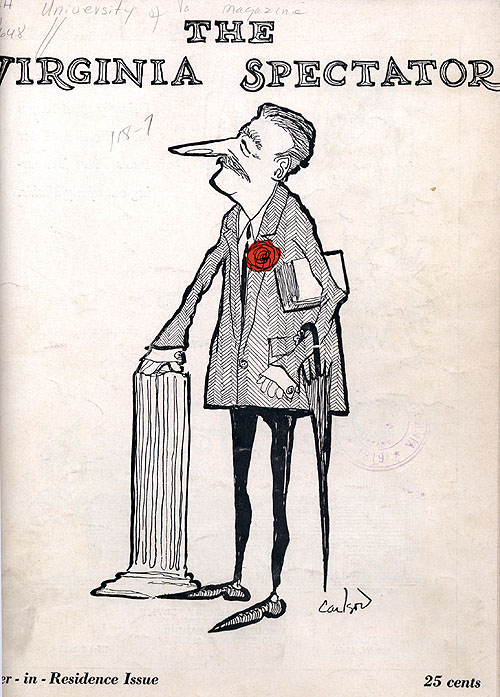
Below: "Acorn," from the "Writer-in-Residence Issue" of the Virginia Spectator monthly magazine (April 1957; vol. 118, no. 7, p. 6).
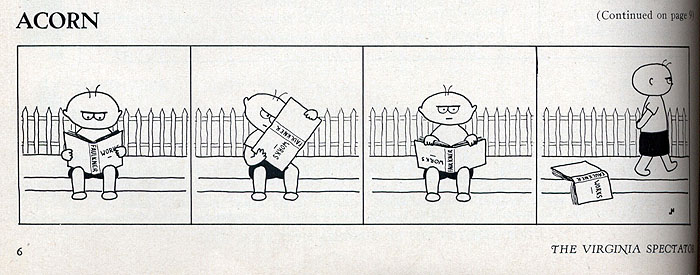
Below: Cartoon from the "Writer-in-Residence Issue" of the Virginia Spectator monthly magazine (April 1957; vol. 118, no. 7, p. 16).
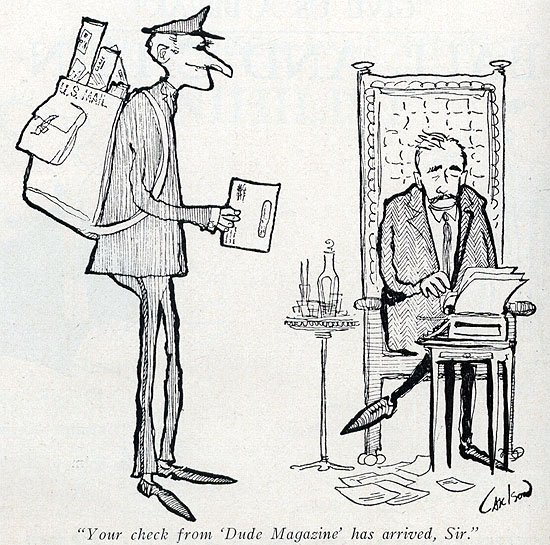
Below:"The Personality of William Faulkner," from the "Writer-in-Residence Issue" of the Virginia Spectator monthly magazine (April 1957; vol. 118, no. 7, p. 10).
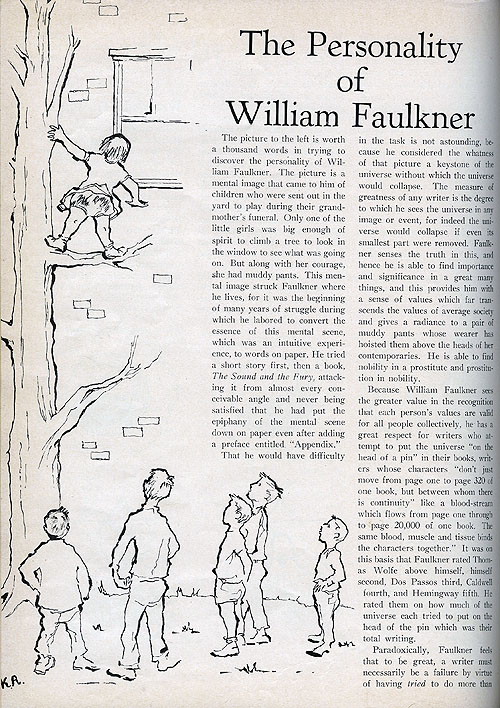
Below: "The Sound And The Flurry," from the "Writer-in-Residence Issue" of the Virginia Spectator monthly magazine (April 1957; vol. 118, no. 7, p. 12).
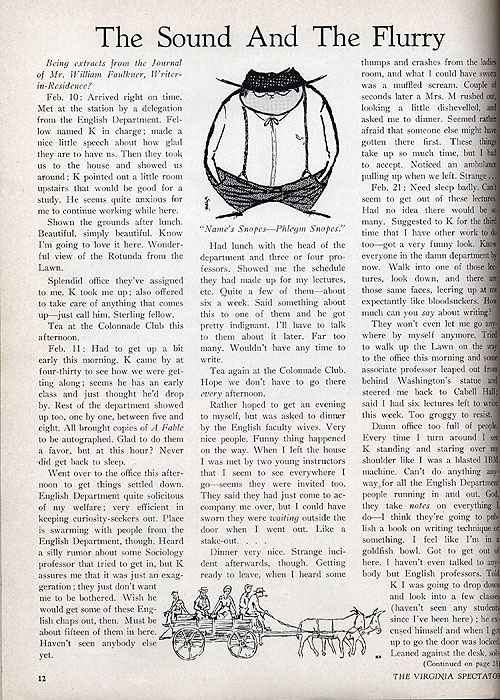
Below: "Views of a Writer-in-Residence," from the "Writer-in-Residence Issue" of the Virginia Spectator monthly magazine (April 1957; vol. 118, no. 7, p. 18).
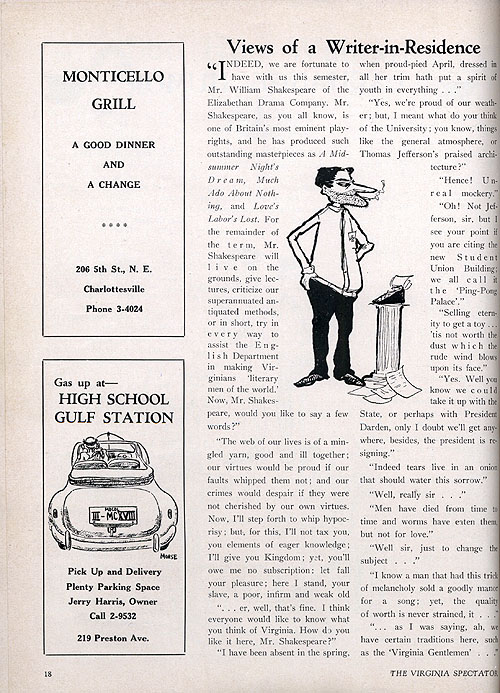
The Virginia Spectator Writer in Residence Issue (April 1957, vol. 118, no. 7, pp. 8-9)
Thorn For Edward
By Thomas Hawley
When Colonel Edward Carthington died, the whole neighborhood went to his funeral. The long procession made its way through the dirt and filth of the slum area of Brownsville, along the gutters of a civilization that God once created but did not now claim. The funeral was to be preached in the large seating capacity of the Pitkan Theatre. There the crowds had a whopping good time listening to the preacher say the last nice things about a man they knew little about through a public address system. All the pimps, bookies, cab drivers, barkeepers, prostitutes, and illegitimate children of Brownsville were there.
Bennie the Bookie and the old Chinese laundryman, Wrong Tool, silently wiped large tears from their eyes as the preacher continued to impress the population with his eloquence. Of all the people in the theater, Benny and Wrong Tool knew the Colonel best. They had been his steady tenants for the past twenty years at 505 Cabell Street.
After fifteen minutes of talk about the hereafter, Benny took out his scratch pad and silently began to pick the winners for the next race. Wrong Tool, his oriental face inscrutable, slipped his opium pipe from the folds of his dress and began to puff contentedly. After the funeral was over, they joined the large crowd that retired to "Beeler's" Bar for a last mug of warm beer in memory of the "Colonel."
Through the smoke and odors that filled the bar, a silent observer, by moving around in the crowd, could piece together the life of the Colonel since his arrival in Brownsville some twenty years earlier.
"Remember old Ben Carthington? You know – say you haven't been around here long have you? – he was a convict down in Mississippi and was told to build levees on the river and damn near drowned before he escaped and came north to drive a truck for the old Peepers Mob during prohibition . . . made quite a reputation ... years later retired, then willed that old tenant house at 505 Cabell to this guy from Jetterson County . . ."
Frequent oaths punctured the conversation and then an old woman who had spilled her beer across the front of an open dress was talking.
"He arrived early one afternoon . . . made quite a hit with the ladies, and there are some on this street . . . men didn't like him until he set the house up to whiskey here one night when he was drunk . . ."
Benny turned to Wrong Tool.
"Remember how he got that rep for being in the syndicate? Cops brung him home and no court . . . gave those kids those old dueling pistols with knots in the handles . . . wonder where those are now. . . . You goddam chink, pay tention to what I am sayin."
The story unfolded. After three years everyone on the block thought he was a boss of the syndicate. He took long walks at night after his wife ran out on him and never had trouble . . . no one would buck the syndicate.
"Remember the morning he fired those damn pistols out the window and said his wife had left him for that Dude magazine salesman and never to speak her name in his presence.
"Remember old Berty the prostitute. . .she swears he came to her room one night, right after his wife ran out, and wanted to tell her his life story. How his father was a 'road gang' boss down in Jetterson County and shacked up with this old southern gal. Yeah, never did marry according to Berty . . . years later they found his body in the house and there was one hell of a stink in Jetterson. The old gal had slipped arsenic into him and laid him away for years . . . that's southern aristocratic living for you. . . No one believed old Berty but it was a damn good story . . ."
Benny's mind wasn't on the death of the colonel. He was thinking about Edna Snopes. A pretty little girl, she had commanded the top price at fifteen. She later went into the call girl racket, then took to the needle. To Louisville for the cure and then returned to Brownsville. She and the Colonel had been seen together quite a bit before they slipped over the bridge and got married.
Benny knew the old Colonel had been happy with Edna. He knew, also, that Edna would never be tied to one man. (Benny had chased her out of his room one night.) He respected the Colonel and knew trouble was near when the Dude magazine salesman had stayed in town two weeks. Benny and Wrong Tool alone knew the salesman was the one who started Edna on the needle.
Benny and Wrong Tool had been happy when the Colonel had fired off those pistols and announced his wife's desertion. But the Colonel had remained in his apartment more and more after his wife had left him. He drank a lot and read copies of "Dude." Sent small kids across to Beeler's to get his bottle . . . and then he had died.
A lawyer had announced that the Colonel's will would be read tomorrow afternoon in the sitting room of the house. There was a great deal of speculation about the heirs, no one knew of any kin of the Colonel.
The morning the will was to read the heavens opened its gates and the rains of antiquity fell on Cabell Street. It seemed the gods were trying, with heavenly water, to wash the filth and dirt of the gutters into the river. A large crowd of people had filled the room.
Wrong Tool and Benny sat silently in the crowd. Everyone who had known the Colonel enough to expect some pittance from an unknown fortune was there.
The will was very simple. All his personal belongings would be Benny's and Wrong Tool's. He had willed his pistol to the local police station and had penciled in a note at the bottom of the will that someone clean up the back bedroom.
Three tear-stained old ladies of the neighborhood cleaned the colonel's apartment, throwing aside the numerous copies of "Dude" he had read faithfully every month. When they opened the door to the back bedroom, they screamed and recoiled. The odor of decayed flesh filled the apartment. The worn blanket that had prevented the wholesale escape of the odor fell over one of the women who fainted and lay quivering.
Two bodies lay across each other on the bed. The rotten flesh had worn away from the bones and tattered remains of clothing clung to the bones. A large, but neat bullet hole filled the forehead of Edna while the Dude magazine salesman had been shot over the left ear.
©1957 The University of Virginia
The Virginia Spectator Writer in Residence Issue (April 1957, vol. 118, no. 7, pp. 10-11, 28)
The Personality of William Faulkner
By William J. Powell
 The picture to the left is
worth a thousand words in trying to discover the personality of William Faulkner. The picture is a mental image that came to him of
children who were sent out in the yard to play during their grandmother's funeral. Only one of the little girls was big enough of
spirit to climb a tree to look in the window to see what was going on. But along with her courage, she had muddy pants. This mental
image struck Faulkner where he lives, for it was the beginning of many years of struggle during which he labored to convert the
essence of this mental scene, which was an intuitive experience, to words on paper. He tried a short story first, then a book, The
Sound and the Fury, attacking it from almost every conceivable angle and never being satisfied that he had put the epiphany
of the mental scene down on paper even after adding a preface entitled "Appendix."
The picture to the left is
worth a thousand words in trying to discover the personality of William Faulkner. The picture is a mental image that came to him of
children who were sent out in the yard to play during their grandmother's funeral. Only one of the little girls was big enough of
spirit to climb a tree to look in the window to see what was going on. But along with her courage, she had muddy pants. This mental
image struck Faulkner where he lives, for it was the beginning of many years of struggle during which he labored to convert the
essence of this mental scene, which was an intuitive experience, to words on paper. He tried a short story first, then a book, The
Sound and the Fury, attacking it from almost every conceivable angle and never being satisfied that he had put the epiphany
of the mental scene down on paper even after adding a preface entitled "Appendix."
That he would have difficulty in the task is not astounding, because he considered the whatness of that picture a keystone of the universe without which the universe would collapse. The measure of greatness of any writer is the degree to which he sees the universe in any image or event, for indeed the universe would collapse if even its smallest part were removed. Faulkner senses the truth in this, and hence he is able to find importance and significance in a great many things, and this provides him with a sense of values which far transcends the values of average society and gives a radiance to a pair of muddy pants whose wearer has hoisted them above the heads of her contemporaries. He is able to find nobility in a prostitute and prostitution in nobility.
Because William Faulkner sees the greater value in the recognition that each person's values are valid for all people collectively, he has a great respect for writers who attempt to put the universe "on the head of a pin" in their books, writers whose characters "don't just move from page one to page 320 of one book, but between whom there is continuity like a blood-stream which flows from page one through to page 20,000 of one book. The same blood, muscle and tissue binds the characters together." It was on this basis that Faulkner rated Thomas Wolfe above himself, himself second, Dos Passos third, Caldwell fourth, and Hemingway fifth. He rated them on how much of the universe each tried to put on the head of the pin which was their total writing.
Paradoxically, Faulkner feels that to be great, a writer must necessarily be a failure by virtue of having tried to do more than he was capable of doing. The higher the aim of the writer, the more glorious will be the failure, and the more glorious his failure, the more successful and great will be the writer, assuming that the writer tries his hardest to achieve his aim.
Implicit in this seemingly contradictory formula, however, is the assumption that the writer understands, in the unwritten and unwritable language of his soul, as much of the universe as he attempts to put in writing. What he must understand is not the word "universe," but the universe itself. Since the degree to which the universe is understood by a person is the same degree to which he has overcome prejudices of all varieties, it seems that Faulkner's test could be more simply stated : That the more prejudice that a writer overcomes, the greater his writing will be. This is essentially the personality of Faulkner : He has little prejudice.
For those who are interested, William Faulkner's hobbies are flying (a former member of the Canadian Flying Corps), supervising operations on his farm, hunting, guns, and dogs. He is said to have a courtly manner, addressing all males as "sir" and all females as either "ma'am," "wellum," "yessum," or "nome." He is usually dressed in flannels or tweeds from his taylor on Savile Row, London, wears a tyrol hat of brown color without goat whisker, smokes a pipe, has a blazer with an R.A.F. emblem on the pocket. He does not offer to go into things, but is receptive usually, when things come to him. He is known to be courteous and well mannered. He has a sense of humor which is sometimes misunderstood, but such misunderstandings do not perturb him as a rule. An example of this was the statement he made at a press conference in answer to the question, "Why did you accept the invitation of the Department of English to be a writer in residence at the University of Virginia?" Faulkner answered, "It was because I like your country. I like Virginia, and I like Virginians, because Virginians are snobs. A snob has to spend so much time being a snob that he has little left to meddle with you, and so it's pleasant here." Those who resented this statement were either snobs or people who did not realize that the press conference was relaxed, humorous, and even whimsical in tone. But all of these things are merely the garments of Faulkner's personality, however, and are analogous to the word "universe," as opposed to the universe itself. William Faulkner gives the impression of honesty and sincerity with himself as well as others, and has a dignity about him in spite of the occasional showing of muddy pants.
©1957 The University of Virginia
The Virginia Spectator Writer in Residence Issue (April 1957, vol. 118, no. 7, pp. 10-11, 28)
The Personality of William Faulkner
By William J. Powell
 The picture to the left is
worth a thousand words in trying to discover the personality of William Faulkner. The picture is a mental image that came to him of
children who were sent out in the yard to play during their grandmother's funeral. Only one of the little girls was big enough of
spirit to climb a tree to look in the window to see what was going on. But along with her courage, she had muddy pants. This mental
image struck Faulkner where he lives, for it was the beginning of many years of struggle during which he labored to convert the
essence of this mental scene, which was an intuitive experience, to words on paper. He tried a short story first, then a book, The
Sound and the Fury, attacking it from almost every conceivable angle and never being satisfied that he had put the epiphany
of the mental scene down on paper even after adding a preface entitled "Appendix."
The picture to the left is
worth a thousand words in trying to discover the personality of William Faulkner. The picture is a mental image that came to him of
children who were sent out in the yard to play during their grandmother's funeral. Only one of the little girls was big enough of
spirit to climb a tree to look in the window to see what was going on. But along with her courage, she had muddy pants. This mental
image struck Faulkner where he lives, for it was the beginning of many years of struggle during which he labored to convert the
essence of this mental scene, which was an intuitive experience, to words on paper. He tried a short story first, then a book, The
Sound and the Fury, attacking it from almost every conceivable angle and never being satisfied that he had put the epiphany
of the mental scene down on paper even after adding a preface entitled "Appendix."
That he would have difficulty in the task is not astounding, because he considered the whatness of that picture a keystone of the universe without which the universe would collapse. The measure of greatness of any writer is the degree to which he sees the universe in any image or event, for indeed the universe would collapse if even its smallest part were removed. Faulkner senses the truth in this, and hence he is able to find importance and significance in a great many things, and this provides him with a sense of values which far transcends the values of average society and gives a radiance to a pair of muddy pants whose wearer has hoisted them above the heads of her contemporaries. He is able to find nobility in a prostitute and prostitution in nobility.
Because William Faulkner sees the greater value in the recognition that each person's values are valid for all people collectively, he has a great respect for writers who attempt to put the universe "on the head of a pin" in their books, writers whose characters "don't just move from page one to page 320 of one book, but between whom there is continuity" like a blood-stream which flows from page one through to page 20,000 of one book. The same blood, muscle and tissue binds the characters together." It was on this basis that Faulkner rated Thomas Wolfe above himself, himself second, Dos Passos third, Caldwell fourth, and Hemingway fifth. He rated them on how much of the universe each tried to put on the head of the pin which was their total writing.
Paradoxically, Faulkner feels that to be great, a writer must necessarily be a failure by virtue of having tried to do more than he was capable of doing. The higher the aim of the writer, the more glorious will be the failure, and the more glorious his failure, the more successful and great will be the writer, assuming that the writer tries his hardest to achieve his aim.
Implicit in this seemingly contradictory formula, however, is the assumption that the writer understands, in the unwritten and unwritable language of his soul, as much of the universe as he attempts to put in writing. What he must understand is not the word "universe," but the universe itself. Since the degree to which the universe is understood by a person is the same degree to which he has overcome prejudices of all varieties, it seems that Faulkner's test could be more simply stated: That the more prejudice that a writer overcomes, the greater his writing will be. This is essentially the personality of Faulkner: He has little prejudice.
For those who are interested, William Faulkner's hobbies are flying (a former member of the Canadian Flying Corps), supervising operations on his farm, hunting, guns, and dogs. He is said to have a courtly manner, addressing all males as "sir" and all females as either "ma'am," "wellum," "yessum," or "nome." He is usually dressed in flannels or tweeds from his taylor on Savile Row, London, wears a tyrol hat of brown color without goat whisker, smokes a pipe, has a blazer with an R.A.F. emblem on the pocket. He does not offer to go into things, but is receptive usually, when things come to him. He is known to be courteous and well mannered. He has a sense of humor which is sometimes misunderstood, but such misunderstandings do not perturb him as a rule. An example of this was the statement he made at a press conference in answer to the question, "Why did you accept the invitation of the Department of English to be a writer in residence at the University of Virginia?" Faulkner answered, "It was because I like your country. I like Virginia, and I like Virginians, because Virginians are snobs. A snob has to spend so much time being a snob that he has little left to meddle with you, and so it's pleasant here." Those who resented this statement were either snobs or people who did not realize that the press conference was relaxed, humorous, and even whimsical in tone. But all of these things are merely the garments of Faulkner's personality, however, and are analogous to the word "universe," as opposed to the universe itself. William Faulkner gives the impression of honesty and sincerity with himself as well as others, and has a dignity about him in spite of the occasional showing of muddy pants.
©1957 The University of Virginia
The Virginia Spectator Writer in Residence Issue (April 1957, vol. 118, no. 7, pp. 12, 23-26)
The Sound And The Flurry
By "Carlos"
Being extracts from the Journal of Mr. William Faulkner, Writer-in-Residence?
Feb. 10: Arrived right on time. Met at the station by a delegation from the English Department. Fellow named K in charge; made a nice little speech about how glad they are to have us. Then they took us to the house and showed us around; K pointed out a little room upstairs that would be good for a study. He seems quite anxious for me to continue working while here.
Shown the grounds after lunch. Beautiful, simply beautiful. Know I'm going to love it here. Wonderful view of the Rotunda from the Lawn.
Splendid office they've assigned to me. K took me up; also offered to take care of anything that comes up – just call him. Sterling fellow.
Tea at the Colonnade Club this afternoon.
Feb. 11: Had to get up a bit early this morning. K came by at four-thirty to see how we were getting along; seems he has an early class and just thought he'd drop by. Rest of the department showed up too, one by one, between five and eight. All brought copies of A Fable to be autographed. Glad to do them a favor. But at this hour: Never did get back to sleep.
Went over to the office this afternoon to get things settled down. English Department quite solicitous of my welfare; very efficient in keeping curiosity-seekers out. Place is swarming with people from the English Department, though. Heard a silly rumor about some Sociology professor that tried to get in, but K assures me that it was just an exaggeration; they just don't want me to be bothered. Wish he would get some of these English chaps out, then. Must be about fifteen of them in here. Haven't seen anybody else yet.
Had lunch with the head of the department and three or four professors. Showed me the schedule they had made up for my lectures, etc. Quite a few of them – about six a week. Said something about this to one of them and he got pretty indignant. I'll have to talk to them about it later. Far too many. Wouldn't have any time to write.
Tea again at the Colonnade Club. Hope we don't have to go there every afternoon.
Rather hoped to get an evening to myself, but was asked to dinner by the English faculty wives. Very nice people. Funny thing happened on the way. When I left the house I was met by two young instructors that I seem to see everywhere I go – seems they were invited too. They said they had just come to accompany me over, but I could have sworn they were waiting outside the door when I went out. Like a stake-out. . . .
Dinner very nice. Strange incident afterwards, though. Getting ready to leave, when I heard some thumps and crashes from the ladies room, and what I could have sworn was a muffled scream. Couple of seconds later a Mrs. M rushed out, looking a little dishevelled, and asked me to dinner. Seemed rather afraid that someone else might have gotten there first. These things take up so much time, but I had to accept. Noticed an ambulance pulling up when we left. Strange. . .
Feb. 21: Need sleep badly. Can't seem to get out of these lectures. Had no idea there would be so many. Suggested to K for the third time that I have other work to do too – got a very funny look. Know everyone in the damn department by now. Walk into one of those lectures, look down, and there are those same faces, leering up at me expectantly like bloodsuckers. How much can you say about writing?
They won't even let me go anywhere by myself anymore. Tried to walk up the Lawn on the way to the office this morning and some associate professor jumped out from behind Washington's statue and steered me back to Cabell Hall; said I had six lectures left to write this week. Too groggy to resist.
Damn office too full of people. Every time I turn around I see K standing and staring over my shoulder like I was a blasted IBM machine. Can't do anything anyway for all the English Department people running in and out. God, they take notes on everything I do – I think they're going to publish a book on writing technique or something. I feel like I'm in a goldfish bowl. Got to get out of here. I haven't even talked to anybody but English professors. Told K I was going to drop down and look into a few classes (haven't seen any students since I've been here); he excused himself and when I got up to go the door was locked. Leaned against the desk, sobbing. Fell asleep. Would so like to get out once in a while.
These luncheons and dinners with the faculty getting me down. Wives always bruised or bandaged like they'd been in a fight. Learned that one of them I had dinner with that first night was taken to the hospital with a concussion and multiple fractures directly afterwards. You don't suppose . . .
Got up this morning to go to the bathroom and found K standing outside the little study; he saw me and started asking me why I didn't use it. How does he know I don't? (Haven't had time to write anything but lectures since I got here.) In fact, how the hell did he get into the house? Tried to get into the bathroom, but he grabbed me and began shouting, "Why? Why don't you write in there? You're a writer, aren't you?" Kneed him in the groin, ran into the bathroom and locked the door. Collapsed into the bathtub and fell asleep. God . . .!
Tea at the Colonnade Club again. Lord, how I hate tea. Almost vomited in Mrs. R's lap. Why can't I stay home? Too dangerous to try. They found me hiding in the coal bin yesterday at tea-time. Four husky young instructors. Doctor says it should heal in about a month.
March 4: Same two professors standing over the bed when I woke up. Never should have tried to get a message out by that student on the way to the office last week. Things are very desperate – I may crack soon. They even go to the toilet with me now. Can hear them prowling in the corridor outside my door at night, guarding me and looking for the first draft of a novel they think I have hidden. They're furious that I haven't written anything yet, but I never have time. Why don't they let me alone? Am so sleepy. Fell asleep giving the lecture yesterday; K rushed up angrily and slapped me awake and made me finish. Must get out. Heard about that Sociology professor – it was true. K threw him out of the window in the office next to mine. Five stories. Broke his neck. They won't let me see anyone. Wouldn't be surprised if that student is being followed now.
I was very foolish this afternoon. Tried to make a break for the car as they took me to lunch, but I was caught and beaten severely about the head and face. Was unconscious almost the whole way to Mrs. G's, where we ate. I looked almost as bad as Mrs. G. I understand she has won me for lunch for three days in a row now – almost killed professor F's wife. Makes no difference any more, though; I hardly know what I'm doing. Shame about Mrs. F – she made very good pies.
The lecture went very badly today. K stood behind me, as usual, with a blackjack. I was careful, though – he only hit me four times; mainly for losing the place. My mind wanders so. But I must carry on until I can escape.
Tea at the Colonnade Club, and I have learned to keep it down very well. Mrs. T strikes me each time I vomit; I have quite a good conditioned reflex now.
March 12: Nothing very important happened today, but I must be very careful to insert my pronouns and articles and things from now on – they have been reading the journal and punish me when they find grammatical errors. I'm slipping fast – must get out, or lose my mind completely. Perhaps I can smuggle this page out to someone, and get tickets for the next plane to Greece. I have friends there; they will hide me. Will try tonight. Chin up, old man.
©1957 The University of Virginia
The Virginia Spectator Writer in Residence Issue (April 1957, vol. 118, no. 7, pp. 12, 23-26)
The Sound And The Flurry
By "Carlos"
Being extracts from the Journal of Mr. William Faulkner, Writer-in-Residence?
Feb. 10: Arrived right on time. Met at the station by a delegation from the English Department. Fellow named K in charge; made a nice little speech about how glad they are to have us. Then they took us to the house and showed us around; K pointed out a little room upstairs that would be good for a study. He seems quite anxious for me to continue working while here.
Shown the grounds after lunch. Beautiful, simply beautiful. Know I'm going to love it here. Wonderful view of the Rotunda from the Lawn.
Splendid office they've assigned to me. K took me up; also offered to take care of anything that comes up – just call him. Sterling fellow.
Tea at the Colonnade Club this afternoon.
Feb. 11: Had to get up a bit early this morning. K came by at four-thirty to see how we were getting along; seems he has an early class and just thought he'd drop by. Rest of the department showed up too, one by one, between five and eight. All brought copies of A Fable to be autographed. Glad to do them a favor. But at this hour: Never did get back to sleep.
Went over to the office this afternoon to get things settled down. English Department quite solicitous of my welfare; very efficient in keeping curiosity-seekers out. Place is swarming with people from the English Department, though. Heard a silly rumor about some Sociology professor that tried to get in, but K assures me that it was just an exaggeration; they just don't want me to be bothered. Wish he would get some of these English chaps out, then. Must be about fifteen of them in here. Haven't seen anybody else yet.
Had lunch with the head of the department and three or four professors. Showed me the schedule they had made up for my lectures, etc. Quite a few of them – about six a week. Said something about this to one of them and he got pretty indignant. I'll have to talk to them about it later. Far too many. Wouldn't have any time to write.
Tea again at the Colonnade Club. Hope we don't have to go there every afternoon.
Rather hoped to get an evening to myself, but was asked to dinner by the English faculty wives. Very nice people. Funny thing happened on the way. When I left the house I was met by two young instructors that I seem to see everywhere I go – seems they were invited too. They said they had just come to accompany me over, but I could have sworn they were waiting outside the door when I went out. Like a stake-out. . . .
Dinner very nice. Strange incident afterwards, though. Getting ready to leave, when I heard some thumps and crashes from the ladies room, and what I could have sworn was a muffled scream. Couple of seconds later a Mrs. M rushed out, looking a little dishevelled, and asked me to dinner. Seemed rather afraid that someone else might have gotten there first. These things take up so much time, but I had to accept. Noticed an ambulance pulling up when we left. Strange. . .
Feb. 21: Need sleep badly. Can't seem to get out of these lectures. Had no idea there would be so many. Suggested to K for the third time that I have other work to do too – got a very funny look. Know everyone in the damn department by now. Walk into one of those lectures, look down, and there are those same faces, leering up at me expectantly like bloodsuckers. How much can you say about writing?
They won't even let me go anywhere by myself anymore. Tried to walk up the Lawn on the way to the office this morning and some associate professor jumped out from behind Washington's statue and steered me back to Cabell Hall; said I had six lectures left to write this week. Too groggy to resist.
Damn office too full of people. Every time I turn around I see K standing and staring over my shoulder like I was a blasted IBM machine. Can't do anything anyway for all the English Department people running in and out. God, they take notes on everything I do – I think they're going to publish a book on writing technique or something. I feel like I'm in a goldfish bowl. Got to get out of here. I haven't even talked to anybody but English professors. Told K I was going to drop down and look into a few classes (haven't seen any students since I've been here); he excused himself and when I got up to go the door was locked. Leaned against the desk, sobbing. Fell asleep. Would so like to get out once in a while.
These luncheons and dinners with the faculty getting me down. Wives always bruised or bandaged like they'd been in a fight. Learned that one of them I had dinner with that first night was taken to the hospital with a concussion and multiple fractures directly afterwards. You don't suppose . . .
Got up this morning to go to the bathroom and found K standing outside the little study; he saw me and started asking me why I didn't use it. How does he know I don't? (Haven't had time to write anything but lectures since I got here.) In fact, how the hell did he get into the house? Tried to get into the bathroom, but he grabbed me and began shouting, "Why? Why don't you write in there? You're a writer, aren't you?" Kneed him in the groin, ran into the bathroom and locked the door. Collapsed into the bathtub and fell asleep. God . . .!
Tea at the Colonnade Club again. Lord, how I hate tea. Almost vomited in Mrs. R's lap. Why can't I stay home? Too dangerous to try. They found me hiding in the coal bin yesterday at tea-time. Four husky young instructors. Doctor says it should heal in about a month.
March 4: Same two professors standing over the bed when I woke up. Never should have tried to get a message out by that student on the way to the office last week. Things are very desperate – I may crack soon. They even go to the toilet with me now. Can hear them prowling in the corridor outside my door at night, guarding me and looking for the first draft of a novel they think I have hidden. They're furious that I haven't written anything yet, but I never have time. Why don't they let me alone? Am so sleepy. Fell asleep giving the lecture yesterday; K rushed up angrily and slapped me awake and made me finish. Must get out. Heard about that Sociology professor – it was true. K threw him out of the window in the office next to mine. Five stories. Broke his neck. They won't let me see anyone. Wouldn't be surprised if that student is being followed now.
I was very foolish this afternoon. Tried to make a break for the car as they took me to lunch, but I was caught and beaten severely about the head and face. Was unconscious almost the whole way to Mrs. G's, where we ate. I looked almost as bad as Mrs. G. I understand she has won me for lunch for three days in a row now – almost killed professor F's wife. Makes no difference any more, though; I hardly know what I'm doing. Shame about Mrs. F – she made very good pies.
The lecture went very badly today. K stood behind me, as usual, with a blackjack. I was careful, though – he only hit me four times; mainly for losing the place. My mind wanders so. But I must carry on until I can escape.
Tea at the Colonnade Club, and I have learned to keep it down very well. Mrs. T strikes me each time I vomit; I have quite a good conditioned reflex now.
March 12: Nothing very important happened today, but I must be very careful to insert my pronouns and articles and things from now on – they have been reading the journal and punish me when they find grammatical errors. I'm slipping fast – must get out, or lose my mind completely. Perhaps I can smuggle this page out to someone, and get tickets for the next plane to Greece. I have friends there; they will hide me. Will try tonight. Chin up, old man.
©1957 The University of Virginia
The Virginia Spectator Writer in Residence Issue (April 1957, vol. 118, no. 7, pp. 18-19)
Views of a Writer-in-Residence
By "Pablo"
"INDEED, we are fortunate to have with us this semester, Mr. William Shakespeare of the Elizabethan Drama Company. Mr. Shakespeare, as you all know, is one of Britain's most eminent playwrights, and he has produced such outstanding masterpieces as A Midsummer Night's Dream, Much Ado About Nothing, and Love's Labor's Lost. For the remainder of the term, Mr. Shakespeare will live on the grounds, give lectures, criticize our superannuated antiquated methods, or in short, try in every way to assist the English Department in making Virginians 'literary men of the world.' Mr. Shakespeare, would you like to say a few words?"
"The web of our lives is of a mingled yarn, good and ill together; our virtues would be proud if our faults whipped them not; and our crimes would despair if they were not cherished by our own virtues. Now, I'll step forth to whip hypocrisy; but, for this, I'll not tax you, you elements of eager knowledge; I'll give you Kingdom; yet, you'll owe me no subscription: let fall your pleasure; here I stand, your slave, a poor, infirm and weak old — "
". . .er, well, that's fine. I think everyone would like to know what you think of Virginia. How do you like it here, Mr. Shakespeare?"
"I have been absent in the spring, when proud-pied April, dressed in all her trim hath put a spirit of youth in everything. . ."
"Yes, we're proud of our weather; but, I meant what do you think of the University; you know, things like the general atmosphere, or Thomas Jefferson's praised architecture?"
"Hence! Unreal mockery."
"Oh! Not Jefferson, sir, but I see your point if you are citing the new Student Union Building; we call it the 'Ping-Pong Palace'."
"Selling eternity to get a toy. . .'tis not worth the dust which the rude wind blows upon its face."
"Yes. well you know we could take it up with the State, or perhaps with President Darden, only I doubt we'll get anywhere, besides, the president is resigning."
"Indeed tears live in an onion that should water this sorrow."
"Well, really sir. . ."
"Men have died from time to time and worms have eaten them, but not for love."
"Well sir, just to change the subject. . ."
"I know a man that had this trick of melancholy sold a goodly manor for a song; yet, the quality of worth is never strained, it. . ."
". . .as I was saying, ah, we have certain traditions here, such as the 'Virginia Gentlemen'. . ."
"Me thinks conceit is weakest bodies strongest works, but I dare damnation. To hell allegiance! Vows to the blackest devil conscience and grace. You, sir, I entertain for one of my honour, only I do not like the fashion of your garments, you will say they are collegiate attire, but let them be changed . . ."
"That I guess is just a differing in opinion, at any rate I would like to thank you, and I realize . . ."
"The times have changed, they have been that when the brains were out, man would die, and there an end, but now you rise again."
"On behalf of the faculty and the student body, we hope Mr. Shakespeare, that you enjoy living and working with us this semester."
"'Tis sweating labour to bear, idleness so near the heart . . . yet, sufferance is the badge of all our tribe. If this be error, the upon me proved, I never writ nor . . . hell ! You Virginians art snobs." (Exeunt)
©1957 The University of Virginia
The Virginia Spectator Writer in Residence Issue (April 1957, vol. 118, no. 7, pp. 18-19)
Views of a Writer-in-Residence
By "Pablo"
"INDEED, we are fortunate to have with us this semester, Mr. William Shakespeare of the Elizabethan Drama Company. Mr. Shakespeare, as you all know, is one of Britain's most eminent playwrights, and he has produced such outstanding masterpieces as A Midsummer Night's Dream, Much Ado About Nothing, and Love's Labor's Lost. For the remainder of the term, Mr. Shakespeare will live on the grounds, give lectures, criticize our superannuated antiquated methods, or in short, try in every way to assist the English Department in making Virginians 'literary men of the world.' Mr. Shakespeare, would you like to say a few words?"
"The web of our lives is of a mingled yarn, good and ill together; our virtues would be proud if our faults whipped them not; and our crimes would despair if they were not cherished by our own virtues. Now, I'll step forth to whip hypocrisy; but, for this, I'll not tax you, you elements of eager knowledge; I'll give you Kingdom; yet, you'll owe me no subscription: let fall your pleasure; here I stand, your slave, a poor, infirm and weak old — "
". . .er, well, that's fine. I think everyone would like to know what you think of Virginia. How do you like it here, Mr. Shakespeare?"
"I have been absent in the spring, when proud-pied April, dressed in all her trim hath put a spirit of youth in everything. . ."
"Yes, we're proud of our weather; but, I meant what do you think of the University; you know, things like the general atmosphere, or Thomas Jefferson's praised architecture?"
"Hence! Unreal mockery."
"Oh! Not Jefferson, sir, but I see your point if you are citing the new Student Union Building; we call it the 'Ping-Pong Palace'."
"Selling eternity to get a toy. . .'tis not worth the dust which the rude wind blows upon its face."
"Yes. well you know we could take it up with the State, or perhaps with President Darden, only I doubt we'll get anywhere, besides, the president is resigning."
"Indeed tears live in an onion that should water this sorrow."
"Well, really sir. . ."
"Men have died from time to time and worms have eaten them, but not for love."
"Well sir, just to change the subject. . ."
"I know a man that had this trick of melancholy sold a goodly manor for a song; yet, the quality of worth is never strained, it. . ."
". . .as I was saying, ah, we have certain traditions here, such as the 'Virginia Gentlemen'. . ."
"Me thinks conceit is weakest bodies strongest works, but I dare damnation. To hell allegiance! Vows to the blackest devil conscience and grace. You, sir, I entertain for one of my honour, only I do not like the fashion of your garments, you will say they are collegiate attire, but let them be changed . . ."
"That I guess is just a differing in opinion, at any rate I would like to thank you, and I realize . . ."
"The times have changed, they have been that when the brains were out, man would die, and there an end, but now you rise again."
"On behalf of the faculty and the student body, we hope Mr. Shakespeare, that you enjoy living and working with us this semester."
"'Tis sweating labour to bear, idleness so near the heart . . . yet, sufferance is the badge of all our tribe. If this be error, the upon me proved, I never writ nor . . . hell ! You Virginians art snobs." (Exeunt)
©1957 The University of Virginia
Below: William Faulkner on the Lawn at the University of Virginia, 15 February 1957 – his first day as Writer-in-Residence. Photograph by Ralph Thompson. [Digitization #000004470_0002]

Below: William Faulkner on the Lawn at the University of Virginia, 15 February 1957. Photograph by Ralph Thompson. [Digitization #000004470_0012]
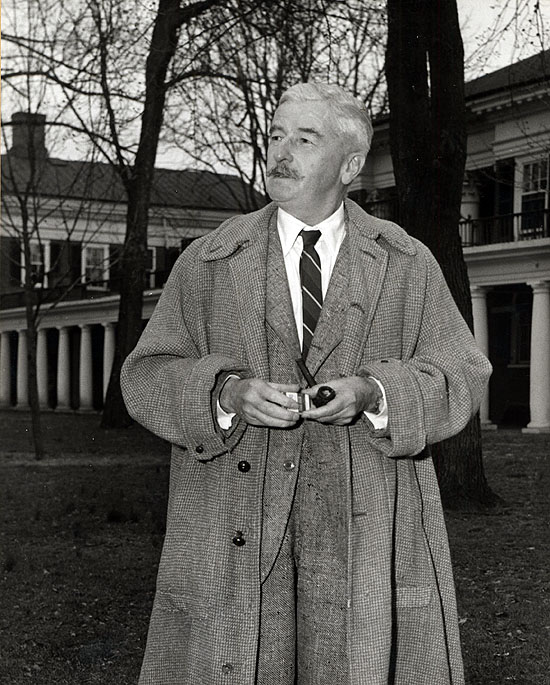
Below: William Faulkner in a Cabell Hall classroom at the University of Virginia, probably February 1957. Photograph by Ralph Thompson. [Digitization #000004470_0003]
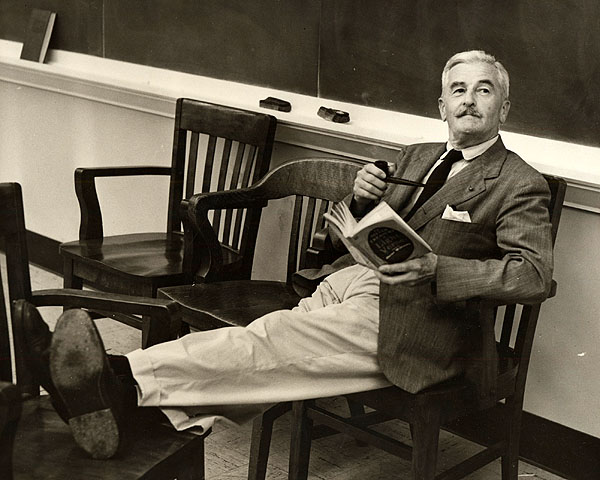
Below: William Faulkner in a Cabell Hall classroom at the University of Virginia, probably February 1957. Photograph by Ralph Thompson. [Digitization #000004470_0014]
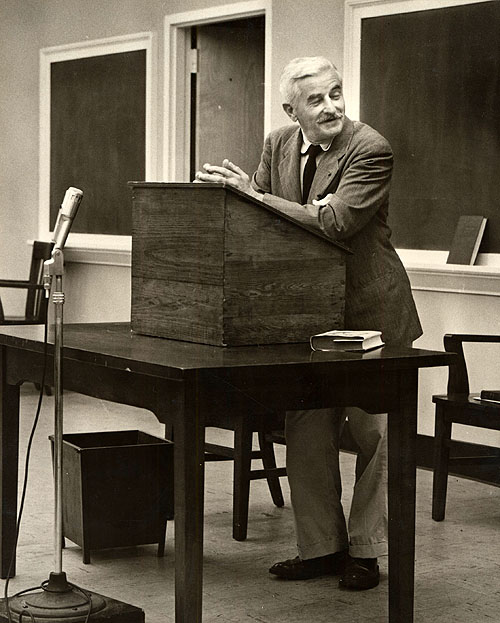
Below: William Faulkner in a Cabell Hall classroom at the University of Virginia, probably February 1957. Photograph by Ralph Thompson. [Digitization #000004470_0019]
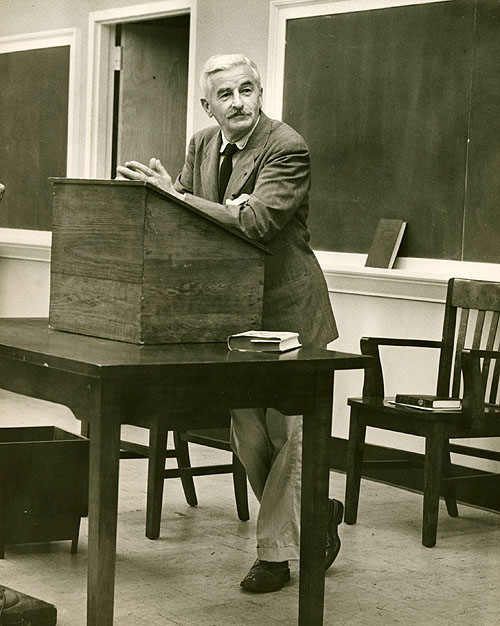
Below: William Faulkner in a Cabell Hall classroom at the University of Virginia, probably February 1957. Photograph by Ralph Thompson. [Digitization #000004470_0015]

Below: William Faulkner in a Cabell Hall classroom at the University of Virginia, probably February 1957. Photograph by Ralph Thompson. [Digitization #000004470_0023]
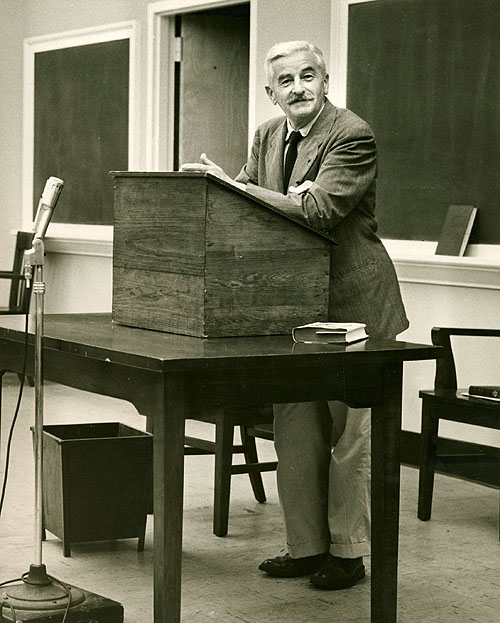
Below: William Faulkner in a Cabell Hall classroom at the University of Virginia, probably February 1957. Photograph by Ralph Thompson. [Digitization #000004470_0020]
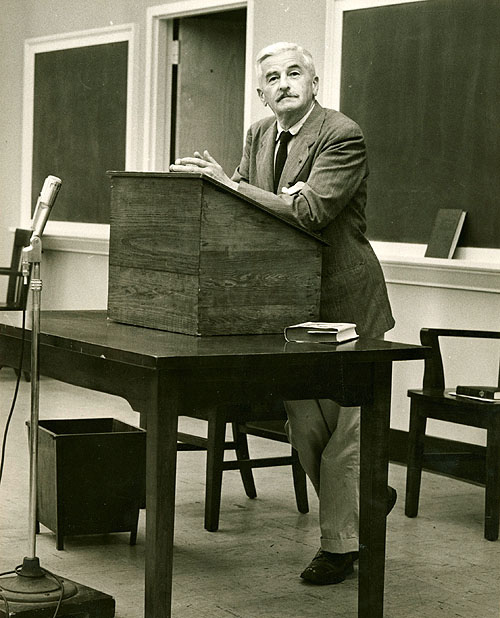
Below: William Faulkner in a Cabell Hall classroom at the University of Virginia, probably February 1957. Photograph by Ralph Thompson. [Digitization #000004470_0022]
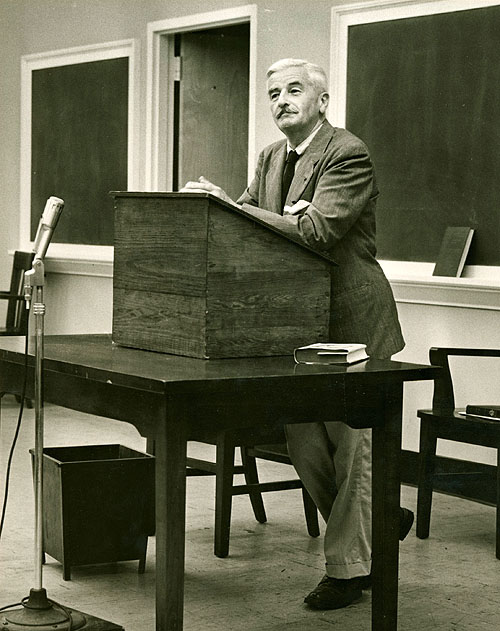
Below: William Faulkner in a Cabell Hall classroom at the University of Virginia, probably February 1957. Photograph by Ralph Thompson. [Digitization #000004470_0016]
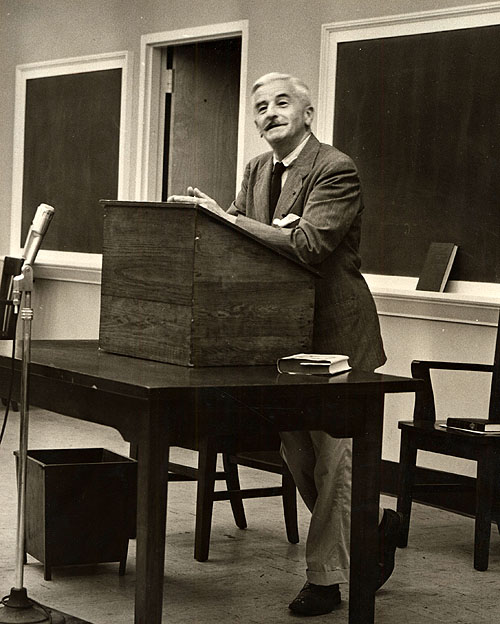
Below: William Faulkner in a Cabell Hall classroom at the University of Virginia, probably February 1957. Photograph by Ralph Thompson. [Digitization #000004470_0021]
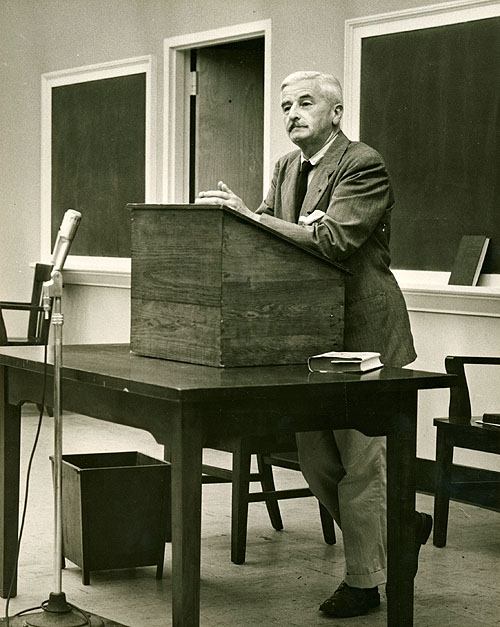
Below: William Faulkner in a Cabell Hall classroom at the University of Virginia, probably February 1957. Photograph by Ralph Thompson. [Digitization #000004470_0018]
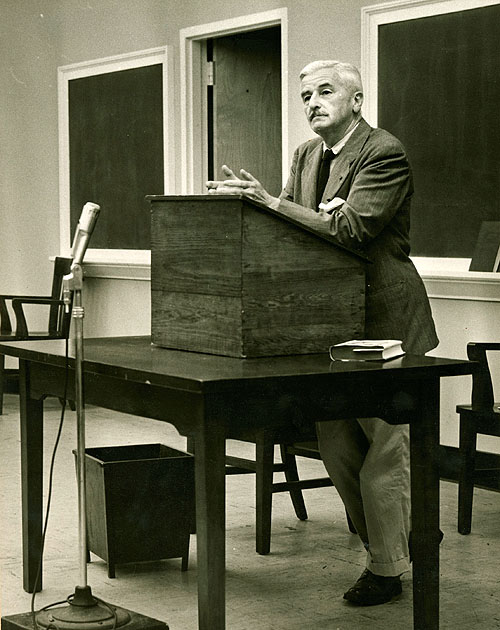
Below: Photo by Ralph Thompson of Faulkner in Cabell Hall with unidentified students (undated but c1957) [Print# 0189; Digitization# 000005733_0015].

Below: Photo by Ralph Thompson of Faulkner at UVA track meet; student beside hurdles across the track is John Church (undated but c1957). [Print# 0143; Digitization# 000005732_0017].
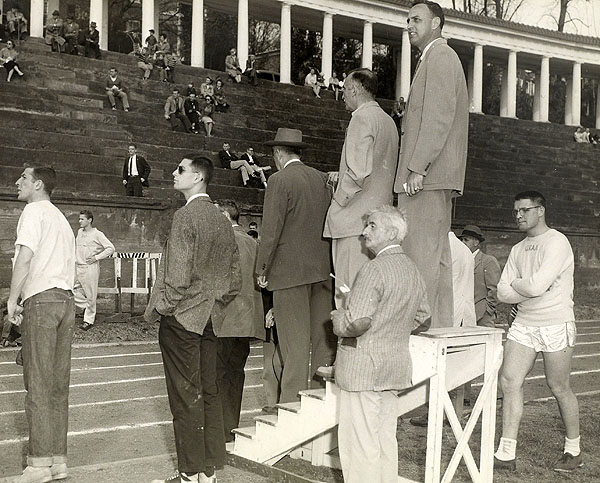
Below: Photo by Ralph Thompson of Faulkner at UVA track meet; Joseph Blotner, holding one end of the finish line, can be seen next to the unidentified runner (undated but c1957). [Print# 0146; Digitization# 000005732_0019].
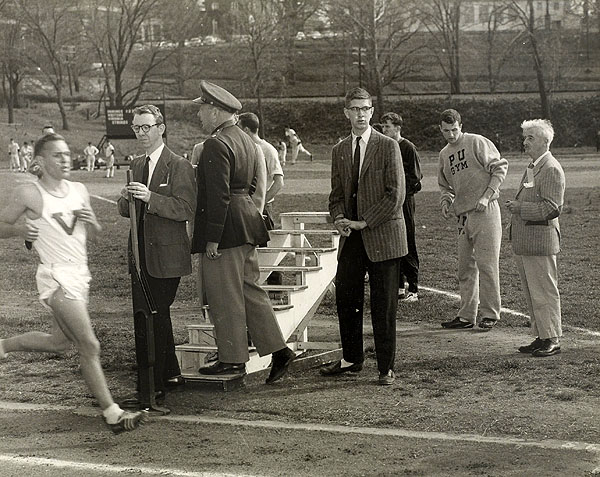
Below: Photo by Ralph Thompson of Faulkner with Joseph Blotner, UVA football coach Ben Martin and an unidentified student (undated but c1957). [Print# 0147; Digitization# 000005732_0021].
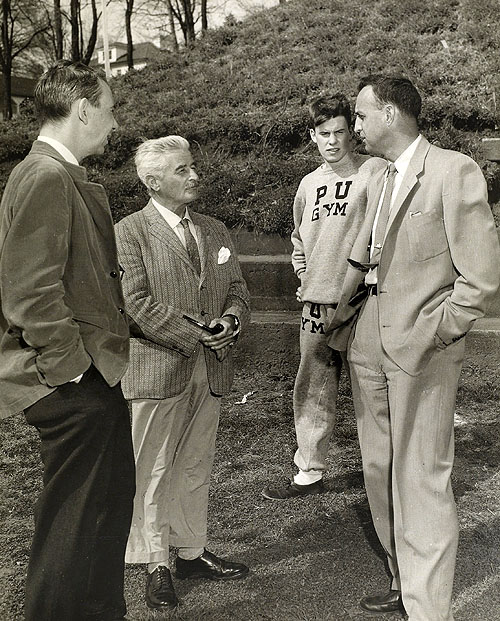
Below: William Faulkner with two unidentified University of Virginia students, 1957 or 1958. Photograph by Ralph Thompson. [Digitization #000004470_0013]
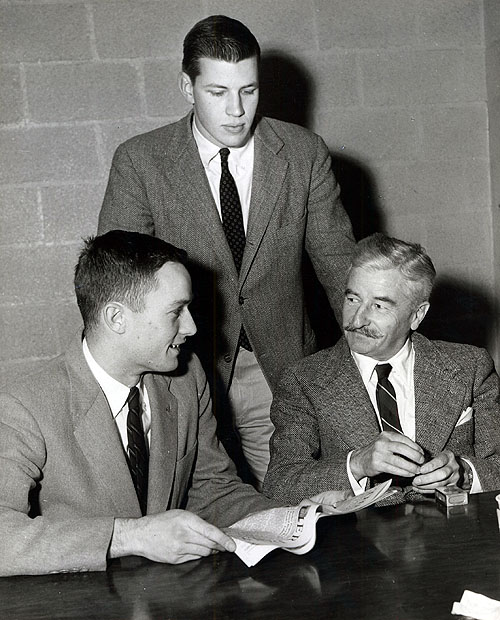
Below: William Faulkner in Cabell Hall radio "studio" at the University of Virginia, probably for taping of "What's the Good Word" program with Edward Stevenson's class, 6 May 1958. Photograph by Ralph Thompson. [Digitization #000004470_0004]
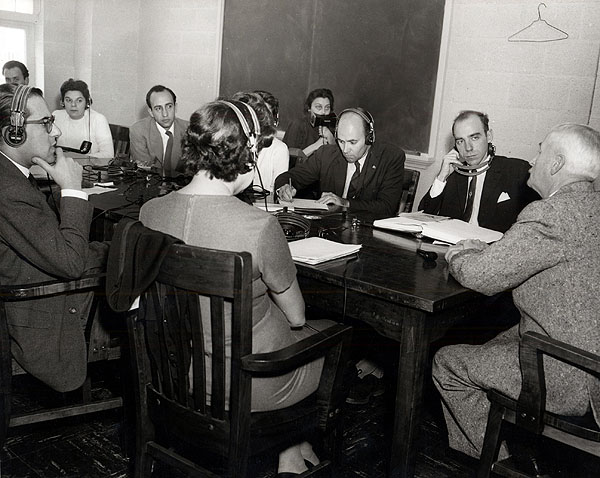
Below: Photo by Ralph Thompson of Faulkner in Cabell Hall with Joseph Blotner (center) and Frederick Gwynn (undated but c1957). [Print# 0164; Digitization# 000005733_0007].
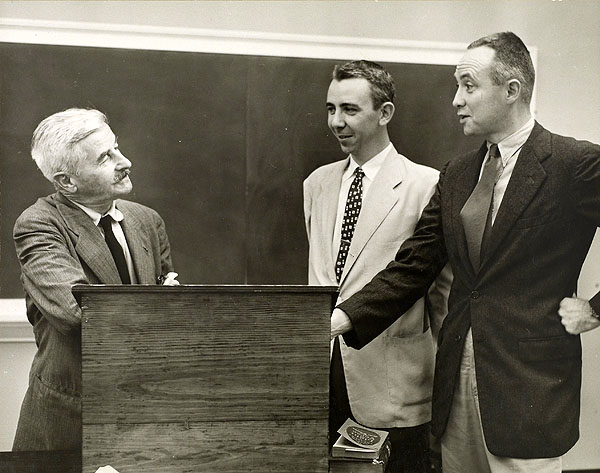
Below: Photo by Ralph Thompson of Faulkner with unidentified women (undated but c1957). [Print# 0168; Digitization# 000005733_0015].
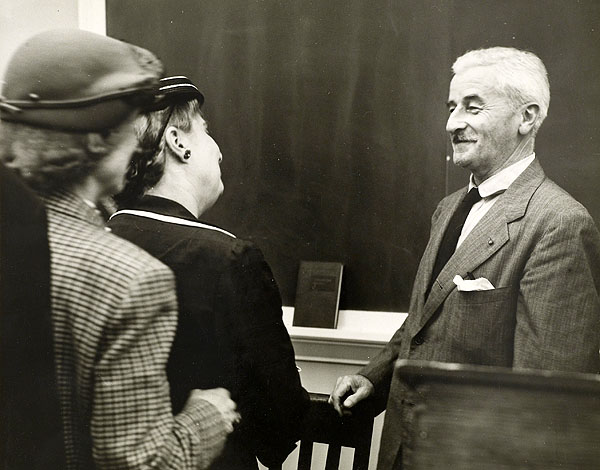
Below: Photo by Ralph Thompson of Faulkner in Rouss Hall with unidentified students (undated but c1957). [Print# 0186; Digitization# 000005733_0011].
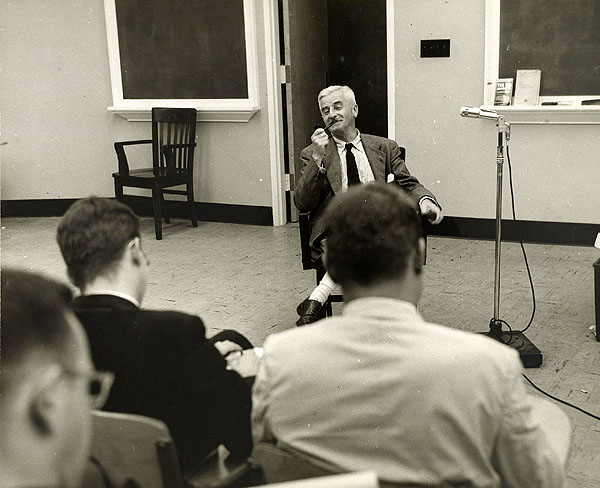
Below: Photo by Ralph Thompson of Faulkner in Rouss Hall (undated but c1957). [Print# 0196; Digitization# 000005733_0019].
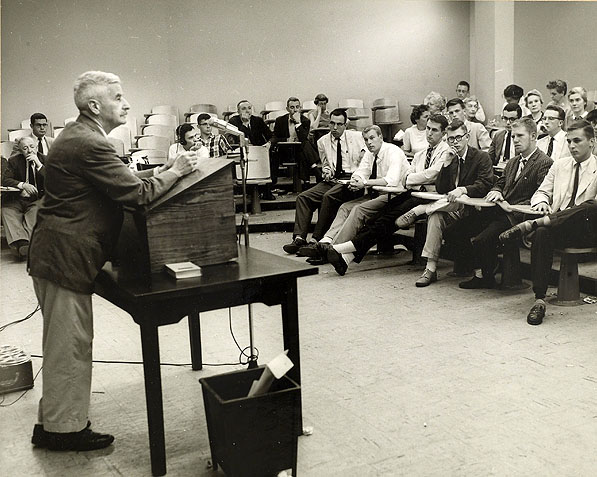
Below: Photo by Ralph Thompson of Faulkner in Rouss Hall (undated but c1957). [Print# 0191; Digitization# 000005733_0017].

Below: Photo by Ralph Thompson of Faulkner in Rouss Hall [Print# 0218]. Note woman in front row with fan. Faulkner called this windowless classroom, where most of his UVA sessions took place, "the black hole of Calcutta" because it was so hot.

Below: Photo by Ralph Thompson of Faulkner at UVA [Print# 0201]. The book beside him is his Collected Stories.
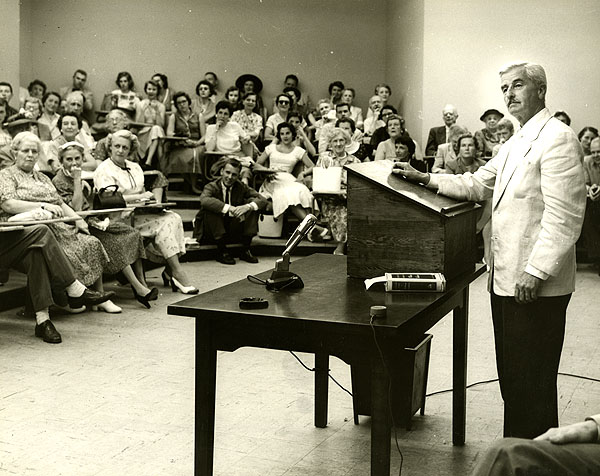
Below: Photo by Ralph Thompson of Faulkner in Rouss Hall with (left to right) Joseph Blotner, Frederick Gwynn, unidentified man. Caption on back: "May 15 [1957] after meeting with the public. Photo by Ralph Thompson." [Print# 0166; Digitization# 000005733_0009].

Below: William Faulkner with University of Virginia students in 202 Rouss Hall, Spring 1957. Photograph by Ralph Thompson. [Digitization #000004470_0017]
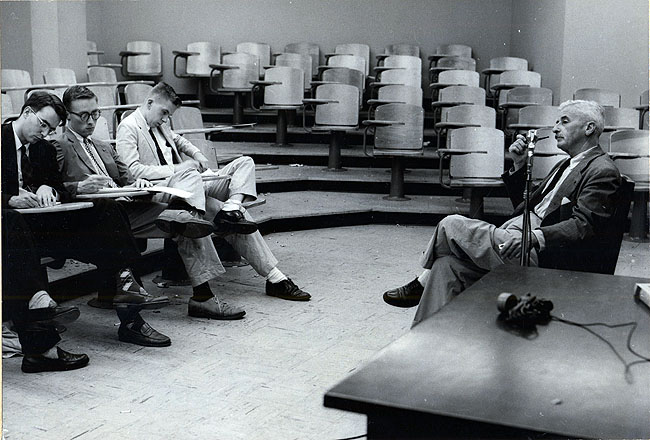
Below: William Faulkner with University of Virginia students in 202 Rouss Hall, Spring 1957. Photograph by Ralph Thompson. [Digitization #000004470_0024]
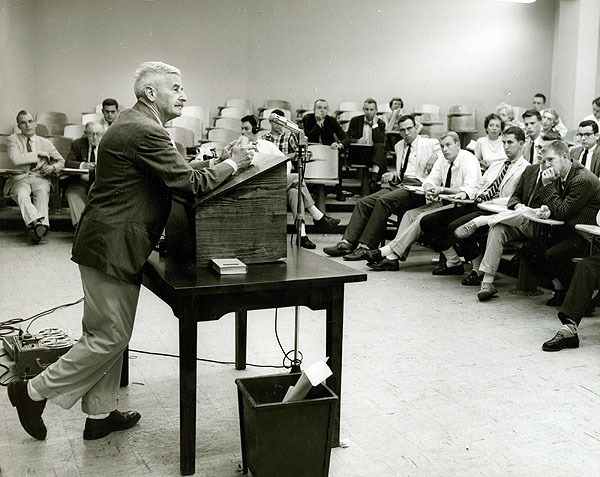
Below: William Faulkner with townspeople in 202 Rouss Hall, University of Virginia, Spring 1957. Photograph by Ralph Thompson. [Digitization #000004470_0028]

Below: William Faulkner with townspeople in 202 Rouss Hall, University of Virginia, Spring 1957. Photograph by Ralph Thompson. [Digitization #000004470_0025]
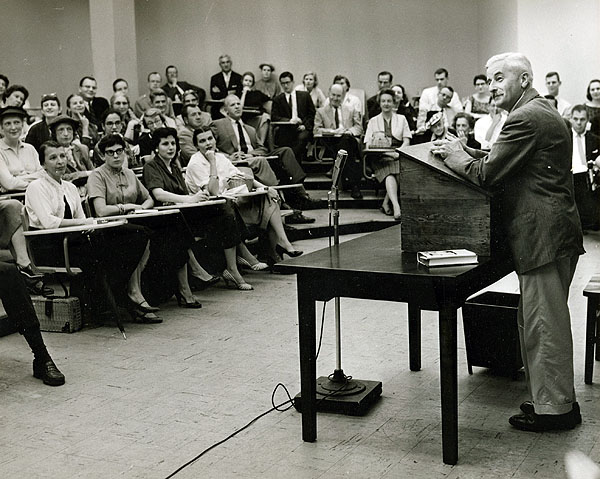
Below: Photo by Ralph Thompson of Faulkner with Frederick Gwynn (undated but c1957). [Print# 0133; Digitization# 000005732_0007].
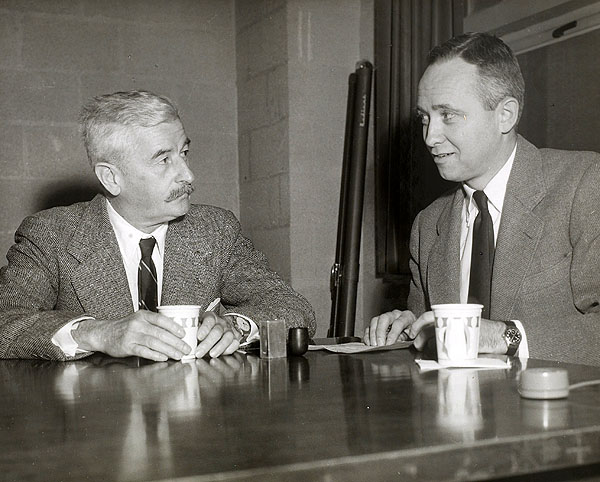
Below: Photo by Ralph Thompson of Faulkner at UVA (20 February 1957). [Print# 0131; Digitization# 000005732_0005].
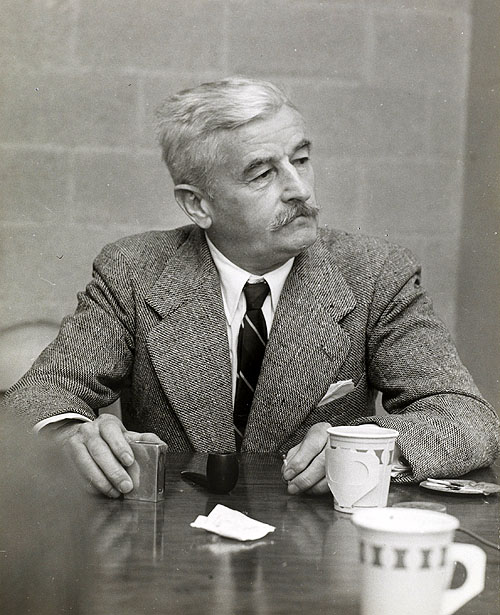
Below: Photo by Ralph Thompson of Faulkner. Caption on back: "Faulkner at U of VA, 20 February 1957. Ralph Thompson photo." [Print# 0129; Digitization# 000005732_0003].
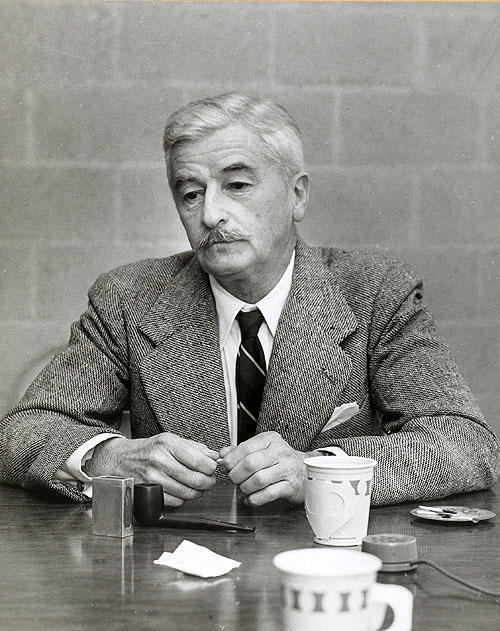
Below: Photo by Ralph Thompson of Faulkner at UVA (20 February 1957). [Print# 0126; Digitization# 000005732_0001].
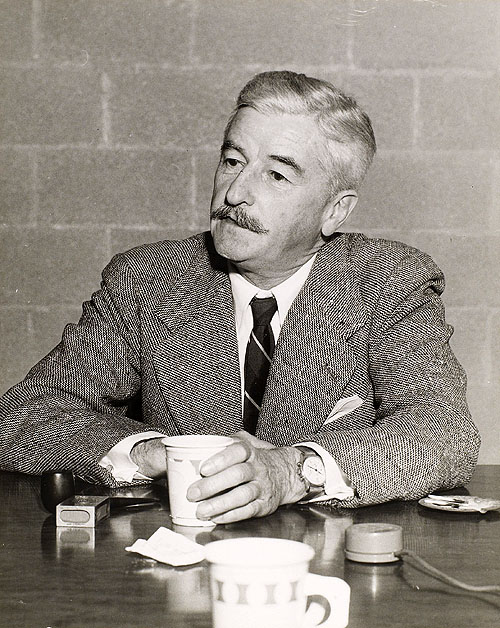
Below: Photo by Ralph Thompson of Faulkner beside South Lawn at UVA. Caption on back: "Faulkner at U of VA circa 1960. Photo by Ralph Thompson." [Print# 0186; Digitization# 000005733_0013].
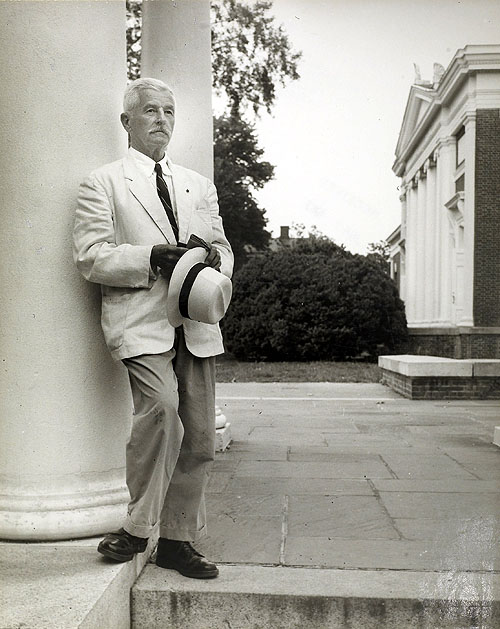
Below: Photo by Dean Cadle of Faulkner with Joseph Blotner beside South Lawn at UVA (May 1962). [Print# 0137; Digitization# 000005732_0011].
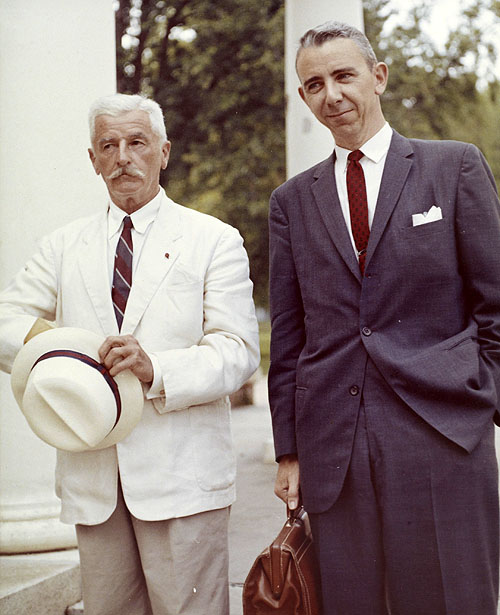
Below: Photo by Dean Cadle of Faulkner beside South Lawn at UVA (May 1962). [Print# 0140; Digitization# 000005732_0015].
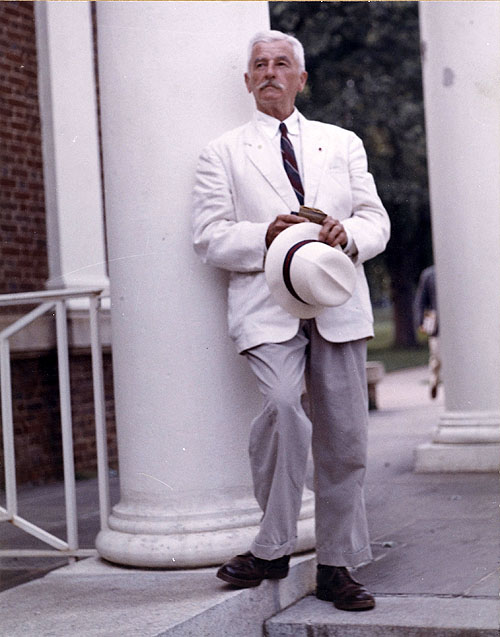
Below: Photo by Rip Payne of Faulkner at lecture before English Club, McGregor Room, Alderman Library, 25 May 1960.
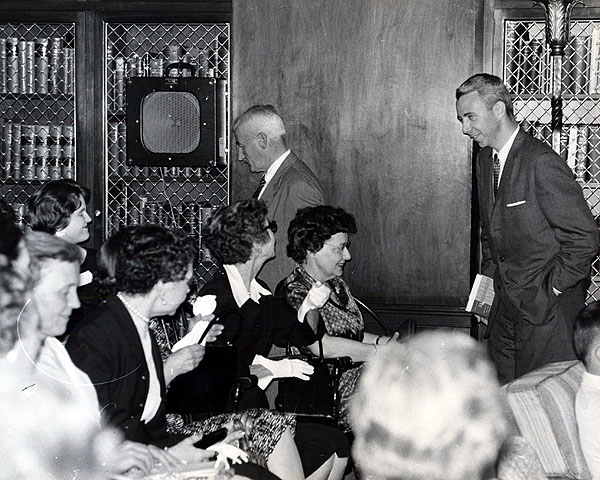
Below: Photo by Rip Payne of Faulkner at lecture before English Club, McGregor Room, Alderman Library, 25 May 1960.
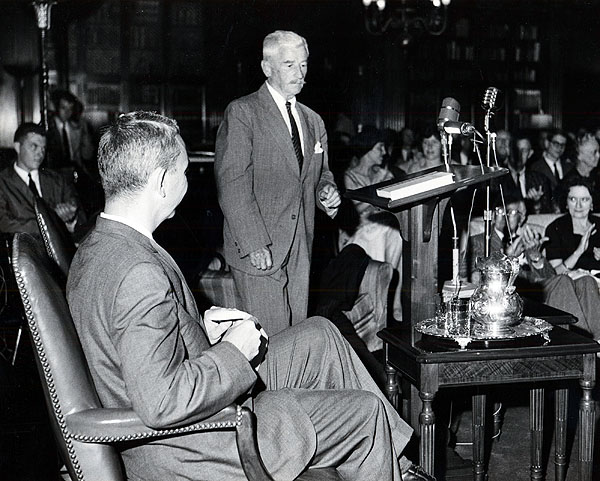
Below: Photo by Rip Payne of Faulkner at lecture before English Club, McGregor Room, Alderman Library, 25 May 1960.
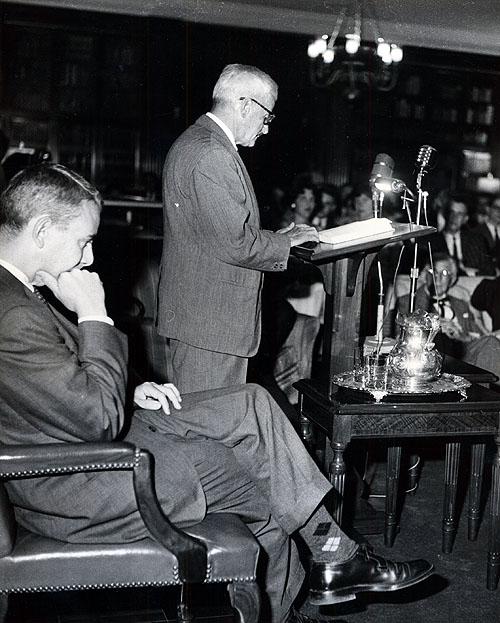
Below: Photo by Rip Payne of Faulkner in Alderman Library. Caption on back: "U of Va. Lecture before English Club, McGregor Room - Library. May 25, 1960." [Print# 0151; Digitization# 000005733_0001].
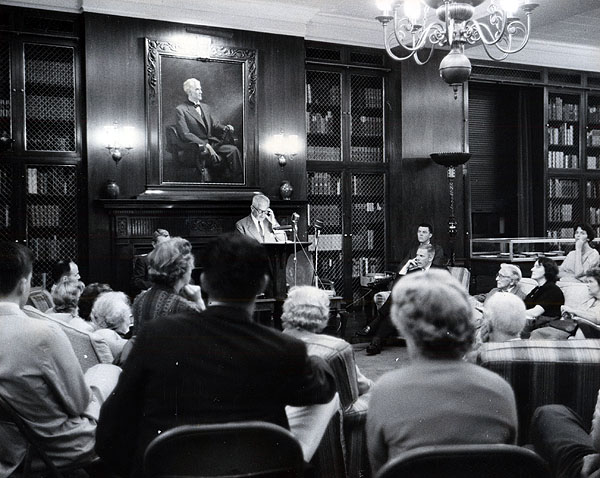
Below: Photo by Rip Payne of Faulkner in Alderman Library, with Joseph Blotner seated to his right. Caption on back: "McGregor Room Lecture. May 26, 1961." [Print# 0155; Digitization# 000005733_0003].
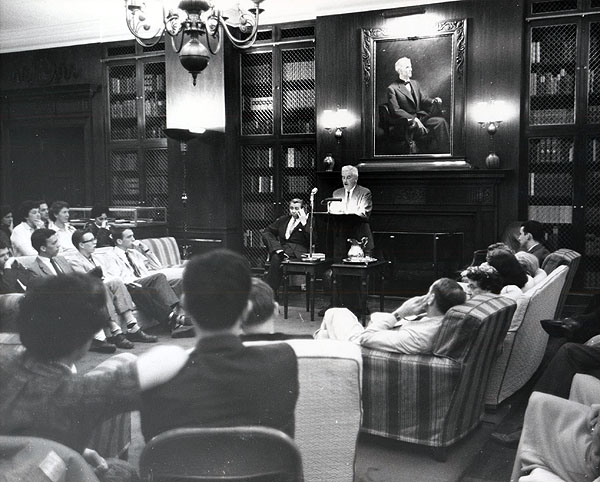
Below: Photo by Rip Payne of Faulkner in Alderman Library, with Joseph Blotner seated to his right. Caption on back: "McGregor Room Lecture. May 26, 1961." [Print# 0155; Digitization# 000005733_0003].

Below: Photo by Rip Payne of Faulkner in Alderman Library. Caption on back: "McGregor Room reading. May 26, 1961." [Print# 0156; Digitization# 000005733_0005].
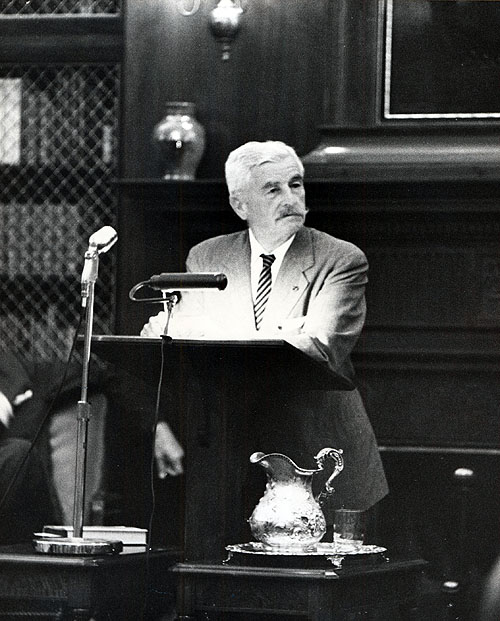
The Cavalier Daily 6 October 1956: 1
William Faulkner Accepts Invitation As First Of Writers-In-Residence At University During Second Term
Grant Makes Possible Series Endowment, Nobel Prize Winner Will Speak, Visits Classes During Stay Here
William Faulkner, Nobel prize winner in literature and one of America's major novelists and story writers, has accepted an invitation of the Department of English to become the first of what is planned as a series of writers-in-residence.
Mr. Faulkner and his wife will leave the region of northern Mississippi, celebrated in his fiction, and come to live in Charlottesville beginning in February. They expect to be near the University during the second term of the 1956-57 session.
The establishment of the writer-in-residence series is made possible under the bequest of Mrs. Emily Clark Balch who lived in Richmond and Philadelphia. The terms of her will provided that income from her bequest be used to stimulate "appreciation and creation of American literature." Part of the income has been used by the Virginia Quarterly Review to establish a series of prizes in writing.
As writer-in-residence, Mr. Faulkner will visit English classes to answer questions about his books and about writing in general. While he is continuing to carry on his own work, he has agreed to consult with faculty members and some students. He will also face the University public in several readings and informal talks.
This is the first time that the writer, whose works have been so popular with readers and critics since World War II, has made such an engagement with an [missing text]
The winner of the Nobel prize in 1929 [sic], Mr. Faulkner has spent most of his life and done most of his writing in and around Oxford, Mississippi. He served in the British Air Force in the first World War, attended the University of Mississippi, and was postmaster of the University community while he did the first of his writing for publication. His first book, "The Marble Faun," appeared in 1926 and he had earned an increasingly wide reputation by the time of the publication of "Sanctuary" in 1931.
©1956 The Cavalier Daily
The Cavalier Daily 6 October 1956: 2
Faulkner at the University
The announcement that Nobel Prize-winner William Faulkner will spend next semester as a guest lecturer at the University is the most pleasing piece of news to hit the Grounds since the legislature passed the appropriation for the nuclear reactor last spring. As any student of literature knows, Mr. Faulkner is considered by critics as the foremost literary figure in the country today (along with Hemingway) and is usually looked upon as ranking close to the top in the world as a whole.
Faulkner will not conduct any regular course, but will appear before English classes to answer questions on his work (almost every English course touching upon contemporary literature uses one of his novels or stories) and upon writing in general. In addition he will give public readings and will conduct informal talks before smaller groups.
Credit for this magnificent coup goes to Associate Professor Fredrick Gwynn of the English Department, who has been working to secure a leading writer as a visiting lecturer for the past year. Faulkner's stay will probably be the first in a series of appearances by top literary men, for the English Department will attempt to bring in more writers under a grant left for that purpose by Emily Clark Balch.
©1956 The Cavalier Daily
The Cavalier Daily 13 February 1957: 1
Faulkner Arrives To Assume Role As Writer-in-Residence
Novelist To Live Near University
William Faulkner, the Mississippi novelist who has won Nobel and Pulitzer prizes for his writings, arrived at the University yesterday afternoon ready to take up his duties as writer-in-residence through the second semester.
Mr. Faulkner and his wife will make their home until June "within walking distance of the University" in a home picked out for them by their daughter, Mrs. Paul D. Summers, Jr., wife of a Law School student.
Schedules Meetings
While he will conduct no classes as a teacher he has agreed upon a schedule for meeting with classes conducted by members of the English faculty in American literature and creative writing to discuss his own novels and short stories and some of the problems of writing.
Friday morning he will meet first a graduate class in American literature conducted by Fredrick L. Gwynn, chairman of the faculty committee on the writer-in-residence series. That afternoon he will hold a press interview.
Office in Cabell Hall
Mr. Faulkner has taken an office, Cabell Hall 505, where he will meet with individual students or Faculty members between eleven o'clock and noon each Tuesday and Thursday morning. Mr. Gwynn explains that while he will talk over with students their writing problems he will not read manuscripts and will probably shy away if asked for his autograph.
Later in the session he may give readings from his own works before small groups, but this part of his schedule has not been worked out.
With Mr. Faulkner's arrival the University of Virginia begins what is planned as an annual series made possible by a bequest of Mrs. Emily Clark Balch of Richmond and Philadelphia.
First Long Stay
This is Mr. Faulkner's first long stay at any University though he has met with groups at the University of Mississippi near his home in Oxford, and visited two Japanese Universities on a tour for the State Department.
He may be away from the University on several short trips, some for the State Department and some possibly in connection with the publication of his forthcoming novel "The Town" by Random House May first. This is a sequel to "The Hamlet" published in 1940.
He has not discussed his plans for writing while in Charlottesville.
©1957 The Cavalier Daily
The Cavalier Daily 16 February 1957: 1
Faulkner Begins Stay As Writer-In-Residence
Author Gives Press Conference; Goal Is Helping Student Writers
By Andrew Ruckman, II
Author William Faulkner yesterday initiated his stay at the University as writer-in-residence with a morning press conference, during which newsmen fired a variety of questions at the Nobel and Pulitzer prize winner.
Faulkner, wearing a collegiate tweed suit, sat quietly while a battery of photographers took numerous pictures of him and the bristling mustache and pipe that are his trademarks. He then replied to queries about his opinions on topics ranging from writing to integration and international politics.
The author described his goal during his residence at the University as a desire to help students interested in creative writing "out of my experience as a writer, and to help create an atmosphere."
Speaks Informally
Faulkner, seated at a conference table in a crowded Cabell Hall classroom, spoke informally and without notes. In addition to his literary achievements, he serves the U.S. State Department in an advisory capacity.
He answered a question about the mid-Eastern situation by stating that "What we need now is not a golf player but a good poker player" in the White House.
The writer-in-residence categorized the "greatest" American novelists according to the unique standard of "the splendor of their failures to attain the dream which all first-rate writers hold."
High On Own List
In descending order of greatness, Faulkner listed Thomas Wolfe, himself, John Dos Passos, Erskine Caldwell, and Ernest Hemingway. He described the most important considerations in literary craftsmanship as "characters, ideas, and the plot."
At least two of Faulkner's works feature one character who attended the University of Virginia, but the author stated that most of the figures in his works are not actually persons of his acquaintance, but rather composites taken from "observation and impression."
No College Education
Faulkner spoke of himself as "not a literary man." In reply to a question about the value of a college education to a prospective writer, he said "No man can write who is not first a humanitarian. If he is such, college can be of infinite importance. But I don't think that college makes a writer." Faulkner also pointed out that he himself had not gone to college
He told reporters that he has "never written the one that suits me," and said that all "first rate" authors strive for a goal that is impossible for them to realize. Faulkner added, "I'm lazy . . . writing is work, but simply will not let me rest in peace. It worries me sometimes." He did feel that writers such as Cervantes, Shakespeare, and Homer had achieved the elusive goal.
A newsman asked Faulkner if he wrote "more easily" than he did when he was younger, and the author replied that "I fumble less now, but put (working) off more. I'm convinced that I'll live to be 100."
The Mississippi-born author, famed for his penetrating portrayals of the South, spoke at length on the current integration of schools. "The schools are poor, and should be improved to the standards of the best students, no matter what color," he said.
"The negro must earn the responsibility to be equal. There is more to a right than just the gift of it. We should not bother keeping the negro out, but should raise the standards and possibly keep some of the whites out," Faulkner added.
©1957 The Cavalier Daily
The Cavalier Daily 16 February 1957: 2
Faulkner: First Impressions
The University is fortunate in welcoming William Faulkner to the Grounds as a writer-in-residence from now until June. Not only will his skill as a "craftsman" among authors be of valuable aid to many of our future writers but the very name of so prominent a man as Faulkner will doubtlessly contribute appreciably to the reputation of this University.
It was our privilege yesterday to attend an interview with Mr. Faulkner along with the reporters of several outside newspapers. Asked why he had agreed to come north to Virginia and accept this position at the University, Faulkner answered easily, "I like your country. I like Virginia and Virginians. You're snobs and I like snobs." To the question of whether he considered the novel to be replacing the epic in literature, Nobel Prize winner Faulkner answered, "That's a literary question and I'm not a literary man." It was difficult to avoid the impression that it is his "non-literary" down-to-earth characteristic which has made this author the success he is.
Possibly the most interesting topic touched upon during the interview was racial segregation in the South. Answering a Cavalier Daily reporter's question, Mr. Faulkner advocated a gradual approach to integration in the schools providing that this would improve the educational standards. He emphasized that the Negro must be taught to work for equality – not to expect it as a gift.
We hope that the University will benefit as much from the experience of having William Faulkner with us for the next three months as one would expect after his first few days on the Grounds.
©1957 The Cavalier Daily
The Cavalier Daily 8 May 1957: 1
Faulkner Holds Public, Press Conferences
William Faulkner, the Nobel and Pulitzer prize-winning novelist who has been writer-in-residence at the University through the late winter and spring, will meet the public next week and will meet the press the week after.
Townspeople of Charlottesville and residents of Albemarle County will have an opportunity to hear Mr. Faulkner read one of his short works and to ask him questions about his novels and stories next Wednesday afternoon, May 15, at 4 p.m.
The program by Mr. Faulkner will be held in Rouss Hall, upstairs in room 202. Because of the size of this room, only a limited number of tickets will be available. These may be obtained without charged by writing to the Department of English, Room 530, Cabell Hall, and enclosing a stamped, self-addressed envelope. Members of the English faculty arranging this program say no telephone requests will be filled.
The May schedule for Mr. Faulkner includes not only sessions with graduate and undergraduate English students in the College and the School of Engineering, but a recorded discussion for radio with Atcheson L. Hench of the English faculty, a Career Day talk on journalism at the Albemarle High School, and an evening meeting May 21, with the wives of law students.
Mr. Faulkner will go to New York late week after next to attend a meeting of the American Academy of Arts and Letters and present a medal to his friend John dos Passos. Mr. dos Passos, who is now living in Westmoreland County, and Mr. Faulkner are friends of long standing. They met here recently at a reception given by members of the Jefferson Society for Mr. dos Passos after he had spoken to them.
In April Mr. Faulkner interrupted his stay at the University to fly to Greece as representative of the State Department. In Athens he attended the first performance by the Greek National Theatre of his "Requiem for a Nun." He will stay at the University until he goes to New England in mid-June. While examinations will end his class sessions, he will continue his conferences with individual students on writing problems.
©1957 The Cavalier Daily
The Cavalier Daily 10 May 1957: 2
"Jim Crow" Spectator
The Spectator has made a landmark in literature at the University with publication of its "Jim Crow" issue, on the newsstands today. Articles on racial integration and segregation have been contributed by John Kasper, Sarah Patton Boyle, and William Faulkner in addition to other writers. Possibly nowhere before has so controversial a collection of articles been assembled on the segregation problem.
Five principal commentaries appear. Kasper, who is remembered for his agitation in Charlottesville last year and arrest at Clinton, Tennessee, just a few months ago, joins with a co-worker, Floyd Fleming, in presenting arguments against racial integration. Mrs. Boyle, Charlottesville resident and noted integrationist, submits one of two articles on the opposite view; the other being written by Virginia NAACP official Edwin B. Henderson. The "middle of the road" is taken by William Faulkner, who has contributed "A Letter to the North," formerly published in Life Magazine.
Although the "Jim Crow" issue by no means represents all arguments for and against integration, its contents go far toward presenting what we consider to be the two extremes on this question and a fair example of the "moderate" attitude. If two cartoons and one humor article, which we feel are in poor taste considering the subject of the magazine, are ignored, we believe that the "Jim Crow" Spectator will be a genuine contribution to the study of race relations and an asset to its readers.
Kasper, who has never before written for publication, states in a letter to Spectator editor James Plowden-Wardlaw, that he has been "waiting the first opportunity to state some of (his) views on these serious matters before us." What he has submitted materially damages his own argument because of its extremity.
Mrs. Boyle appears to ignore the rigid opposition of the Southern people to integrate the Negro and white societies in her article. She describes her beliefs as "wild idealism" from which human progress is born. Mr. Henderson, in reporting on equality of the two races, quotes Thomas Jefferson as saying, ". . . I dare you to free (The Negroes) and give them equal opportunities. They will rise as high as the white man as surely as God reigns." Fleming, through use of statistics and facts, presents an impressive case against mass school integration.
Mr. Faulkner's article comes as a relief from the varying degrees of emotionalism of the other four articles. With clarity and common sense of which few men are capable, this distinguished author warns those who hotly pursue integration, through the Federal courts, "Stop now for a moment. You have shown the Southerner what you can do and what you will do if necessary; give him a space in which to get his breath. . ."
Fortunately for the reputation of the Spectator and University, this magazine has seized upon a difficult problem and presented an intelligent study of its complications (with the possible exception of the aforementioned one article and two cartoons). There is little doubt that this issue will receive national recognition and we feel that it will be regarded as credit both to the staff which prepared it and to the University from which it came.
©1957 The Cavalier Daily
The Cavalier Daily 17 May 1957: 2
From Jefferson Hall
As a complete shock to the Jefferson Society, it was noticed by a passer-by the other day that Jefferson Hall was being renovated by the University. This is certainly a welcome and much needed gift from the University, but it does seem that the men in charge of the renovation might have discussed their plans with the organization which uses the hall every week and considered certain recommendations from the Society's officers.
As the architect for the project is out of town, no official plans are available, but the Building and Grounds Department has given us some idea of what the renovated hall will look like.
Jefferson Hall, which has been used by the Society since 1837, will be completely done over along lines which are in keeping with Jeffersonian architecture.
A new semi-circular speaker's stand with three steps leading to the rostrum will be erected at the back of the hall. In front of this a long railing will stretch across the room. The walls will be replastered and the floors refinished. A color scheme for the hall has not yet been decided on.
The tentative plans for lighting call for a chandelier in the middle of the room and indirect lighting at the cornices. No mention has been made concerning the furnishings.
According to present plans, the workmen will be finished by September.
The meeting tonight will be held in Madison Hall at which time the annual Benjamin C. Moomaw Oratorical Contest will be held. The public is invited to attend.
Also at the meeting tonight, members of the probationary class will be elected into membership, and nominations will be made for president of the Society. The elections will be held next week.
The Jefferson Society was recently privileged to have Mr. William Faulkner address the membership. The program was no different in form from Mr. Faulkner's characteristic meetings with the public: a brief reading from one of his works, followed by a question-and-answer period. The atmosphere, however, was very far from the strained and formal air that has marked most of Mr. Faulkner's public appearances here. Perhaps the size of the crowd had something to do with it – there were about thirty-five members present – or perhaps Mr. Faulkner was just in a particularly fine fettle. In any case, the members were treated to an excellent presentation of Faulkner the man. As one member of the audience remarked after the meeting, "I realized that Faulkner was a human being!"
Mr. Faulkner read an episode from his recent novel, The Town. This was followed by an introductory remark that set the tone for the meeting: "Well, I guess there ain't nobody here that don't want to be here." This was said in his familiar Mississippi accent, punctuated with a puff on his equally familiar pipe. The Society responded to his informal tone with questions on a conversational level and received in reply colorful anecdotes from his career, not entirely reprintable here. The most serious aspects of the writer were also brought out. Mr. Faulkner made the interesting observation that the work is more important than the author and should be considered apart.
Mr. Faulkner was presented with a copy of the "Writer in Residence" issue of the Spectator, which he had not yet seen. When asked if he recognized the caricature on the cover, he answered, "Yes." No further comment was available. He then shook hands with several members of his enthusiastic audience and left, escorted by his ever-vigilant protectors from the English department.
©1957 The Cavalier Daily
The Cavalier Daily 22 May 1957: 1
Faulkner Makes Public Interviews
William Faulkner, who now divides his loyalty between Mississippi and the University, appeared in public again Tuesday. The prizewining author read portions of a novel, "Old Man," before a first-year English class and a large delegation of newspaper reporters and magazine writers.
He showed the University influence by wearing a grey coat, striped shirt and khaki trousers to the conference as he answered a barrage of intellectual questions about his writing and then stayed in 202 Rouss Hall, which he called the "black hole," a second hour to answer reporters' inquiries on a great variety of subjects.
He praised the Virginia Players' recent production of "Paterson" during the conference, and commented on the fact that Spectator editor Plowden-Wardlaw played in a calypso band but also published a magazine which "staked" the serious issues of integration and segregation against one another.
Faulkner told the Cavalier Daily in a closing remark that recent speculation that the University English Department had hampered his activities in Charlottesville was untrue.
"Mr. Gwynn and Mr. Blotner (of the English Department)," the author said,". . . I have them trained to fetch and carry." Faulkner leaves the University in mid-June.
©1957 The Cavalier Daily
The Cavalier Daily 25 October 1957: 1
Writer-In-Residence Faulkner To Return Next Spring
February Arrival Set For Author
William Faulkner, winner of the Nobel and Pulitzer prizes in literature, will return to the University as writer in residence during the 1958 spring semester.
The Mississippi-born novelist and short-story writer inaugurated the University's writer-in-residence program last spring. He met with many English classes and student groups and took part in question-and-answer sessions with students, faculty members, and the general public.
Fredrick L. Gwynn, chairman of the English department's writer in residence committee, said Faulkner's program next year will resemble last spring's work, with some possible changes which have not been worked out.
Faulkner will hold some discussion sessions, Gwynn said, but changes will be made in his program to bring him in closer touch with students who are interested in creative writing.
Public readings, similar to the three held for townspeople last spring, will also be arranged, Gwynn said.
Changes in the format of these public readings may be necessary, Gwynn added, because Faulkner had pointed out the great similarity of the three sessions and the repetition of the questions asked.
Faulkner was happy with his reception at these meetings, Gwynn explained, but he does not wish to "become boring." Confronted with many of the same questions in each of the meetings, he was forced to repeat the same answers.
During his stay here from February through June of next year, Faulkner will serve on a part-time basis and may be absent from the University for short periods as he was last spring when he flew to Greece for two weeks in behalf of the U.S. State Department.
Last spring, he received many invitations to make public appearances elsewhere in Virginia and outside the state. He declined all of these, but did appear at Mary Washington College in Fredricksburg and held one discussion session here for English majors from other Virginia colleges.
©1957 The Cavalier Daily
The Cavalier Daily 18 December 1957: 1
Faulkner Will Return In February
By Sheafe Satterthwaite
William Faulkner, Nobel and Pulitzer prize-winner for literature, will resume about February 1 his post as writer-in-residence, the English department announced yesterday.
The writer-in-residence committee has scheduled no activities different from those the world-famous Southern novelist met last year.
Faulkner's duties will include meeting with English classes that are studying his works and holding office hours for consultation with students, faculty members, townspeople, and others.
Although his appointment continues until June, he may at times be absent from the University, just as he was for two weeks earlier this year when he made a flying trip to Greece as representative of the Department of State to attend the first performance in Athens of the dramatic sections of his "Requiem to a Nun." [sic]
Funds from a bequest of Mrs. Emily Clark Balch for the teaching and appreciation of English literature help defray the costs of the writer-in-residence program, which began with Faulkner's appointment last year.
Part of the Balch fund is used by the Virginia Quarterly Review for a series of annual prizes in writing.
Frederick L. Gwynn is chairman of the English faculty's writer-in-residence committee. Other members are Joseph L. Blotner, Fredson Bowers, and Floyd Stovall, chairman of the department.
While he was at the University last spring, Faulkner received many invitations to make public appearances elsewhere in Virginia and outside the state but he declined all of these requests. He did appear at the University's Mary Washington College in Fredericksburg and held one discussion session here for English majors from other Virginia colleges.
©1957 The Cavalier Daily
The Cavalier Daily 4 February 1958: 1, 4
Mississippi Writer Here Until June; Second Visit
William Faulkner, the University's first and only Writer-In-Residence, has returned to Charlottesville for his second half-year on the job.
The world-famous author spent most of last year's second semester at the University, when he delighted students, faculty and Charlottesville townspeople with his candid comments on writing, world affairs, integration, college life and a variety of other topics at a series of public appearances.
Faulkner arrived here January 29 by automobile from his home in Oxford, Miss. His wife accompanied him.
His residence here is sponsored by the Emily Clark Balch Fund. In addition to the widely-publicized public appearances, the author advises students and faculty who are interested in writing.
The author was unavailable for interview at his Charlottesville home last night, but scheduled first office hours for today.
J. L. Blotner, a spokesman for the University English Department, said that Faulkner would receive students and faculty at his 505 Cabell Hall office on Mondays, Wednesdays and Fridays between 10:30 and noon.
The author will keep the same office hours on Tuesdays and Thursdays, but appointments are necessary for those days.
Blotner said that inquiries about public engagements for Faulkner should be addressed to the Balch Committee, 530 Cabell Hall. He added that they should be in writing.
Appointments to see the author may be made through Mrs. Adele Hall, secretary to the English Department.
Faulkner met a total of 23 times last Spring with University graduate and undergraduate students, organizations, clubs and the press.
English Department spokesmen indicated that the author will keep about the same schedule between now and his planned departure in June that he maintained last year.
"We don't see how it could be more extensive," they said.
Several of Faulkner's works include characters who attended the University of Virginia, although the author himself is not a college graduate.
Although he describes himself as "not a literary man," Faulkner received both the Nobel and Pulitzer prizes for writing.
©1958 The Cavalier Daily
The Cavalier Daily 19 February 1958: 1
William Faulkner To Talk On Segregation Problem
William Faulkner will address the Jefferson Society, Raven Society, and the ODK honorary leadership fraternity Thursday night at 8:30 in Peabody Hall Auditorium. In one of his rare prepared speeches, Faulkner will speak to the societies on segregation in a talk entitled "A Word For Virginians." The speech will be followed by a question period.
Jefferson Society spokesman, Cortez Randell, said that only members of the Jefferson Society, Raven Society and ODK will be permitted to hear Faulkner's speech. Admittance will be by invitation only.
In a twenty minute speech, William Faulkner will state his views on the segregation question and his opinion on what Virginians should do about this problem.
The speech has been copyrighted by the University of Virginia Magazine, and although reporters will be allowed to listen to the speech, the text will not be allowed to be printed until after it has been published in the magazine.
Faulkner returned to the University for the second time to continue as Writer-In-Residence, sponsored by the Emily Clark Balch Fund. He arrived at Charlottesville January 29 from his home in Oxford, Mississippi.
In addition to the widely publicized public appearances, the author advises students and faculty who are interested in writing. Faulkner has an office in room 505 of Cabell Hall and receives students and faculty members Mondays, Wednesdays and Fridays between 10:30 a.m. and noon.
©1958 The Cavalier Daily
The Cavalier Daily 25 February 1958: 2
Mr. Faulkner On Segregation
To all who heard William Faulkner speak last Thursday night on the subject of segregation, it was readily apparent that our writer-in-residence is no orator. Mr. Faulkner was able to stretch his speech out to only fifteen minutes, which was disappointing to us, for his speech was widely publicized and his audience was composed of the most distinguished citizenry of the University community. And Faulkner read his speech, an unforgivable sin in oratorical circles.
BUT THE evening was not totally disappointing. Regardless of his speaking ability, the novelist did offer what we believe to be the only working solution to the biggest social problem in the South in the text of his speech and during the questioning period. Faulkner's main premise for his proposals can be summed up in one word, "education." And we have been stressing the value of that premise for the last three weeks.
Faulkner's proposals were based on his observations of Negroes from Mississippi to Virginia. Considering his insight into human nature as evidenced in his novels, and his acquaintance with Negroes and their problems (we have heard that he sits on a nail keg down by the liquor store on Vinegar Hill observing and taking notes) we feel that his proposals have much merit and are worthy of review.
In his speech, Faulkner offered the view that the Negro wants the right to decide for himself whether to mix. And this cannot be done without education. The Negro, Faulkner pointed out, believes the white schools are fundamentally better than Negro schools, and that is his reason for wanting integration.
And he also pointed out that economic equality should be the goal to be strived for, rather than social equality. The author believed that once the Negro did obtain economic equality, which can only be accomplished through education, then he would have the right to decide for himself whether to mix, and probably would defend segregation when he could decide for himself.
As for integrating schools, Faulkner indicated that Negro students should be given the right to choose between white and Negro schools, and that qualified Negroes should be allowed to go to white schools. Such qualification would be based on entrance examinations. And he also observed that no one, not even white people, should be forced to go to school, and that laws requiring education should be abolished. The writer reserved a half century for any such educational program or educational equality to establish itself.
WE FEEL that Faulkner's proposal offers the compromise between the dogmatism of the North and the South on the subject. And we could remind the North again that the problem is fundamentally our own, and that helpful advice will do more to alleviate the situation rather than biased and unsound criticism.
Mr. Faulkner's speech, entitled "A Message to Virginians" was directed toward the prominence which Virginia has held and still holds in the South as a leader. His idea was that it was up to the "Old Dominion" state to take up the banner of education for the Negro and assume its position of leadership in solving this century old problem.
Two points which Mr. Faulkner only briefly touched were the educational problems of white people in the South and the failure of Virginia in the immediate past to assume its rightful position of leadership of the Southern states. We intend to discuss, in subsequent editorials, these two subjects.
©1958 The Cavalier Daily
The Cavalier Daily 14 March 1958: 1
Film of Faulkner Book Opens New York Run
An article appearing in a recent edition of the New York Times announced the opening of a film entitled "Long Hot Summer."
The film is based on "The Hamlet" by William Faulkner, the University's writer-in-residence.
The Jerry Wald production is directed by Martin Ritt and stars Anthony Franciosa, Paul Newman, Joanne Woodward, and Orson Welles.
©1958 The Cavalier Daily
The Cavalier Daily 15 March 1958: 1, 4
Faulkner To Appear On Television In Filmed Class Discussion Sunday
Shows Teaching Techniques
How author William Faulkner conducts a class at the University will be shown on television tomorrow afternoon, between 4:00 and 4:30 o'clock over WRVA-TV, the channel 12 station in Richmond.
The Nobel prize winner for literature will be shown with students from an advanced class in composition in a filmed program made at the University for showing at the end of National Library Week.
Faulkner was filmed and recorded first reading from one of his short stories, then in a question and answer discussion with students in a Cabell Hall classroom. While he has been writer-in-residence at the University Faulkner has had many offers to appear on commercial television or radio programs but has turned all of them down. Because of the University's participation in National Library Week he agreed to appear in this one filmed sequence.
The sequences showing Mr. Faulkner make up about half of the thirty minute program. The narrator of the film is Mrs. Benjamin J. Alsop, Jr., of Richmond and in the other parts of the program she takes the television audience into the Alderman Library to see some of the activities going on there.
Richard D. Bullock, assistant in the McGregor Room, shows some of the rare books and manuscripts there, including the poems for "Leaves of Grass" which Walt Whitman wrote on the back of old tax forms and other scraps of paper and a first edition of "Tamerlane," the first book of verse by Edgar Allen [sic] Poe, some of which may have been written at the University while he was a student.
Miss Helena Coiner, library circulation assistant, tells about student interest in Mr. Faulkner's writings, Mrs. Phyllis Goldman shows the inter-library closed circuit television in operation, and William H. Wranek, director of the University News Service, tells of some of Mr. Faulkner's experiences in Charlottesville.
Mr. Faulkner is now on a trip to his Oxford, Miss., home.
©1958 The Cavalier Daily
The Cavalier Daily 29 March 1958: 1
English Depart. Announces Faulkner Schedule
The English Department has announced the classroom schedule of writer-in-residence, William Faulkner, for the remainder of the semester.
The schedule is as follows: Thurs., 1 May, 10:00 a.m. in 337 Cabell Hall for Eng. 28, (McAleer), Subject – "Portable Faulkner"; Fri., 2 May, 4:00 p.m. in 202 Rouss Hall for Eng. 22, 28 (Blotner) and Eng 124, Subject – "The Sound and the Fury" and "As I Lay Dying".
Tues., 6 May in Radio Cabell Hall for Eng. 32: Language (Stephenson), Subject – Language and Dialect; Thurs., 8 May, 4:00 p.m. in 202 Rouss Hall for Eng. 3-4: Sophomore English (Murrah) and Eng. 124, Subject "The Bear" and "Absalom, Absalom!"
Mon., 12 May, 4:00 p.m. in 202 Rouss Hall for Virginia Colleges, Subject – Writing; Thurs., 15 May, 3:30 p.m. in Lee Chapel for Washington and Lee University, Subject – Writing.
Mon., 19 May, 4:00 p.m. in 202 Rouss Hall for Eng. 2 (Weston), Subject – "As I Lay Dying"; Fri., 23 May 4:00 p.m. in 202 Rouss for University and City public (Eng. Dept. Secretary), Subject – Writing.
Classes are open to all members of the University, with permission of the instructor.
©1958 The Cavalier Daily
The Cavalier Daily 21 May 1958: 1
Faulkner Arranges Final Appearance Before Public Friday In Rouss Hall
Tickets Available
William Faulkner, the Nobel prize winner for literature, will make his last appearance as writer-in-residence when he meets the public in a farewell reading and discussion section in Rouss Hall at 4 Friday afternoon, May 23.
Mr. Faulkner has spent the major part of two winter and spring semesters at the University. He has kept regular morning office hours in his Cabell Hall office, room 505, and has met with many classes in English not as a lecturer, but to answer questions about his own novels and short stories and the problems of writing in general.
Friday's audience will be limited to the first 200 who apply for tickets to the office of the English Department in Cabell Hall, either in person or by letter.
Mr. Faulkner has made only two appearances away from Charlottesville during the two springs he has been here. Last week he met with English students and faculty members at Washington and Lee University. Last year he visited Fredericksburg to talk with students of the Mary Washington College. He has also had two discussion periods for students majoring in English at other Virginia colleges.
Horseback riding has been one of Mr. Faulkner's greatest pleasures. He has covered many of the back roads and trails of Albemarle county and has taken most of the jumps. Walking has been another of his pleasures and he stated in his acceptance of the invitation to become the University's first writer-in-residence that he and Mrs. Faulkner have a home within walking distance of the University. This year he has been living on Minor Road, not far from the St. Anne's School.
©1958 The Cavalier Daily
The Charlottesville Daily Progress 31 January 1955: 7
Mrs. Darden Will Receive Callers Tomorrow Afternoon at 'Carr's Hill'
Mrs. Chalmers Gemmill and Mrs. William Pitts will pour tomorrow afternoon between 4 o'clock and 6 o'clock while Mrs. Colgate Darden Jr. receives guests at "Carr's Hill." Mrs. Jason Eckford and Miss Mary Mann Nash will assist Mrs. Gemmill and Mrs. Pitts.
Mrs. Darden will be at home tomorrow and every Tuesday afternoon during the winter months to receive townspeople and University students and faculty.
William Faulkner, of Oxford, Miss., and New York City, was the weekend guest of his son-in-law and daughter, Mr. and Mrs. Paul D. Summers, of University Circle.
Miss Catherine Howard, daughter of Mr. and Mrs. G. W. Howard of Center Avenue, will be one of the Madison College Glee Club to attend the National Federation of Music Clubs meeting in Miami in April.
Miss Nadine Smith, of Lexington Avenue, left Saturday to spend this week with her parents at Richlands.
Miss Anne Anderson and Miss Catherine Dick, of Morristown,Tenn., students at Mary Washington College, spent the weekend with Miss Anderson's parents.
Mrs. John Yoe of Wayside Place, left yesterday to spend about a week with her son-in-law and daughter, Dr. and Mrs. Charles Schneider, of Radford.
©1955 The Daily Progress
The Charlottesville Daily Progress 15 February 1957: 1
Faulkner Talks To Reporters About Integration, Virginians
William Faulkner, Mississippi-born winner of both the Nobel and Pulitzer prizes in literature, told reporters in Charlottesville this morning that he feels racial integration of schools in the South is inevitable.
"As I see it," Faulkner declared, "the white man had better take charge of it (integration) and control it, rather than have it thrust on him."
Faulkner said he thought the Negro "will have to" achieve equal status in the South, because "the only alternative to progress is death."
"The two races will never live forever separate except by choice. The law can't force it." But he added that he felt it would be folly to "just give" equal rights to the Negro. "He has got to be taught that he must earn the responsibility and right to be an equal."
"I like Virginia"
Faulkner, who arrived in Charlottesville Tuesday, will spend most of the current school semester here working with students at the University of Virginia as the first writer-in-residence under a new University Program. He met with reporters this morning after a session with his first class, a graduate class in American literature.
Faulkner told reporters he had accepted the English department's invitation to come to the University "because I like your country, I like Virginia and Virginians." The publicity shy writer added, "Virginians are all snobs, and I like snobs, they don't bother you."
Asked what his first reaction to teaching was, Faulkner said, "I'm terrified at first because I'm afraid it (class discussion) won't move." He said his first concern was that everybody might be waisting their time sitting there, "but once it begins to move it's all right."
Contribution
Any contribution he might hope to make to prospective writers here, Faulkner said, "would come out of my experience as a craftsman in contact with the desire of young people to be craftsmen." Out of 100 students there may be one who would get some value out of his being here, he said, and that if there was one, he thought that would be good.
Questioned on his reaction to the opinion that his picture of the South is "utterly revolting," he said his picture may be revolting, but it was not intended to be revolting to anyone. "I am simply using the tools I have to show the fundamental truth of the human heart – man in his eternal conflict in himself – which is the only thing in my opinion worth writing about." He said he was writing about people and not Mississippi or other places.
©1957 The Daily Progress
The Charlottesville Daily Progress 16 February 1957: 1
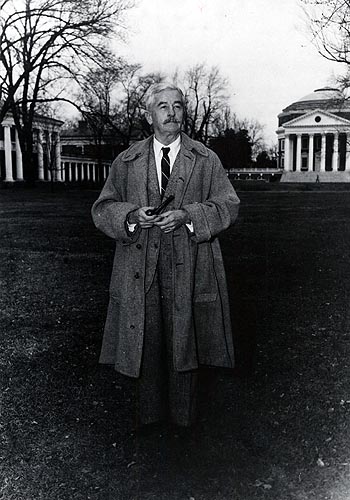
WRITER ON CAMPUS — William Faulkner strolls on the lawn at the University of Virginia shortly after meeting with reporters in Cabell Hall. The 59-year-old Oxford, Miss., winner of Nobel and Pulitzer prizes will spend the semester at the University working with students under a new writer-in-residence program. Faulkner conducted his first class yesterday just before the press conference. — Ralph Thompson photo.
©1957 The Daily Progress
The Charlottesville Daily Progress 16 March 1957
Faulkner Flying To Greece To See 'Requiem For A Nun'
William Faulkner is leaving the University of Virginia today on a flying trip to Greece to attend the first performance by the Greek National Theatre of his "Requiem for a Nun." The U. S. State Department has arranged for him to accept the invitation of the Greek Government to be its guest for two weeks.
Early in April Faulkner expects to be back at the University, meeting classes in discussion groups about his own novels and stories and about problems of creative writing. He will continue to be the University's first writer-in-residence until June.
Has Made Similar Trips
When Faulkner left Charlottesville early today he was expecting to be met in Washington by Harold Howland and James Nelson of the State Department's International Education Exchange Service, which is arranging his trip. He has already made visits to several foreign lands for the State Department, including Japan.
The government of Greece on behalf of the Greek National Theatre extended an invitation to Faulkner through the United States ambassador, George Allen, who will welcome him when he arrives in Athens.
Demetri Myat, director general of the Greek National Theatre, will be host when "Requiem for a Nun" is staged in the Athens Theatre. He is also expected to be an honored guest at several universities in Greece before he flies back at the end of March.
Novels, Stories Popular
Nelson reports Faulkner's novels and stories are very popular in many foreign lands and that today "he surpasses any other American literary figure." He said also that makes a great impression wherever he goes.
"Requiem for a Nun" is the second part of the story of Temple Drake who Faulkner introduced in his most widely read novel, "Sanctuary." In one of his question periods at the University he explained that he set down much of it in dramatic form because he wrote it this way because it seemed best for what he had to say.
It has been produced in France, Germany, Switzerland and the Scandinavian countries. A French touring company played before enthusiastic audiences in Swiss cities. No American production has been staged. Faulkner explained he has given acting rights in this country to a friend of his family from Mississippi.
Faulkner left saying he was looking forward to his return to the University of Virginia early in April. He admits that he was "terrified" when he met his first class but that he has come to like the give and take with students. He has not been teaching a course or holding seminar sessions, but has been meeting classes in American literature and in writing and answering questions about his own works and about the problems of literary creation.
©1957 The Daily Progress
The Charlottesville Daily Progress 8 May 1957
Faulkner Plans Reading Of His Work Before Public
William Faulkner, the Nobel and Pulitzer prize-winning novelist who has been writer-in-residence at the University of Virginia through the late winter and spring, will meet the public next week and will meet the press the week after.
Townspeople of Charlottesville and residents of Albemarle County will have an opportunity to hear Faulkner read one of his short works and to ask him questions about his novels and stories next Wednesday, May 15, at 4 p.m.
This program will be held in Rouss Hall, upstairs in Room 202. Because of the size of this room, only a limited number of tickets will be available. These may be obtained without charge by writing to the Department of English, Room 530 Cabell Hall, and enclosing a stamped, self-addressed envelope. Members of the English faculty who are arranging this program say no telephone requests will be filled.
Press Session
Faulkner held a first press interview session after he met his first class in February. His second session for the press has been set for May 20 at 4 p.m. in Rouss Hall. Representatives of the press will have a chance to attend what will probably be his last class session, before they conduct their interview.
The May schedule arranged for Faulkner includes not only sessions with graduate and undergraduate English students in the College and School of Engineering, but a recorded discussion for radio with Atcheson L. Hench of the English faculty, a career day talk on journalism at the Albemarle High School (today) and an evening meeting May 21, with the wives of law students.
Medal For Dos Passos
Faulkner will go to New York late week after next to attend a meeting of the American Academy of Arts and Letters and present a medal to John dos Passos. For the first time in 30 years, they met here recently at a reception given by members of the Jefferson Society for Dos Passos after he had spoken to them.
In April Faulkner interrupted his stay at the University of Virginia to fly to Greece as representative of the State Department. In Athens he attended the first performance by the Greek National Theatre of his "Requiem For a Nun."
He will stay at the University until he goes to New England in mid-June. While examinations will end his class sessions, he will continue his conferences with individual students on writing problems.
©1957 The Daily Progress
The Charlottesville Daily Progress 8 May 1957
Hard, Fast Rule For Writers: Truthfulness, William Faulkner Tells High School Students
Novelist William Faulkner told prospective journalists and writers at Albemarle High School this morning that the one "hard and fast rule" every writer must follow is truthfulness.
"I will never put on paper and release something that I do not believe is true," the Nobel Prize winner in literature said.
Faulkner spoke to two groups of about 60 to 80 students each at the high school's annual Careers Day program. The program brought representatives of about 30 fields to speak to the students.
Asked what the most important things to a journalist are, Faulkner said "Take it you have the grounding in grammar, what you need is the practice in people."
He said students should train themselves into "insight into people, to know why people do what they do," and "To catch people in action at the interesting point."
"People are capable of infinite change. That's what makes anyone want to be a journalist or writer, to write about people, because of the infinite variety," Faulkner said.
"Don't ever get over being curious, wanting to know what you didn't know yesterday," the novelist warned his audience. He listed things important for a writer as "never to judge people, to listen, to watch, to probe, wonder what is the truth behind this action . . . patience, compassion." He later added "one quality a writer has got to have is a demon. He's got to be demon-driven."
Worked in New Orleans
Faulkner said he had done newspaper work in New Orleans in his earlier writing days, but never with the intention of taking up journalism as a profession.
Asked how he got into newspaper work, Faulkner said "I like to write, and I lived in the French quarter there, and I would see strange things. . .and I began to write those pieces, and I sent them to the editor."
Other Commentary
Other Faulkner commentary:
On his education: "I didn't like school and I quit in the sixth grade. School in those days moved too slow for me . . . and I would have liked to have gone to a good college."
On style: "Any writer who has a lot to say, hasn't got time to bother with style."
On his own long sentence structure: It "comes from the constant sense that one has that he only has a short time before he is going to die."
On his own opinion of his best novel: "The Sound and the Fury" caused him "the most anguish and trouble" and was "the most beautiful failure."
On life: "It's best always to have something a little beyond our reach to work for; then you can always be happy."
©1957 The Daily Progress
The Charlottesville Daily Progress 11 May 1957
Faulkner Declares Virginia Should Cherish Leadership
Novelist William Faulkner conducted his last class at the University of Virginia yesterday afternoon, then told newsmen why he wishes Virginia would take more leadership in the South.
The rest of the South has a "respectful, almost abject reverence" for the State of Virginia and the University of Virginia, the Mississippi author said. "When Virginia makes a mistake that should have been made by Mississippi or Alabama we're a little ashamed."
Invitations To Negroes
He mentioned as an example "the unhappy business" of last Friday night's State Chamber of Commerce banquet for distinguished Virginians and the furor that arose when it was discovered six Negroes had been invited through error.
"That's the sort of thing you'd expect Mississippi to do, but not Virginia . . . Virginia to the rest of the South must be like Caesar's wife (above reproach)."
The Nobel and Pulitzer prize winner met with reporters after conducting his last class here as the first writer-in-residence under a new University program. The class, in freshman English, heard him read part of his story, "The Old Man," and they asked questions about the work and writing in general.
Left For New York
Faulkner left today for New York where he will present a medal to author John Dos Passos Wednesday as Dos Passos is taken into the American Academy of Arts and Letters.
He will return here and remain until the middle of June. He is scheduled to give a public reading of one of his works May 30.
Faulkner told reporters he has found students today "more intellectually curious, more daring, but they have more pressure to conform, which I think they don't always realize at the time."
He said he thinks a young person always resists the pressure "to belong to a group that wants to do his thinking for him," but today it is harder to resist this temptation because pleasures are easier to find and life is not as hard.
Faulkner described a play written by Charles Coffey, a fourth-year education student at the University, as "very hopeful." On the performance, which he saw last week, he added, "It was very well done to have been done by amateurs."
Later, asked if he had found any promising young writers here, he said, "Any promising young writer to me is one that's hard at work at it."
Counterpoint
Faulkner explained that "The Old Man," said to be one of his best works, was originally intended as musical counterpoint to a lesser-acclaimed story, "The Wild Palms" – "the orchestration of sounds that the musician puts back of his theme."
"I was as surprised as anyone else when I found where the story was going," he said.
Faulkner, who says he is more interested in people than ideas, remarked of his novel "The Fable," which won a 1954 Pulitzer prize, "It was the only book I ever wrote that came from an intellectual ideal, pure and simple."
©1957 The Daily Progress
The Charlottesville Daily Progress 25 May 1957
Yoknapatawpha And Albemarle
William Faulkner has held his last class as the first writer-in-residence at the University of Virginia under the terms of the bequest made to the university by the late Emily Clark Balch. In his salutatory Mr. Faulkner said something about the snobbery of Virginians (which he professed to like) and in his valedictory he was concerned about a certain inversion of leadership, which he didn't like.
Mr. Faulkner wished Virginia would assume more leadership in the South because of "the respectful, almost abject, reverence" the South has for the state and its university. The "unhappy business" of the invitations sent out to the Virginia State Chamber of Commerce's dinner and the bumbling contretemps that followed was the sort of "mistake that should have been in Alabama or Mississippi." Mr. Faulkner is a "little ashamed" when the mistake was made in Virginia.
Mr. Faulkner knows how to dip his pen in satire, of course, for that is what his long chronicle of the life histories of the Snopeses has been. His characters have always been a satire on decadence and hollowness and pretense in whatever guise dressed. A satirist sometimes overdraws his picture. It can be doubted that the South holds Virginia in the "abject reverence" Mr. Faulkner pretends to think it does. Yet a satirist can make his readers decidedly uncomfortable at times, especially when they suspect he is dealing with basically true facts.
Virginia's position in the South derives in large part from two basic facts. One is that it is a border state between the North and South. It is, and has been, historically, a buffer state for ideas flowing between the North and South. More important is the fact that Virginia is the oldest state and the one in which arose those early leaders of democratic thought who were to express so punctually for their time, and for all time, the ideas which underlie democratic government in this nation.
The "unhappy business" of the Virginia State Chamber of Commerce dinner was a by-product of the times. Mr. Faulkner's commentary implies Virginia is not leading but following. It is not leading Mississippi and Alabama, but following them. It has been going in a direction that would be more typical of the attitudes and postures of Yoknapatawpha County, Miss., than, say, of Albemarle County, Va. — The Virginian-Pilot, Norfolk.
©1957 The Daily Progress
The Charlottesville Daily Progress 30 May 1957
Faulkner Invited To Return To UVa
William Faulkner, University of Virginia's first writer in residence, may return for a second semester next fall.
Frederick L. Gwynn, director of the English Department's writer in residence program, said this morning that Faulkner had been invited back to Virginia next year and had shown signs of acceptance, but no final decision will be made until Faulkner returns to his home in Mississippi this summer.
Before accepting the position at the university this year, Faulkner had been a frequent visitor to Charlottesville. His daughter, Jill, is the wife of a third-year law student, Paul Summers.
The readings and lectures given by Faulkner this year have allowed the townspeople and students to know him as a man as well as a great writer.
One More Reading
This afternoon's conference by William Faulkner with his reading public will not be his last here this year.
The demand for tickets for today's conference so far outstripped the 175-seat capacity of Room 202 in Rouss Hall that a third public conference has been scheduled for June 5. Those who were unable to get tickets for today's 4 p.m. conference have already been sent substitute tickets for the June 5 meeting.
Frederick L. Gwynn, associate professor of English who is in charge of the writer-in-residence program, said Faulkner was quite willing to hold the third conference to take care of the unfilled requests for the second one.
Prefers Small Groups
"He could have taken care of the whole thing," Gwynn said, "with one big conference in Cabell Hall. But he'd rather have three small ones than one big one."
The classroom in Rouss Hall is regarded as better suited for Faulkner's small voice.
The June 5 conference will be held at 5 p.m. to take care of persons who cannot get off from work earlier, Gwynn said.
©1957 The Daily Progress
The Charlottesville Daily Progress 31 May 1957
Faulkner Reads From Novel, Describes Probable Sequel
William Faulkner read a passage from his new novel, "The Town," to an audience of Charlottesville and Albemarle residents whose demand had resulted in yesterday's second public meeting at Rouss Hall at the University of Virginia.
Questioned about the recently-announced sequel to his latest novel, Faulkner said he felt pressure to write the story, but not from his publisher.
"One More Book"
He said he had too many words to tell the story in one volume, but "I assume one more book will do it, though I don't have any great hopes it will." He said he felt pressure from the characters to write before he informed his publisher of it.
He said that the sequel will concern the daughter of the heroine of his present novel. The daughter, he told the audience, "is one of the most interesting people I've written about yet."
The Pulitzer Prize winning novelist said he attempts to make his characters living beings, and that they take over the story from there: "Sometimes they even surprise me." Stating he only had to walk behind them with a notebook, Faulkner said "if I can keep up and write fast enough, I won't miss anything."
Likes to Feel Pencil
"I have never learned to think good onto the typewriter," Faulkner said, explaining that he likes to feel the pencil in his hand and look at the words. He reported that he writes so fast "that somebody said it looks like a caterpillar that crawled through an ink well onto a piece of paper."
He still hasn't told the story of "The Sound and the Fury," the book which he has rated as his "most glorious failure." He said the novel began as a short story, with the idiot telling it. Realizing it was not enough, he allowed a brother to tell it, then another brother, but it was still not enough. "So then I decided to let Faulkner tell it."
Through his writing, he said, he is seeking to create something perfect which has not exited before – "That is the best life."
Not Literary Friends
"The friends I have are not literary friends," he said of his friends in Mississippi. He said they thought highly of him if he did well in the pursuits they followed, but thought poorly of him if he was not accomplished in their particular pursuits. "They don't know about my books, because they don't read them."
He said there are three subjects to write about: love, money and death. He explained that these are the skeletons on which the novelist hangs his story.
"There never was a writer that wasn't convinced he can create people better than God can." He said he can still laugh at the things his characters are doing, and that their action is continuous. "Some editor has to give the whole thing unity, coherence and emphasis."
©1957 The Daily Progress
The Charlottesville Daily Progress 24 October 1957: 1
Faulkner to Return to UVa
William Faulkner, winner of the Nobel and Pulitzer prizes in literature, will return to the University of Virginia as writer in residence during the 1958 spring semester.
The Mississippi-born novelist and short-story writer inaugurated the University's writer-in-residence program last spring. He met with many English classes and student groups and took part in question-and-answer sessions with students, faculty members, and the general public.
Frederick L. Gwynn, chairman of the English department's writer-in-residence committee, said Faulkner's program next year will resemble last spring's work, with some possible changes which have not been worked out.
Faulkner will hold some discussion sessions, Gwynn said, but changes will be made in his program to bring him in closer touch with students who are interested in creative writing.
Public readings similar to the three held for townspeople last spring, will also be arranged, Gwynn said.
Changes in the format of these public readings may be necessary, Gwynn added, because Faulkner had pointed out the great similarity of the three sessions and the repetition of the questions asked.
Faulkner was happy with his reception at these meetings, Gwynn explained, but he does not wish to "become boring." Confronted with many of the same questions in each of the meetings, he was forced to repeat the same answers.
During his stay here from February through June of next year, Faulkner will serve on a part-time basis and may be absent from the University for short periods as he was last spring when he flew to Greece for two weeks in behalf of the U.S. State Department.
Last spring, he received many invitations to make public appearances elsewhere in Virginia and outside the state. He declined all of these, but did appear at Mary Washington College in Fredericksburg and held one discussion here for English majors from other Virginia colleges.
©1957 The Daily Progress
The Charlottesville Daily Progress 14 February 1958
Faulkner is Back Again For Second Term at UVa
William Faulkner has returned to Charlottesville and the University of Virginia and will resume his work with students tomorrow.
The Mississippi-born winner of the Nobel Prize in literature is here for his second spring-semester stay under the University's writer-in-residence program which he inaugurated a year ago.
He and his wife have moved into the house at 2110 Minor Road, within walking distance of the University.
Faulkner will hold office hours at the University daily where he will meet with students, faculty members and occasional visiting writers.
Frederick L. Gwynn, associate professor of English and chairman of the Balsh [sic] committee which is sponsoring [the] writer-in-residence project, said several sessions with advanced English classes will be arranged for Faulkner during February.
But no meetings with the public have been planned until March.
The novelist and short-story writer will not make talks at meetings and groups will be limited in size, Gwynn said. He is expected to follow the same procedure as last year, beginning each session by reading a short story or passage from one of his longer works, then answering questions from the group.
During Faulkner's stay here last spring, one session with the public was planned, but demand for tickets was so great that three public meetings were held, each of which Faulkner called a "farewell appearance."
Gwynn said that because Faulkner has agreed to return to the University primarily to work with students, only one meeting away from Charlottesville has been arranged.
©1958 The Daily Progress
The Charlottesville Daily Progress 20 February 1958
Faulkner To Discuss Segregation
Will Read Article Giving His Views
William Faulkner, Mississippi-born winner of the Nobel Prize in literature, will give his views on segregation in a prepared address before members of three student societies at the University of Virginia tonight.
The novelist and short-story writer will address a meeting of the Raven Society, Omicron Delta Kappa honorary society, and Jefferson Society at 8:30 p.m. in Peabody Hall. The meeting is limited to members of the societies and their guests.
He will read a copyrighted article entitled "A Word for Virginians," giving his views on the segregation issue. The article will be published later in the University of Virginia Magazine. The prepared address will be an unusual procedure for Faulkner.
Faulkner has been meeting with classes and holding office conferences with students and faculty since his arrival here earlier this month to spend his second semester as writer-in-residence under a new University program.
No meetings similar to those held last spring with the public have been planned yet.
At a press conference on his first arrival here a year ago, Faulkner told reporters that he thought racial integration of schools in the South is inevitable. But he said he felt it would be folly to "just give" the Negro equal rights. "He has got to be taught that he must earn the responsibility and right to be equal," he said.
©1958 The Daily Progress
The Charlottesville Daily Progress 21 May 1958
Faulkner Plans Final Talk Friday
William Faulkner will make his last appearance as the University of Virginia's writer-in-residence at a public reading and discussion session at the University Friday.
It will be his first and only public meeting here this semester.
The audience is to be limited to the first 200 persons who apply for tickets at the English department office in Cabell Hall, either in person or in writing. The meeting will be at 4 p.m. in Rouse [sic] Hall.
The Nobel Prize winner for literature has spent most of this semester and the second semester of last year here meeting with students, faculty and English classes as writer-in-residence.
During his time here he made two appearances at other Virginia colleges – one at Washington and Lee University last week, and one at Mary Washington College a year ago.
He was away from Charlottesville for a few weeks this semester to make an appearance at Princeton University in New Jersey and to spend some time in Mississippi, his home.
Faulkner has been living here this semester on Minor Road near St. Anne's School. Much of his spare time has been spent horseback riding over back roads in Albemarle County and taking walks.
©1958 The Daily Progress
The Charlottesville Daily Progress 24 May 1958
Faulkner Would Like to Live Final Years in Albemarle
By Ted McKown
William Faulkner made his last appearance yesterday as the University of Virginia's writer-in-residence – then indicated he would like to settle here permanently.
"If I do it will take a certain amount of doing," he told a reporter. First he would have to sell his farm near Oxford, Miss., he said.
"It's so far in the future it couldn't be called a plan. It's more like a hope. Mrs. Faulkner and I both like it here. It wouldn't be a bad place to spend the next 60 years."
Earlier the soft-voiced 60-year-old Nobel Prize winner told an audience in Rouss Hall:
"I could use this last hour to try and say thank you to the people of Charlottesville and Albemarle County for making my stay here happy. But I won't.
"Every individual is the sum total of his past. I leave something here – where Faulkner was happy – and I'll take with me something of Albemarle County. I will come back from time to time to so those two separates can be joined again."
Faulkner said his favorite pastimes are horses, dogs, hunting and riding. Most of his time here was spent riding from Grover Vandevender's stables, he said.
Asked if he still holds to a statement made a year ago that he likes Virginians because they are snobs, Faulkner said, "that was sort of thrown off in a moment of relaxation. I do mean it. But it means a certain kind of snobbery.
"They (Virginians) know they're all right, and when they accept me it means I'm all right too. They don't meddle in other people's affairs. To me, that's an admirable quality."
Faulkner read a passage from his novel, "The Sound and the Fury," then answered questions from the audience about books, writing, critics, movies and a college education.
Mostly he talked about a favorite theme – that man will endure and prevail. An admiration for man is his incentive to write, "apart from it being fun," Faulkner said.
"You live in a world and you see man – frail, fragile, made out of flesh and bone, mostly water – thrown into a world stuck together with electricity. The problems he faces are usually bigger than he is, but amazingly enough, he copes with them, not as an individual but as a race."
To the artist "this is so amazing, you might say so beautiful, that he wants to put it down on paper or canvas or in music. . . . Writing is the most satisfying occupation man has discovered yet. You never reach satiation."
Faulkner said he is convinced that the last activity on earth will be "two men building an air ship to go somewhere else and arguing about where they will go."
Later he told reporters, "Amend that picture to three men – two of them building the air ship and one there writing about it."
Would Faulkner still write if he were the last man on earth?
"The writer writes for satisfaction. . . . He would write if nobody read it, even if he had to pay for the privilege, or if it were burned. . . .
"He really is not interested in communicating; he is trying to make something that was not here yesterday. He's not doing it for profit, not for money. When he passes through the wall of oblivion he will still write, even if it's just to stop and write 'Kilroy was here' on the wall."
Is Faulkner's basic conception of life optimistic?
"Yes."
But not for the individual?
"The individual is not too important. He's only a pinch of dust. His species, his dreams – they go on."
What about God?
"I can't say. The writer ain't interested in that either. He's interested in man in motion, that man is, not how he got here."
Who are Faulkner's favorite Bible characters?
"Most of them. They were all scoundrels and blackguards, doing the best they could just like people now."
©1958 The Daily Progress
The Charlottesville Daily Progress 13 November 1958
Faulkner Plans to Spend Winter Here
William Faulkner, who in his last public appearance at the University of Virginia last May indicated he would like to settle here permanently, will live in Charlottesville this winter.
Paul D. Summers Jr., son-in-law of the Nobel prize-winning author, said Mr. and Mrs. Faulkner plan to stay here "at least until spring."
Faulkner will leave for Princeton, N.J., early next week where he will conduct a seminar for senior students at Princeton University. He will return to Charlottesville Dec. 1.
Faulkner was writer-in-residence at the University for two semesters. At his last public appearance, he told an audience in Rouss Hall:
"Every individual is the sum total of his past. I leave something here – where Faulkner was happy – and I'll take with me something of Albemarle County. I will come back from time to time so those two separates can be joined again."
©1958 The Daily Progress
The Charlottesville Daily Progress 15 January 1959
Mr. Faulkner In the Library
William Faulkner, who last year was the University of Virginia's first writer in residence, now is to become a consultant on contemporary literature to the university library under an arrangement quite as unique.
A study in the library, complete with desk and typewriter, will be provided him. From it he will have access to everything in the library. But nobody, as Librarian John Cook Wyllie explained, will have access to him.
As library consultant, Mr. Faulkner will be free to write, study, ponder, or simply frit away his time. He may come and go as he chooses.
This is, as the most struggling of the fellows might be forgiven for musing, a good deal. Mr. Faulkner, like Thomas Jefferson's ghost, will be something in which those who love the university (or believe they do) will be able to take pride without having to explain why. One need not see Mr. Faulkner. One need not even read his books. A realization that he is back there in the stacks somewhere, breathing regularly, will be enough to cause one to glow with quiet pride.
Well, we applaud this sort of thing. It is the first evidence we have seen in a long time of creative art taking precedence over brawn in a campus affair. Mr. Faulkner will never become as important to the national establishment of higher learning as, say, Big Jim Tatum or Everett Case. Nevertheless, the football and basketball gentlemen have reason to envy him.
For they must produce, and Mr. Faulkner need not. Ah, that is the thing. They must produce or be bums. — The Virginian-Pilot, Norfolk.
©1959 The Daily Progress
The Charlottesville Daily Progress 16 March 1959
William Faulkner To Leave in April
William Faulkner said Saturday that he plans to return to Mississippi next month to live.
"But I will be returning to Charlottesville periodically," he said, "because of my connections with the University and the many friends I have here."
The Nobel and Pulitzer prize winning novelist, who has been residing here on and off for the last two years, talked briefly with reporters at the Farmington Hunt Club's hunter trials held Saturday afternoon at Oak Hill, the estate of John F. O'Hagan on Garth Road.
"I like Albemarle County and I like Virginians," he said. "Virginians are fast people and if you want to keep up with them you have to get on a horse to do it."
But Faulkner almost missed catching up with "them" Saturday morning after he fell from his horse during a jump. He received a broken collar bone.
Wearing his riding breeches and a black derby hat the Mississippian quipped: "A fractured collar bone is no worse than a hangnail." He was wearing a cast and a was visibly uncomfortable.
He said he had participated in about half of the fox hunts held by the hunt club this winter.
"I don't intend to miss the last hunt of the season on Tuesday," he said.
©1959 The Daily Progress
Below: 24 September 1931 letter from William Faulkner to Prof. James Southall Wilson, accepting his invitation to attend the Southern Writers Conference at Virginia. Faulkner Papers, UVA Special Collections [Digitization #000003743_0035].
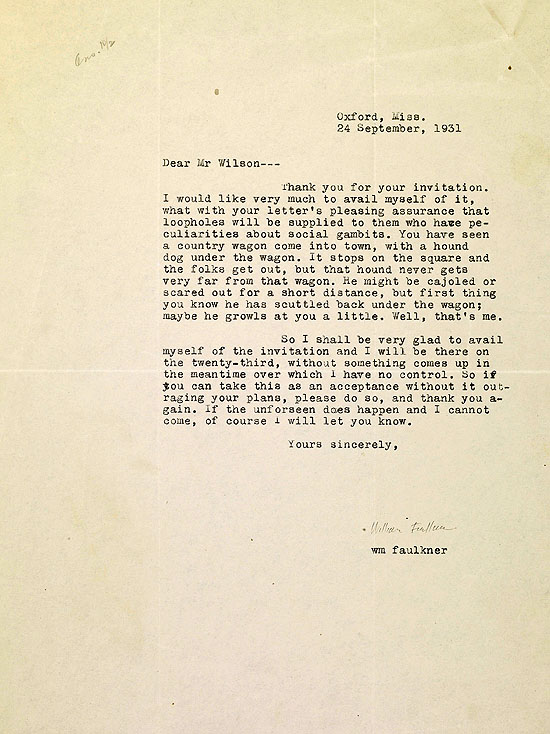
Below: Undated (but before 1970), unsigned notes about William Faulkner's behavior at the 1931 Southern Writers Conference at Virginia. "J. S. Wilson" is James Southall Wilson, the UVA English Professor who chaired the conference. Faulkner Papers, UVA Special Collections [Digitization #000003743_0053].
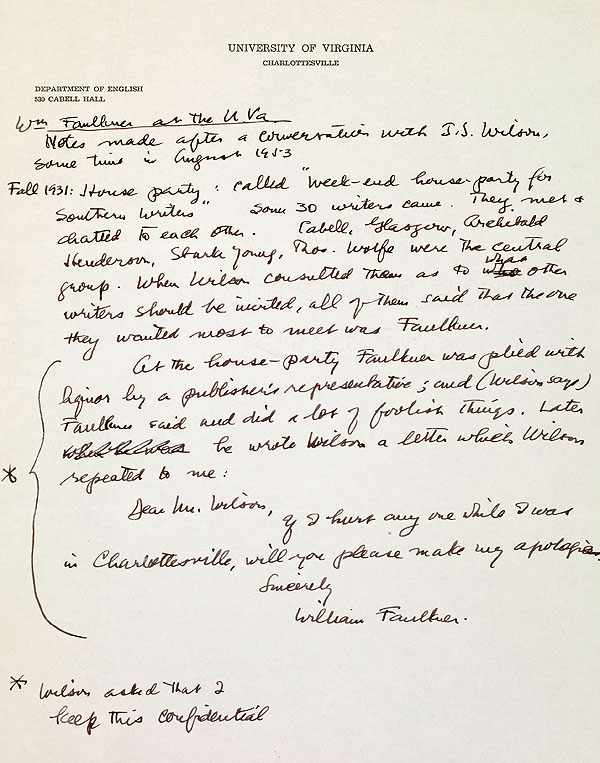
Below: 18 October 1956 letter from William Faulkner to Floyd Stovall, Chair, Department of English, UVA, ratifying his appointment as Writer-in-Residence for Spring, 1957, term. Faulkner Papers, UVA Special Collections [Digitization #000003743_0041].
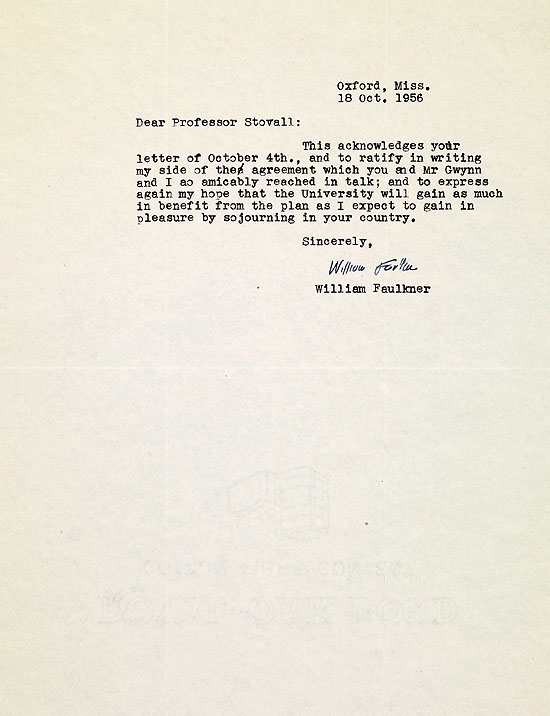
Below: Front and back of 25 February 1957 letter from Annie Churchill Berkeley to William Faulkner, asking him "why" he called all Virginians "snobs" at his 15 February meeting with the press. (This is one of Faulkner's UVA sessions that either was not recorded or for which the tape has disappeared, so you can't hear him say that in this archive, but Gwynn and Blotner's Faulkner in the University, page 12, prints his comments.) Faulkner Papers, UVA Special Collections [Digitization #000003743_0043 and #000003743_0044].
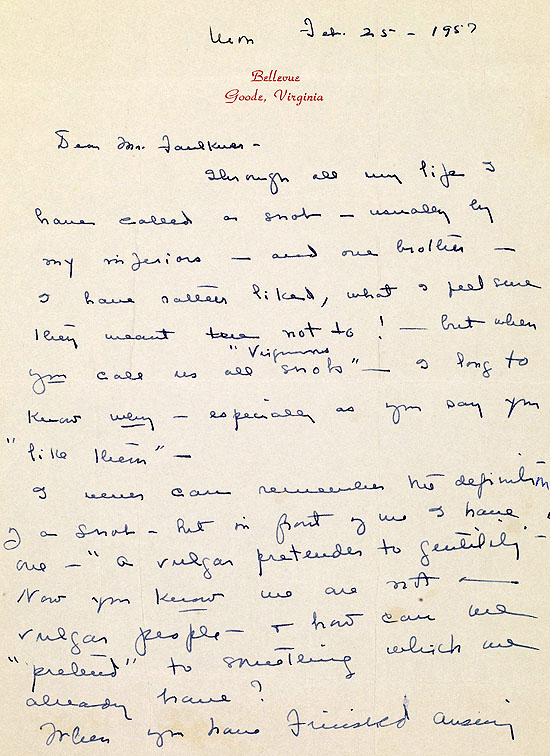
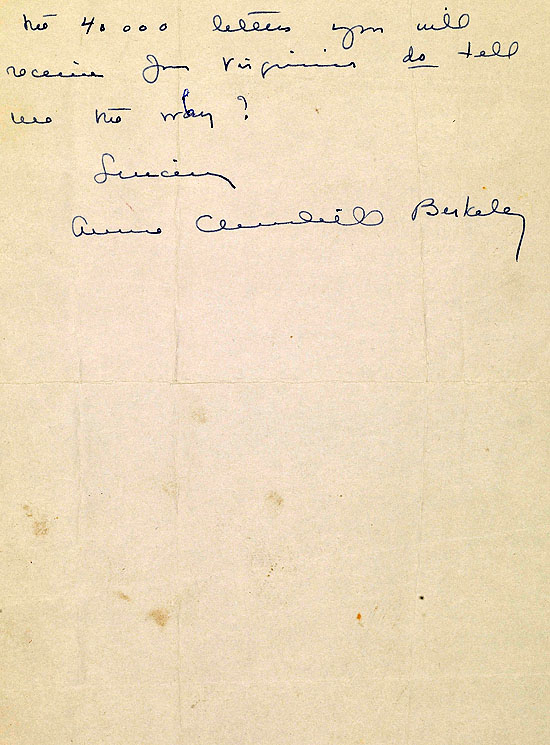
Below: 27 February 1957 letter from William Faulkner to Annie Churchill Berkeley, apologizing for and explaining his remark about Virginians as "snobs." Faulkner Papers, UVA Special Collections [Digitization #000003743_0045].
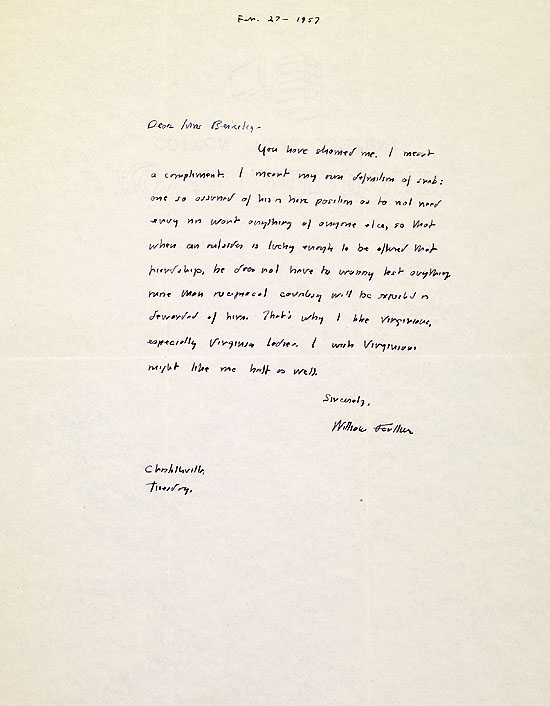
Transcription: Feb. 27 – 1957 / Dear Mrs. Berkeley – / You have shamed me. I meant / a compliment. I meant my own definition of snob: / one so assured of his or her position as to not need / envy nor want anything of anyone else, so that / when an outsider is lucky enough to be offered that / friendship, he does not have to worry lest anything / more than reciprocal courtesy will be expected or / demanded of him. That's why I like Virginians, / especially Virginia ladies. I wish Virginians / might like me half as well. / Sincerely, William Faulkner / Charlottesville. Tuesday.
Below: Undated (c. March 1957) letter from Annie Churchill Berkeley to William Faulkner, concluding their correspondence about Virginians as "snobs." Faulkner Papers, UVA Special Collections [Digitization #000003743_0047].
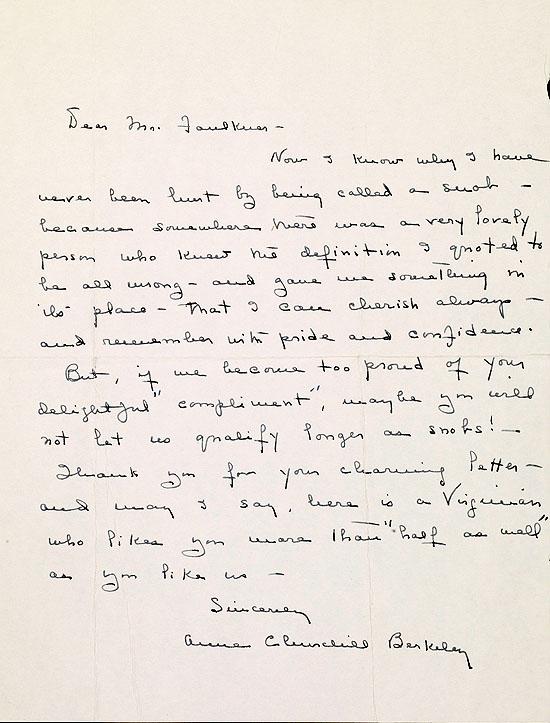
Below: Letter from William Faulkner to Harold Howland, c. 9 May 1957 (per envelope), about an idea for a literary prize he might offer to "best manuscript to be smuggled out of the iron curtain countries." Faulkner Papers, UVA Special Collections [Digitization #000003743_0031].
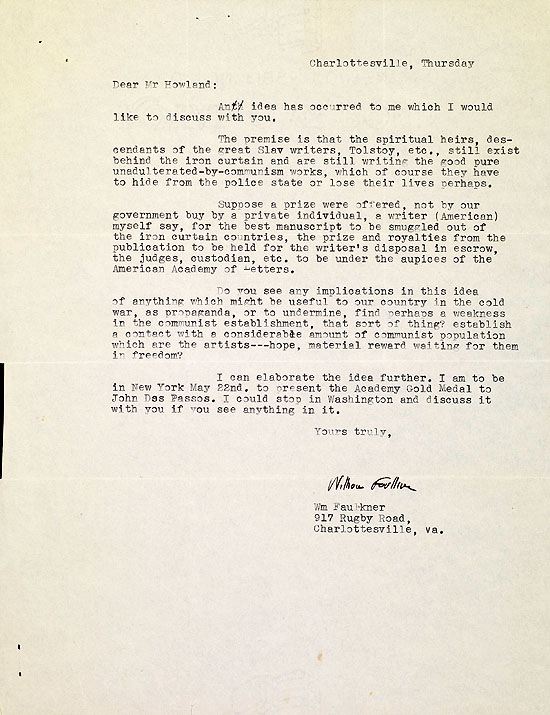
Below: 1 December 1957 letter from William Faulkner to Prof. A. B. Shepperson, replying to his invitation to address the University of Virginia Club in Washington, D.C. Faulkner Papers, UVA Special Collections [Digitization #000003743_0063].

Transcription: Sunday 1st. Dear Mr. Shepperson – / Thank you for your letter of 23rd Nov. / My first thought was to the effect that I thought I was just / the writer-in-residence, not the speaker-in-residence; not to / mention the fact that you probably know me by now to be / a quiet, practically inarticulate bloke. / But on second thought I begin to think that / perhaps it is my duty as writer-in-residence to accept the invi- / tation and to try to say something worth while – not a / mere moral duty incumbent on me as a hired factotum of / the University, but a 'gentleman's' duty, since I look on / my position as that of a gentleman accepted by gentlemen, / to have (for the time anyway) a certain intellectual po- / sition in the alma mater of the best of native Va. / gentle-bred men. / So I accept, but on condition that I may / say exactly what I want to say. Some of you may not / like it. I will put some notes on paper and send them / on to you, for a previous glance, you – the alumnae – / of course to have the right to cancel the speech / and the invitation if they do not please you. My feelings / wont be hurt. / I will try to send a draft in by say / New Year's or 13th Jan. at the latest. Is this / all right? / Sincerely, William Faulkner
Below: 8 January 1958 letter from John E. Bomar to William Faulkner, withdrawing the invitation to address the University of Virginia Club of Washington, D.C. Faulkner Papers, UVA Special Collections [Digitization #000003743_0065].

Below: 6 May 1958 letter from William Faulkner to John Cook Wylie, UVA Librarian, accepting an honorary appointment as a consultant to the Library on contemporary literature, along with the envelope Faulkner sent it in, showing his habit of readdressing stamped envelopes he had received from others. Faulkner Papers, UVA Special Collections [Digitization #000003743_0017 and #000003743_0019].
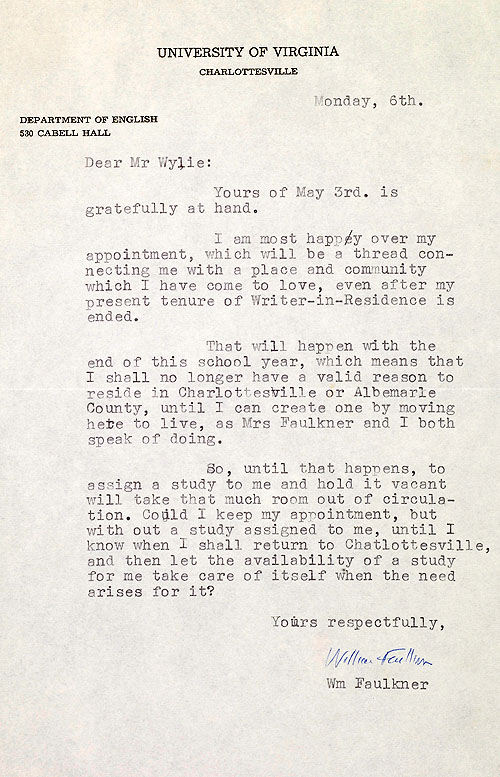
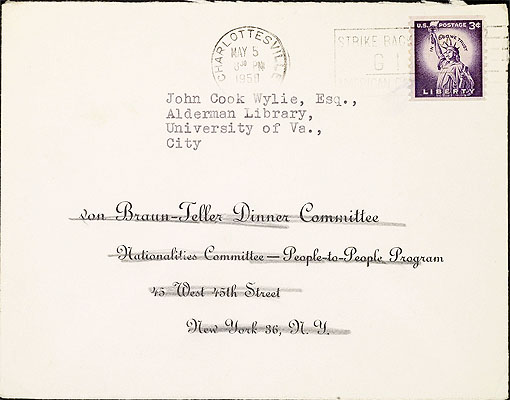
Below: 25 March 1958 letter from William Faulkner to Edward McAleer, accepting an honorary membership in UVA's Colonnade Club. Faulkner Papers, UVA Special Collections [Digitization #000003743_0037].
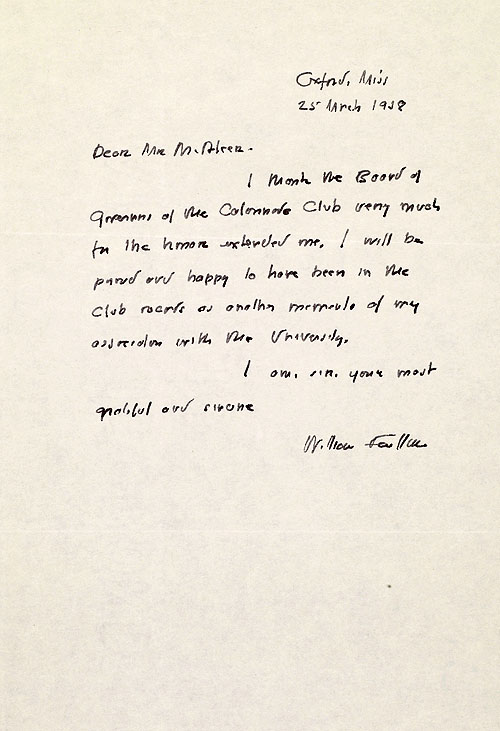
Transcription: Oxford, Miss / 25 March 1958 / Dear Mr. McAleer – / I thank the Board of / Governors of the Colonnade Club very much / for the honor extended me. I will be / proud and happy to have been in the / Club records as another memento of my / association with the University. / I am, sir, your most / grateful and sincere / William Faulkner.
Below: 10 September 1958 from William Faulkner to John Cook Wylie, UVA Librarian, accepting the Library's offer of a study in Alderman Library for him to work in. Faulkner Papers, UVA Special Collections [Digitization #000003743_0021].
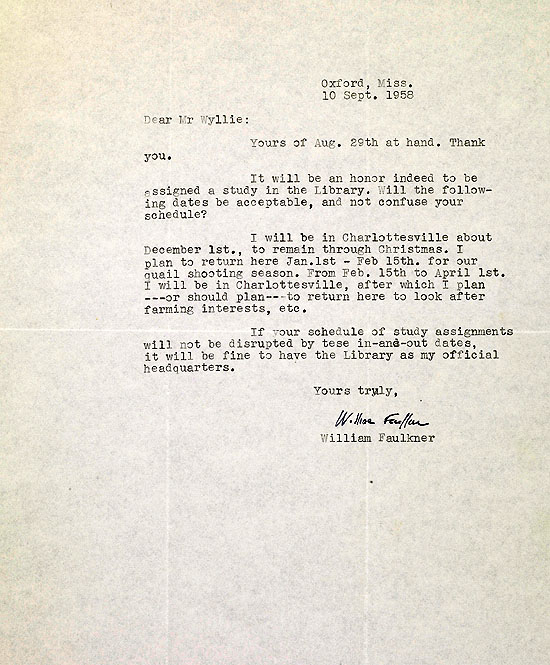
Below: 12 May 1959 letter from Clarice Snead to William Faulkner, with Faulkner's handwritten response to her question about whether he will need a study in the Library again during the next year. Faulkner Papers, UVA Special Collections [Digitization #000003743_0027].
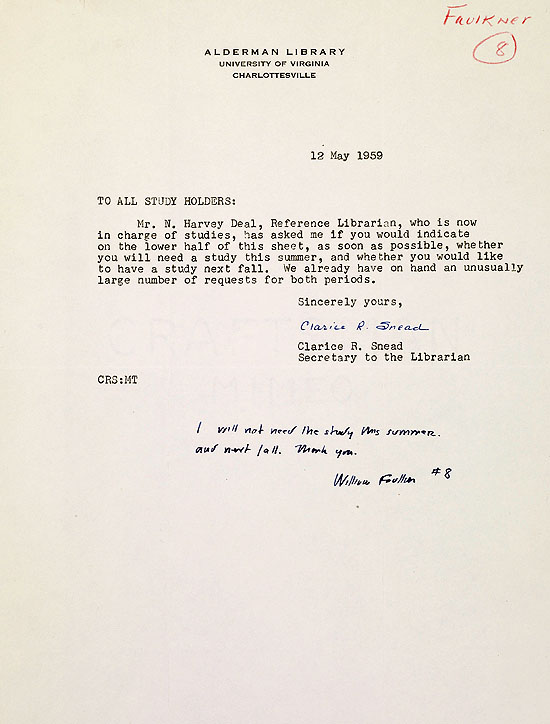
Below: "Chief's Sched," Joseph Blotner's chart of William Faulkner's speaking engagements during his February-March 1960 return to UVA. These sessions were not recorded. Faulkner Papers, UVA Special Collections [Digitization #000003743_0089].
